Tom's Hardware Verdict
The new Corsair RM750x (2021) achieves top performance, isn't noisy, and is equipped with a top-notch ML fan.
Pros
- +
+ Full power at 47 degrees Celsius
- +
+ High overall performance
- +
+ Silent at low and mid loads
- +
+ Fully compliant with ATX v2.52
- +
+ Highly efficient at light loads
- +
+ Long hold-up time
- +
+ Low inrush current
- +
+ Magnetic Levitation fan
- +
+ Two EPS and four PCIe connectors
- +
+ Fully modular
- +
+ 10-year warranty
Cons
- -
High OCP triggering points on the minor rails
- -
A small overall efficiency boost would be nice
- -
The fan speed profile could be even more relaxed
- -
In cable capacitors
- -
Small distance between peripheral connectors
Why you can trust Tom's Hardware
It wasn't easy to deliver a better product than the existing RM750x (2018), but Corsair managed to do this, and the new model achieves notably better performance. Compared to the previous model, it loses in quietness, but you cannot call it noisy with 28 dBA overall noise output. All in all, this is an excellent power supply, so that it will replace the older RM750x in our Best PSU Picks article. Notable competitors are the XPG Core Reactor 750W and the Seasonic Focus GX-750.
Corsair decided to make some notable changes in its RMx line, among the most popular ones in today's market. This was not an easy task since the existing RMx units only counted three years in production and delivered excellent performance and silent operation simultaneously. When you try to upgrade something that is already very good, you face many challenges since you also have to keep the budget under control.
The new Corsair RMx (2021) line consists of five models with capacities ranging from 550W to 1000W, and the main differences with the previous models are depicted below.
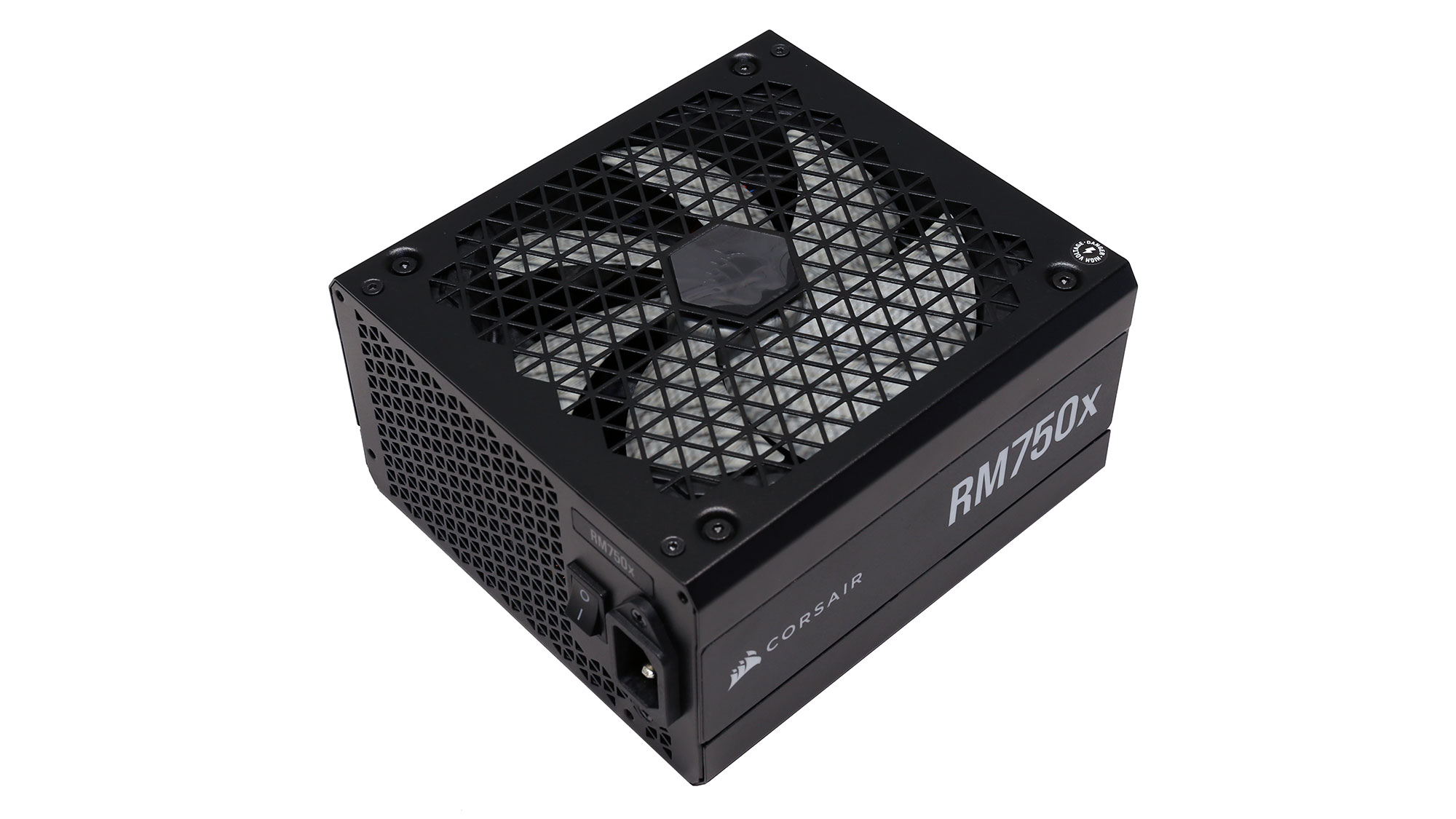
Product Photos
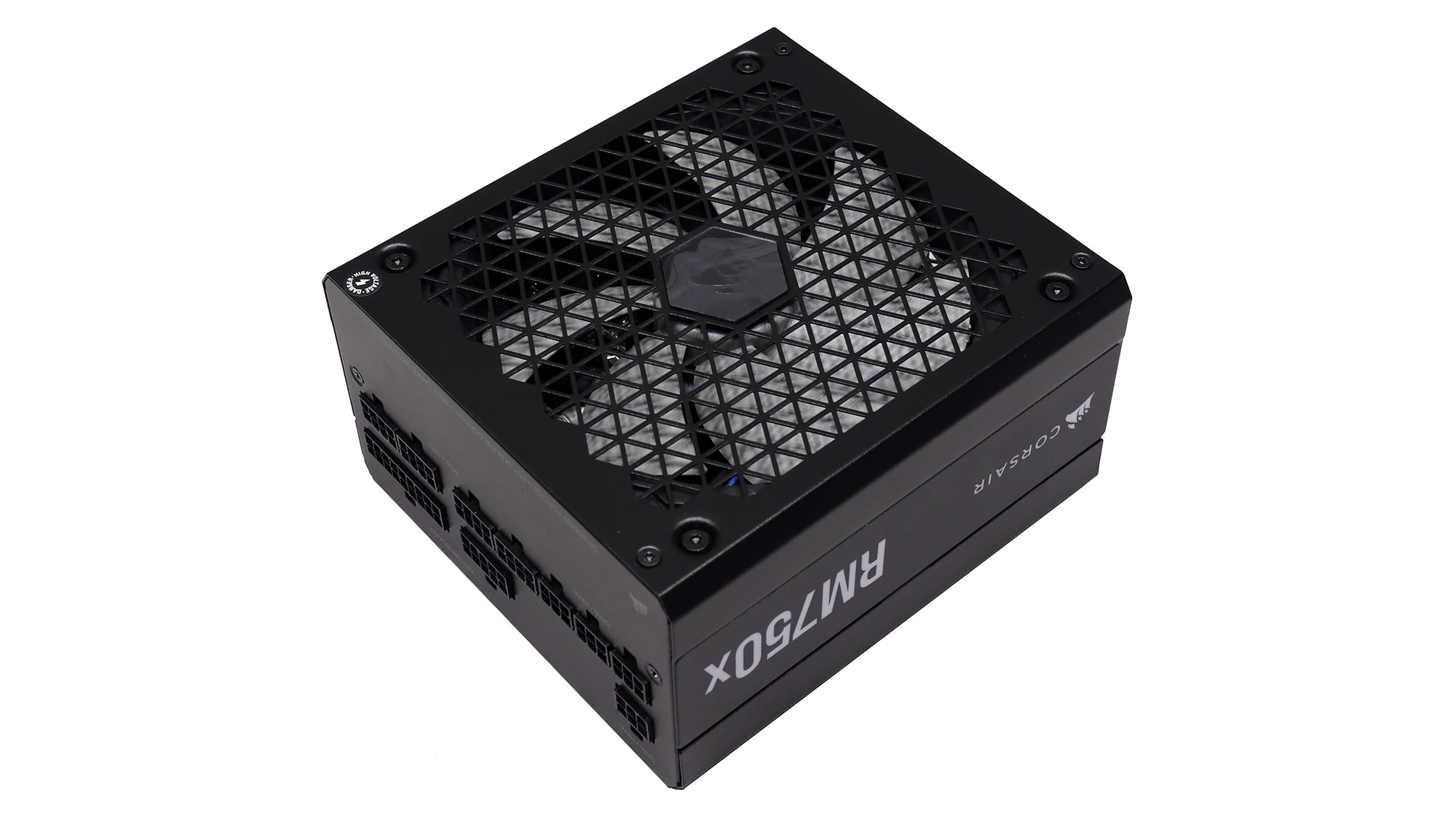
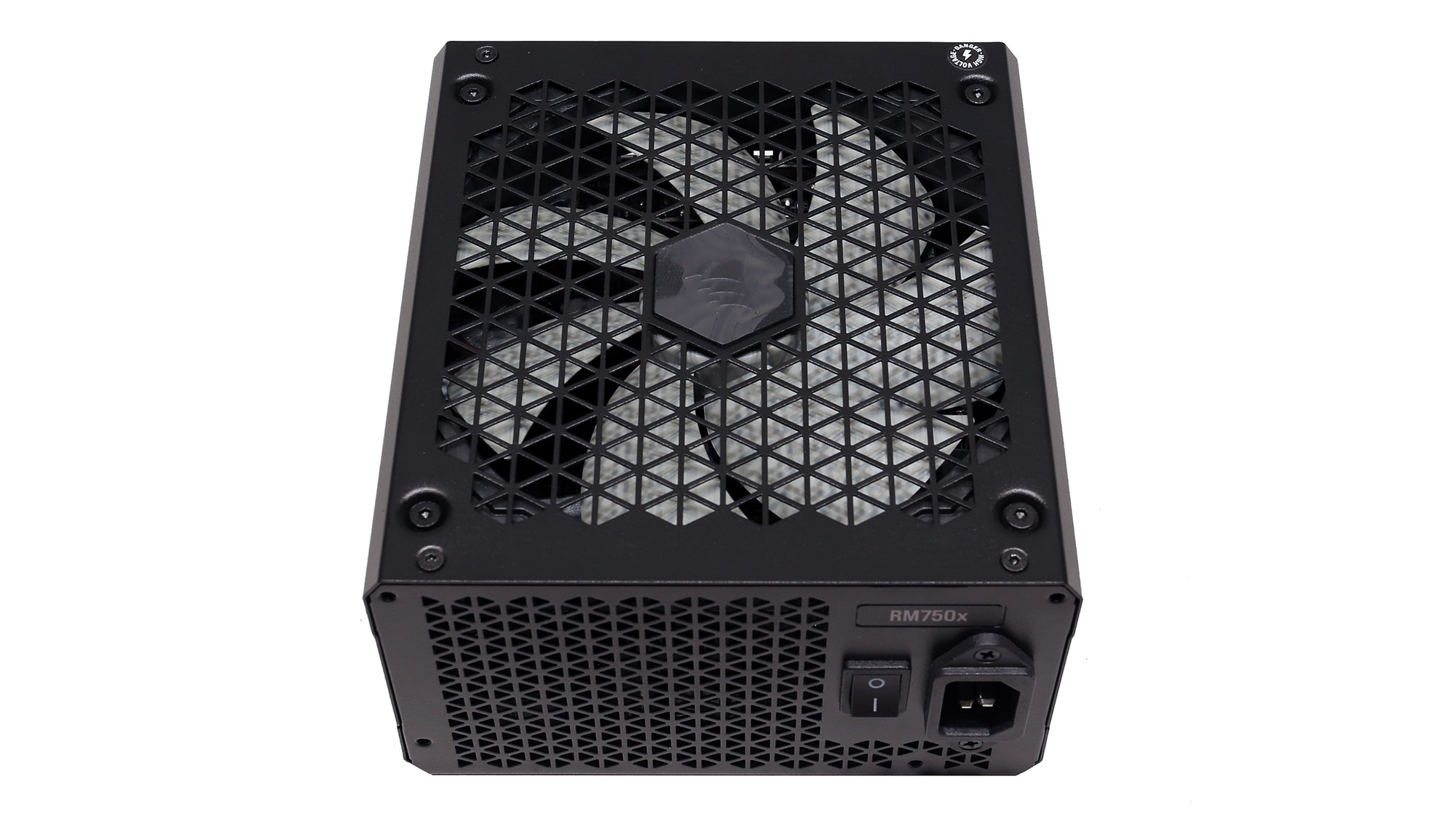
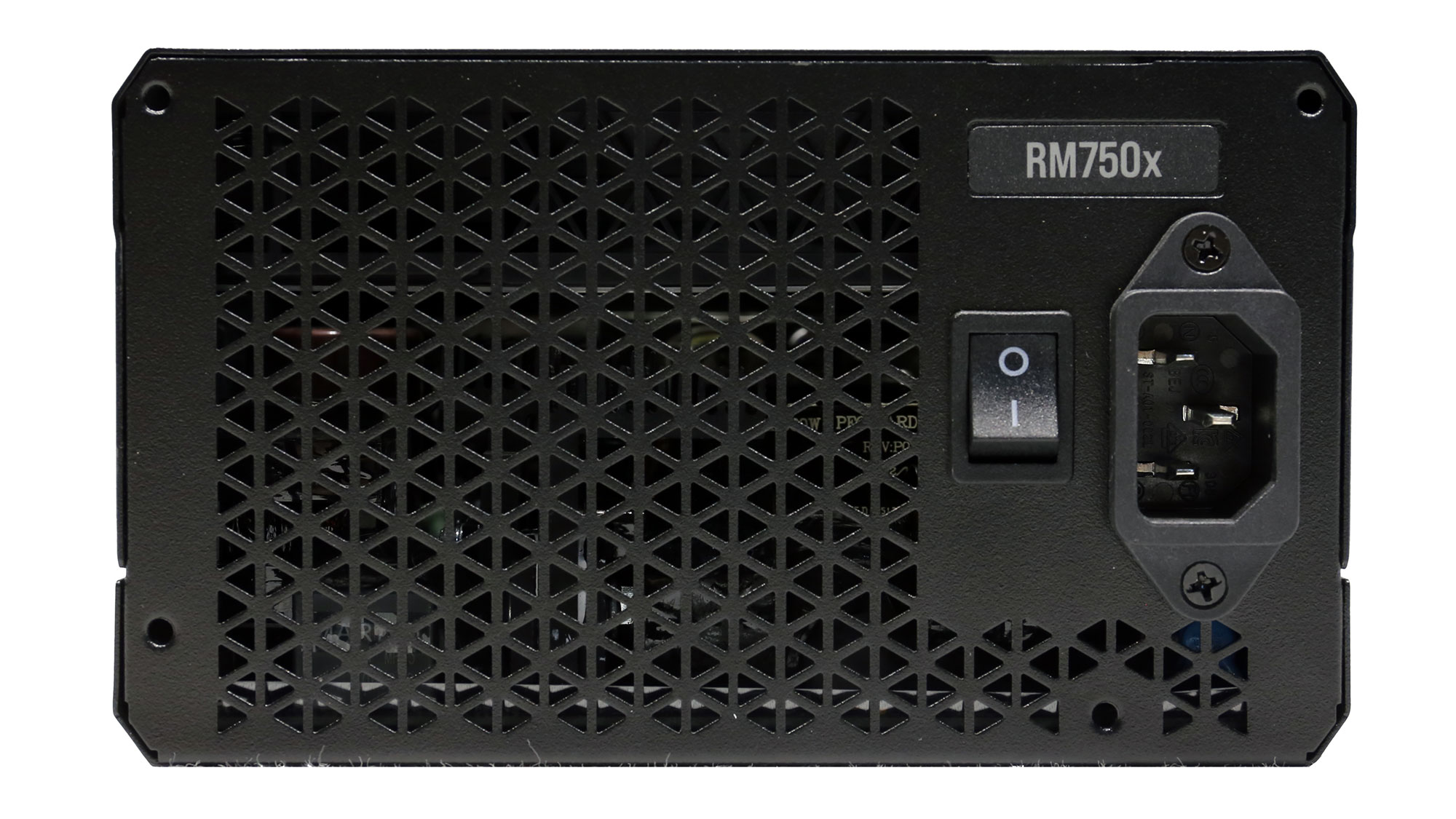
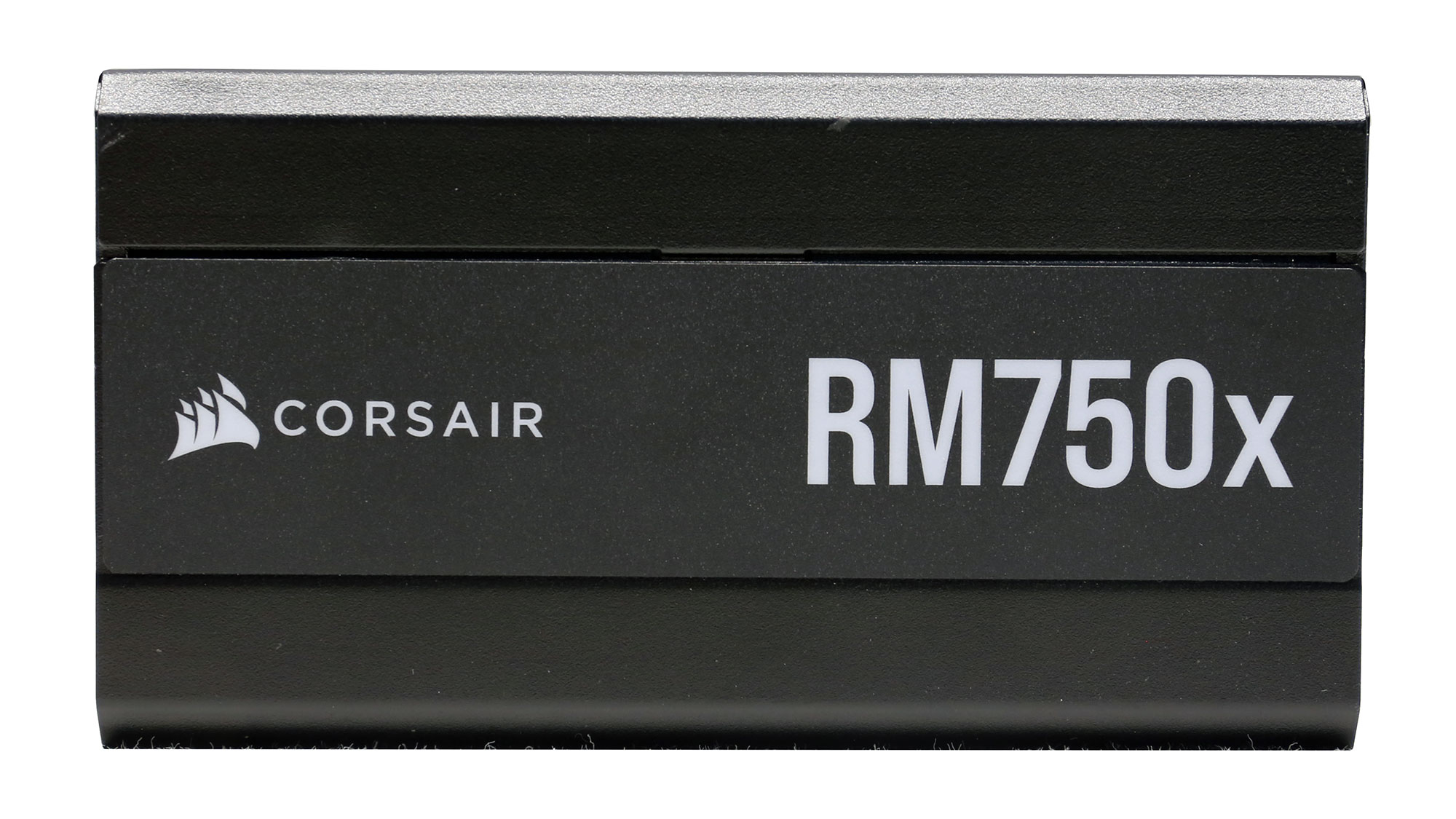
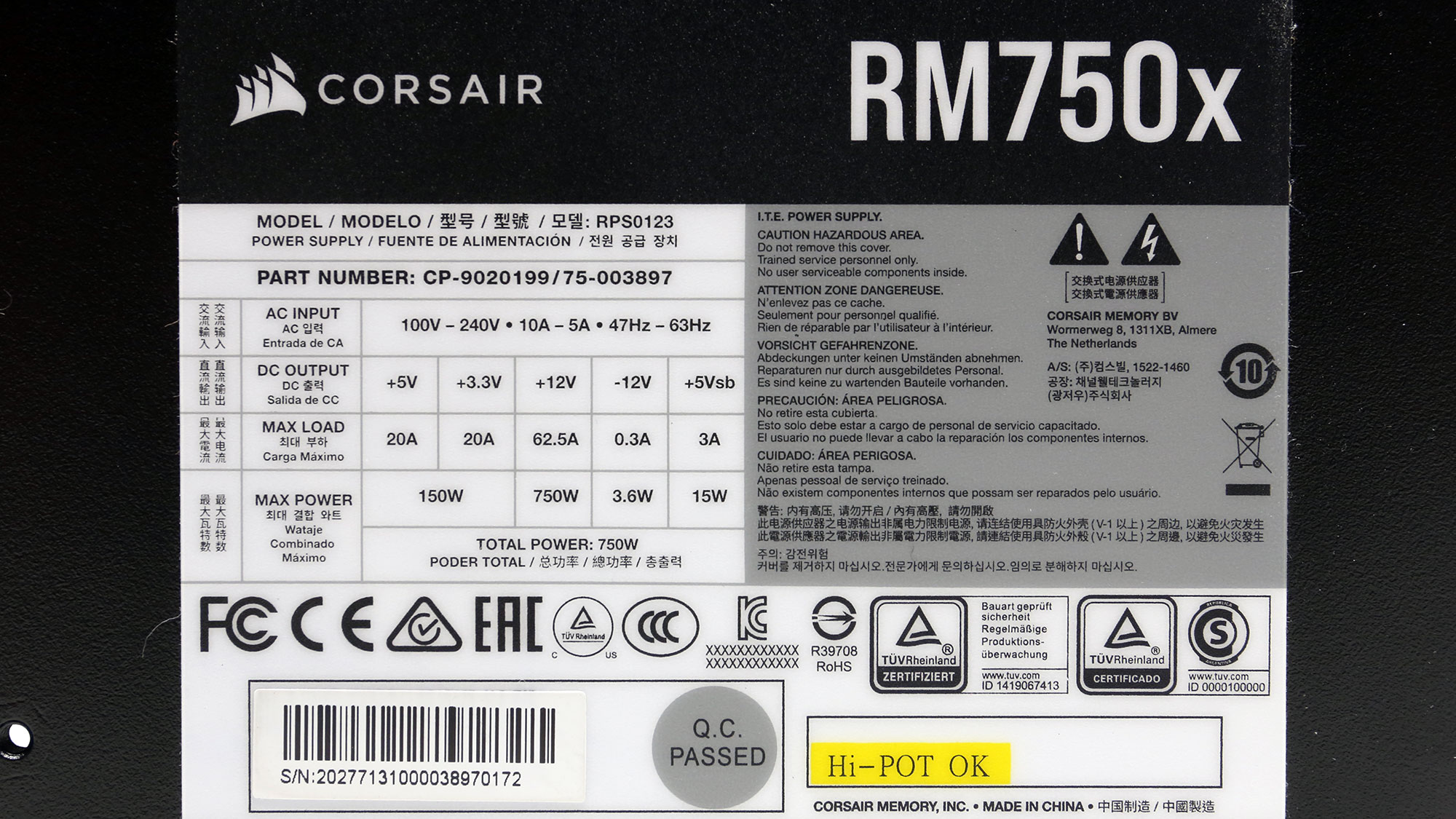
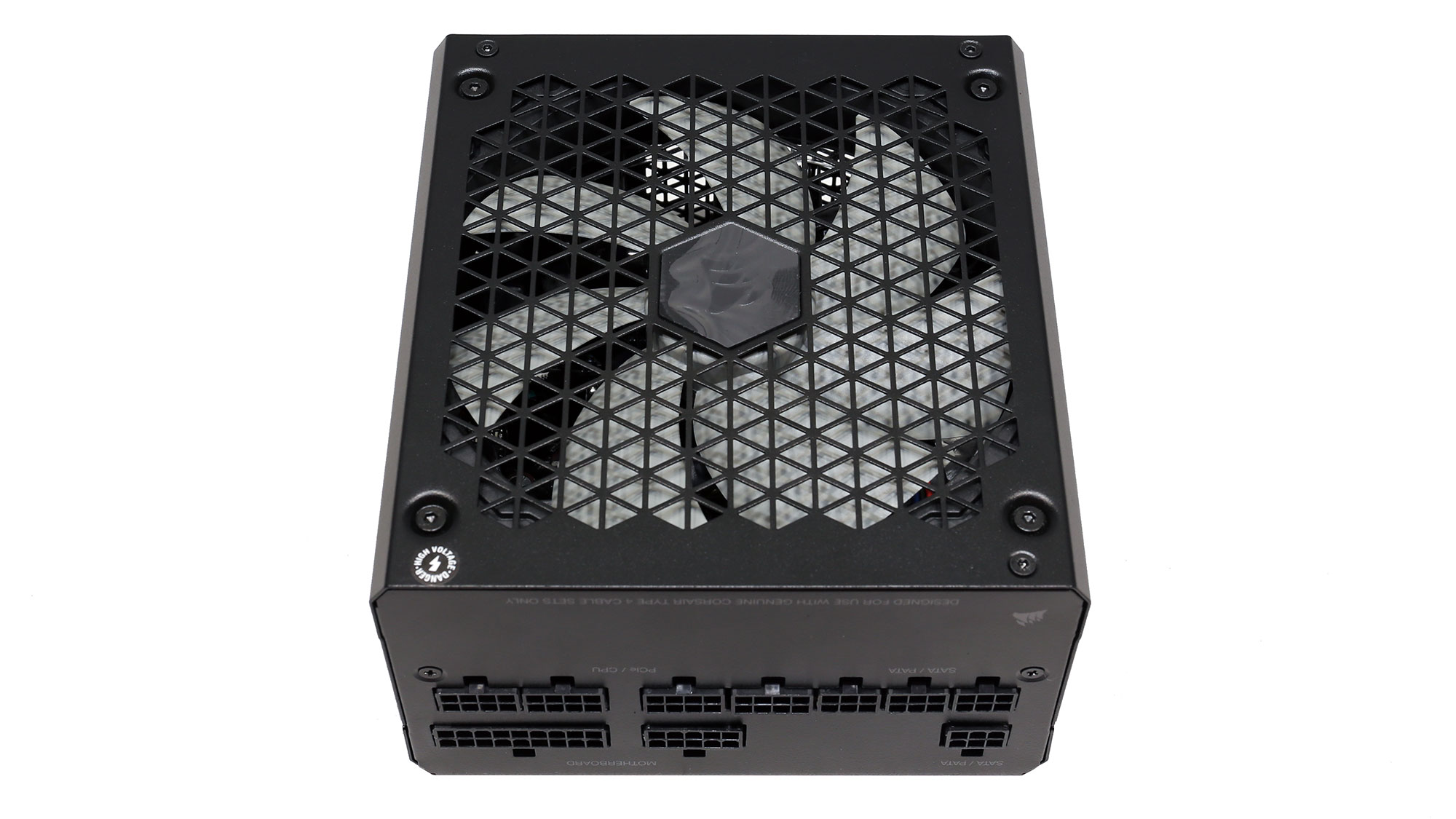
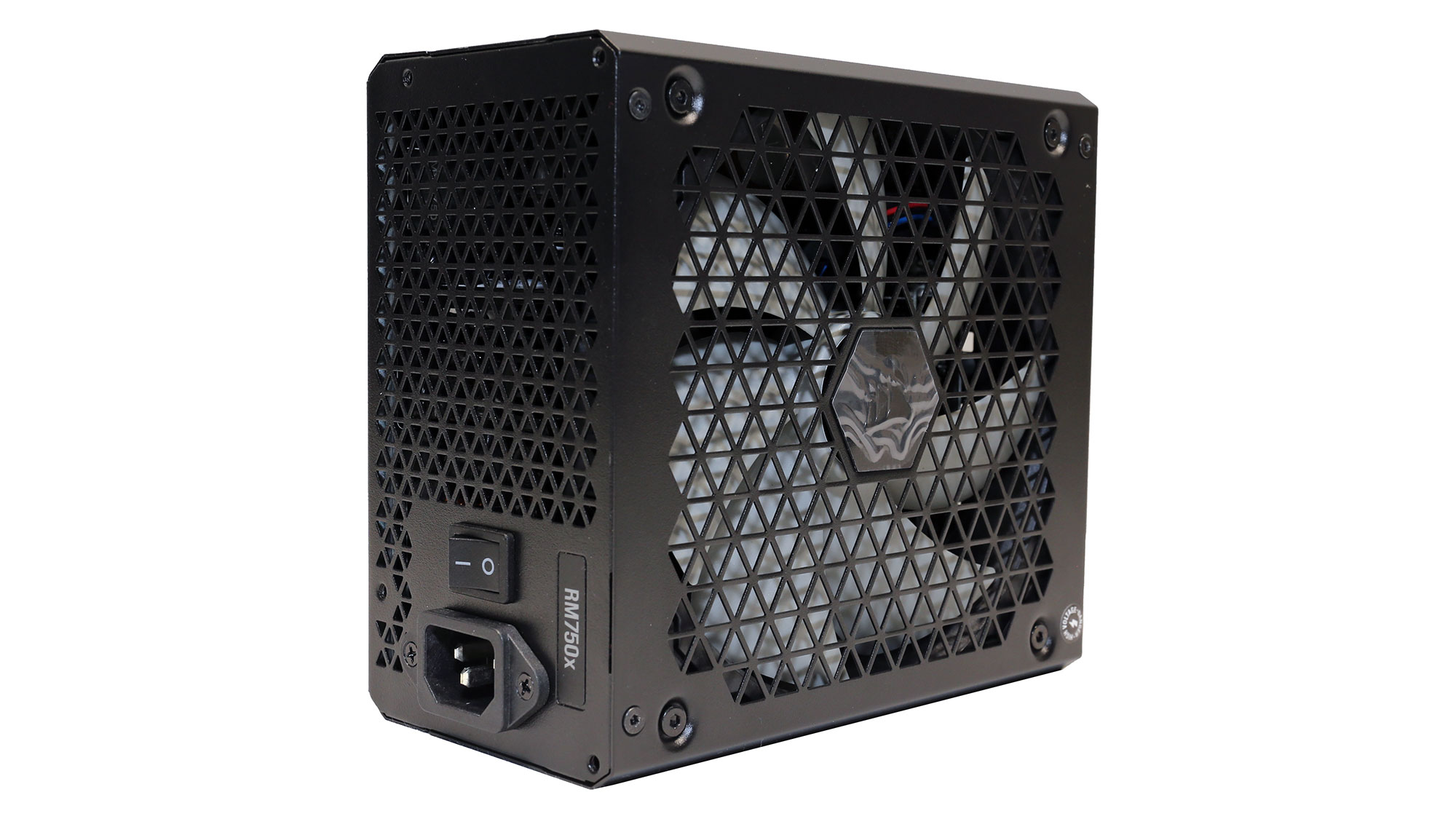
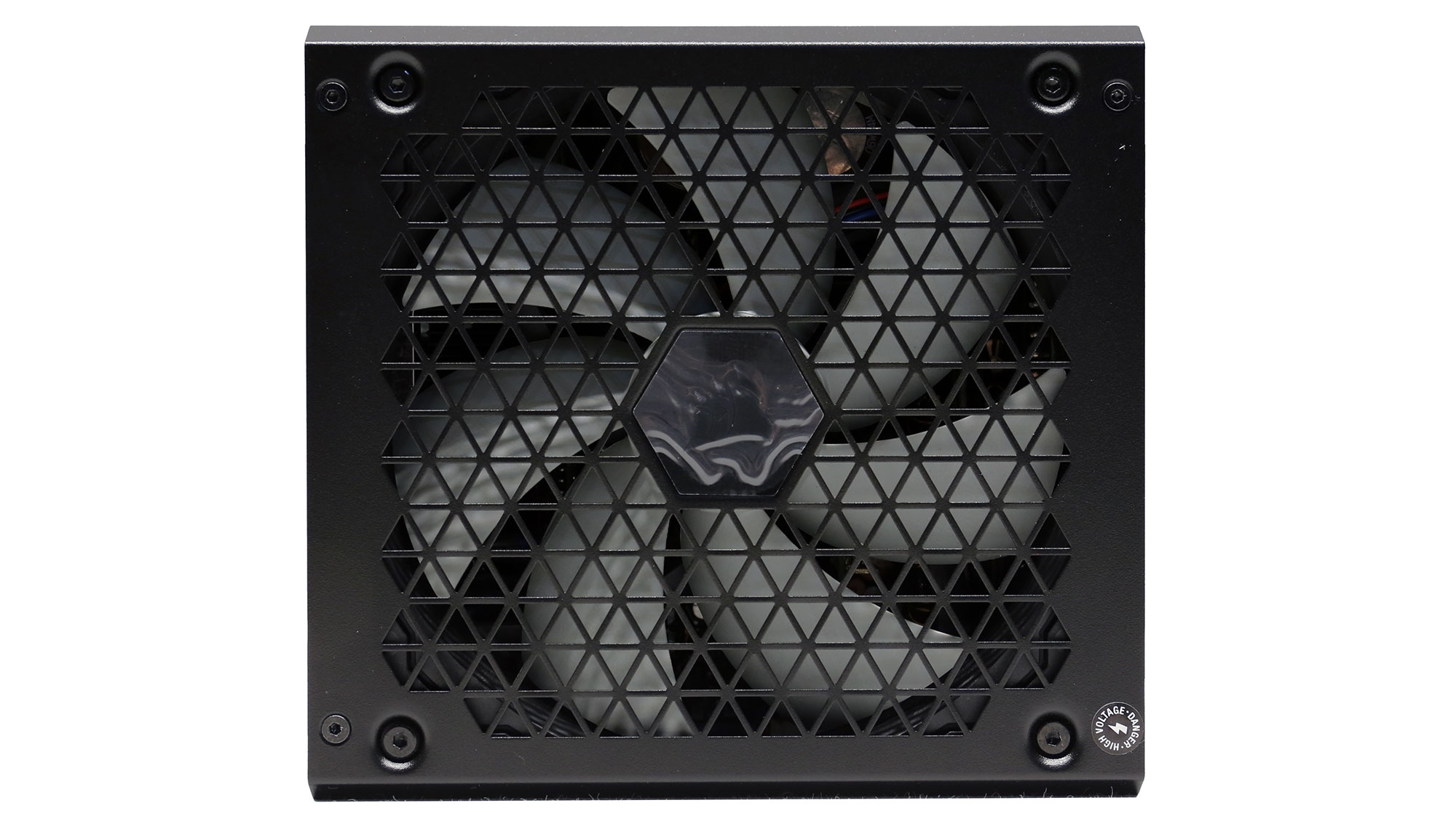
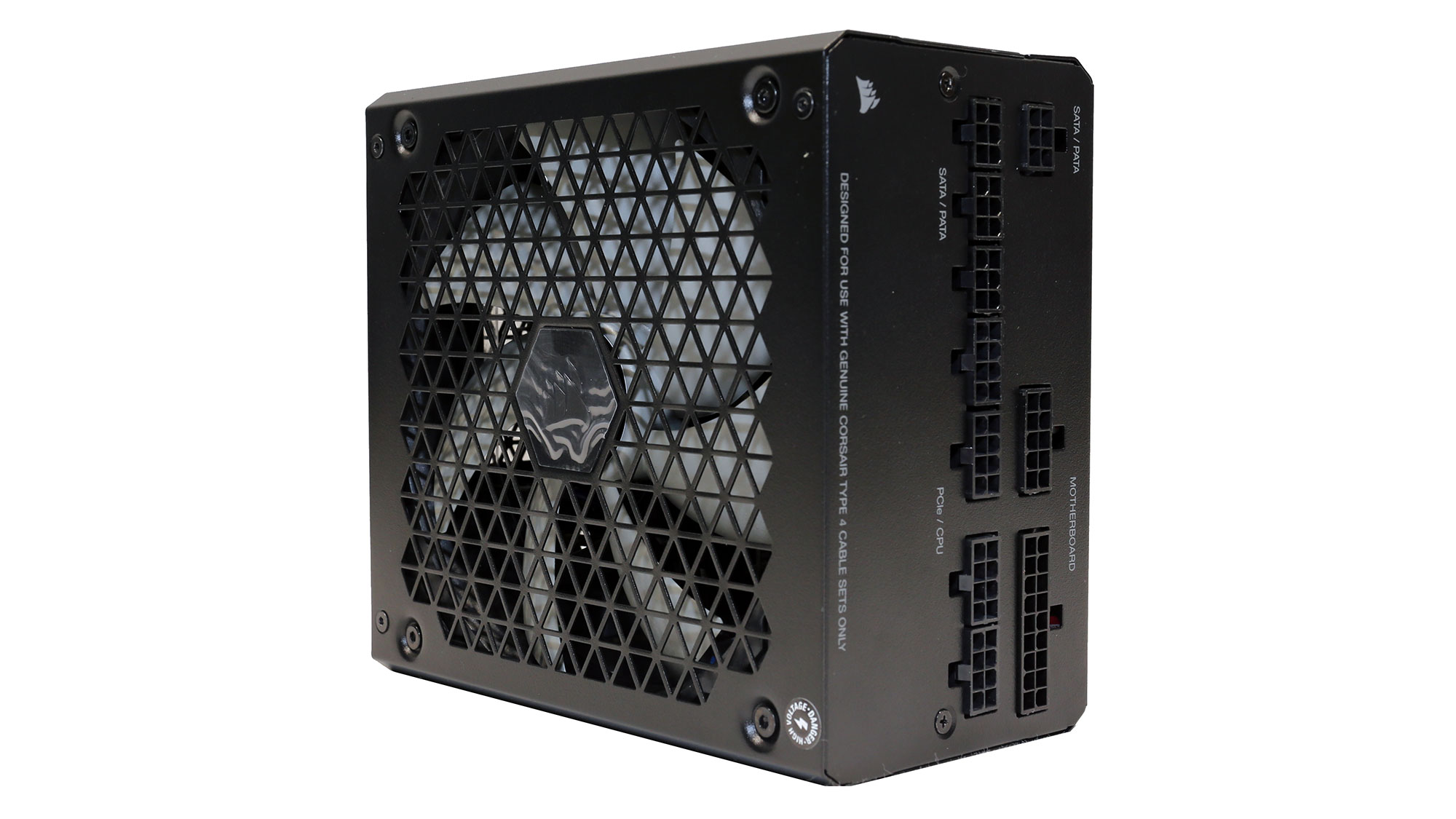
We will look at the third stronger member of the new RMx line in today's review, with 750W capacity. The RM750x is made by Channel Well Technology, like the rest of the line, and all of its cables are modular. The external design looks nice, and the fan grille, with the triangle perforations, doesn't look so restrictive. The PSU's dimensions are normal, which is a good thing since the smaller the power supply, the higher the noise output.
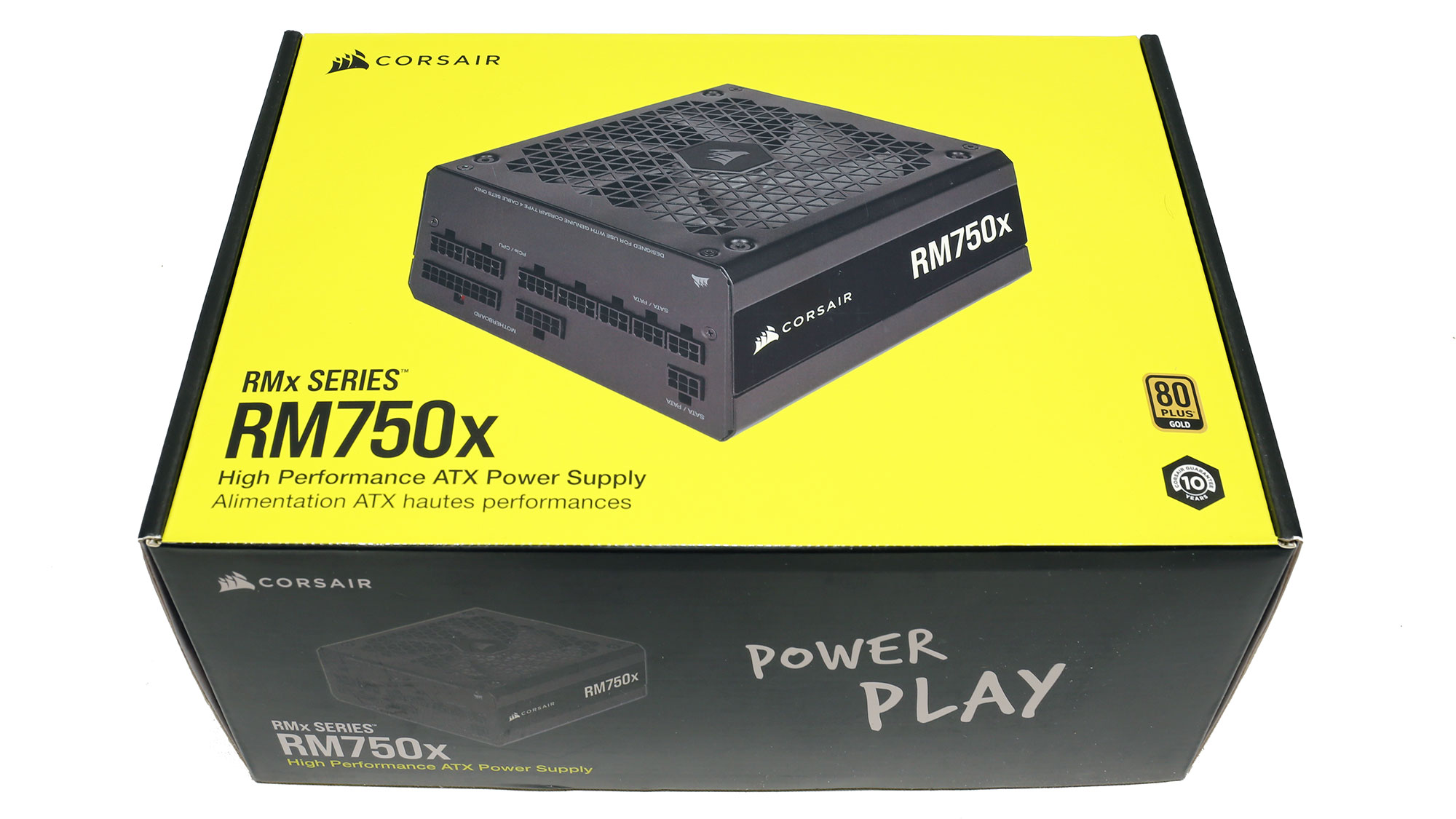
Product Photos
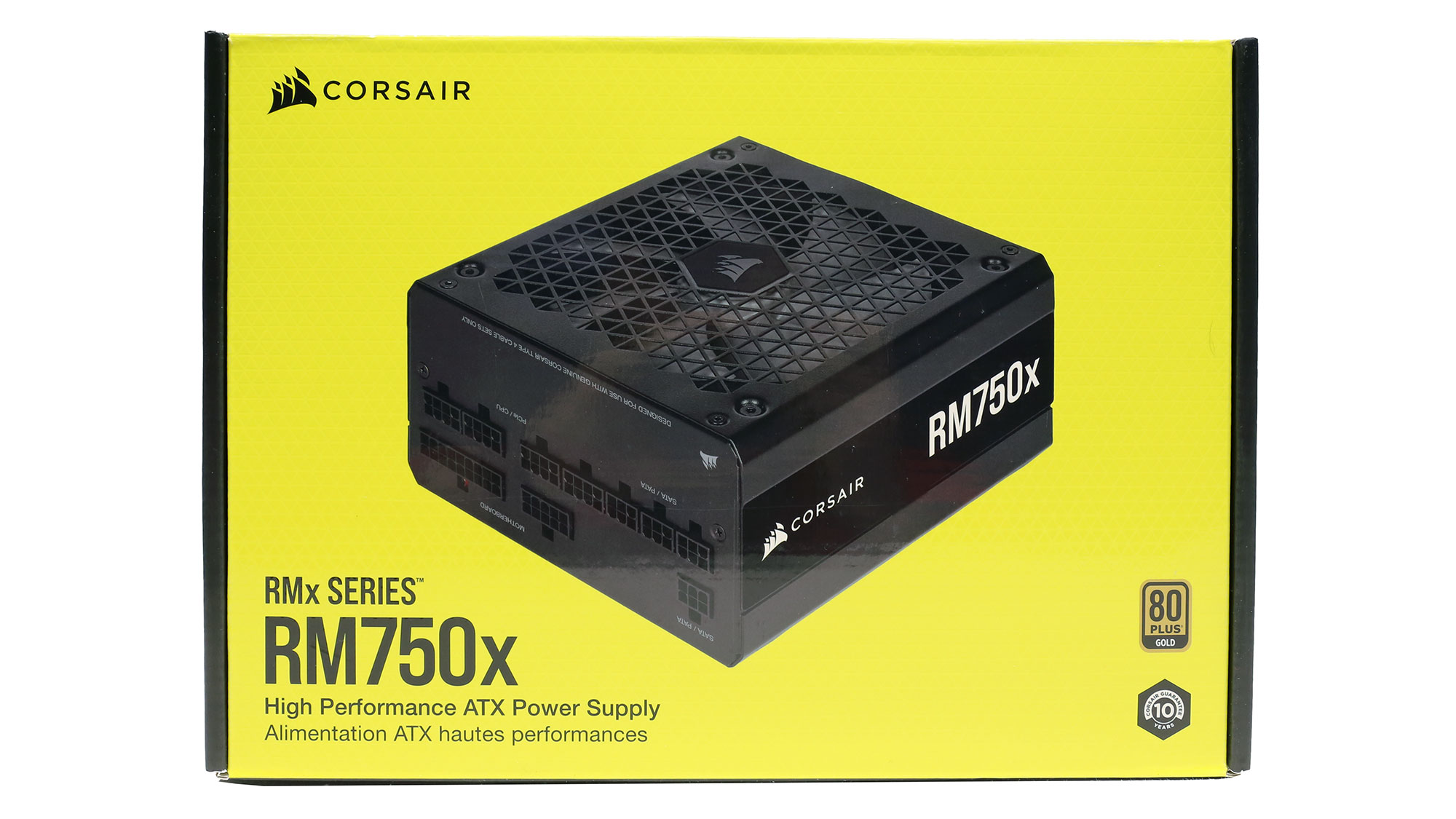
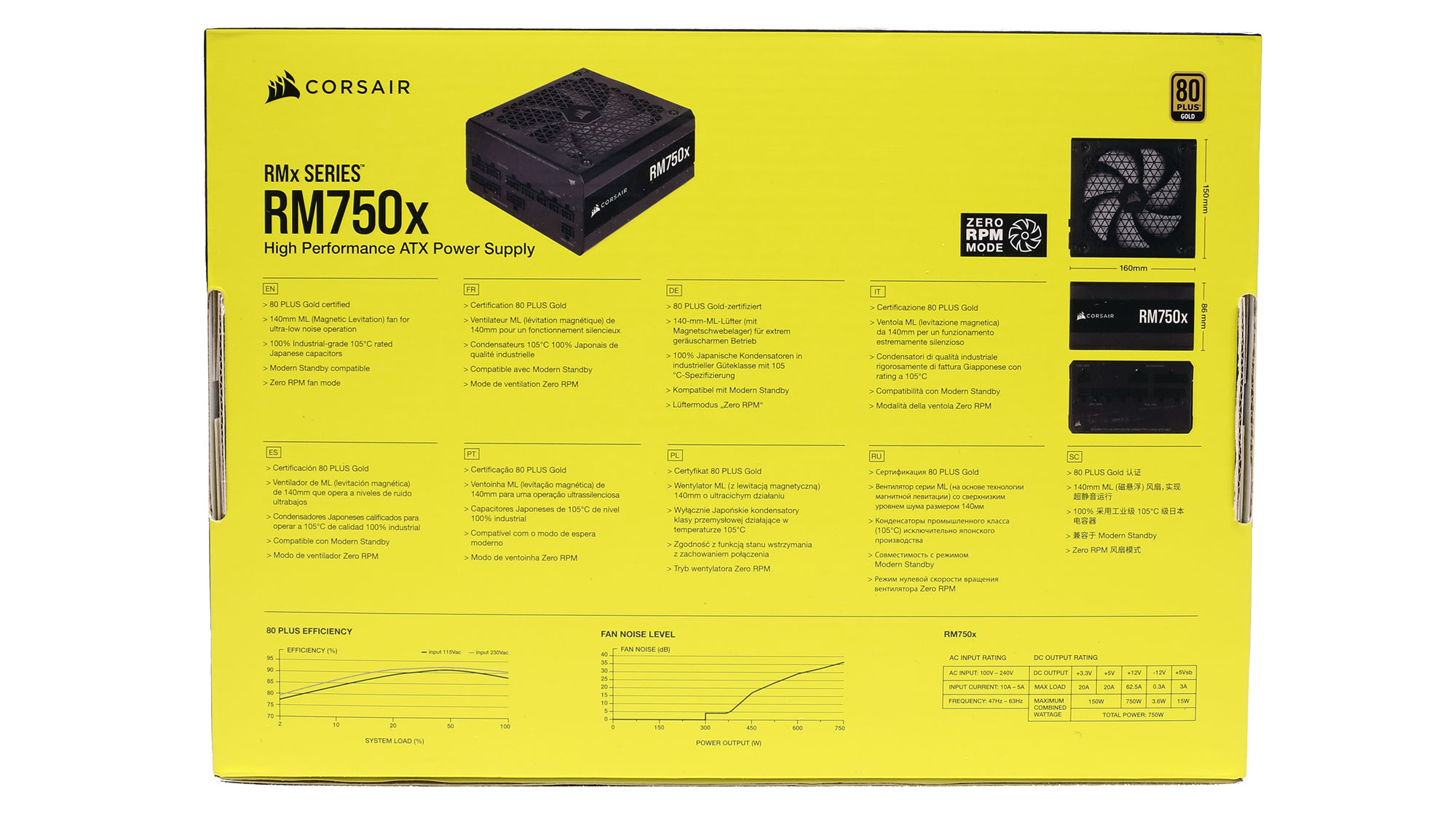
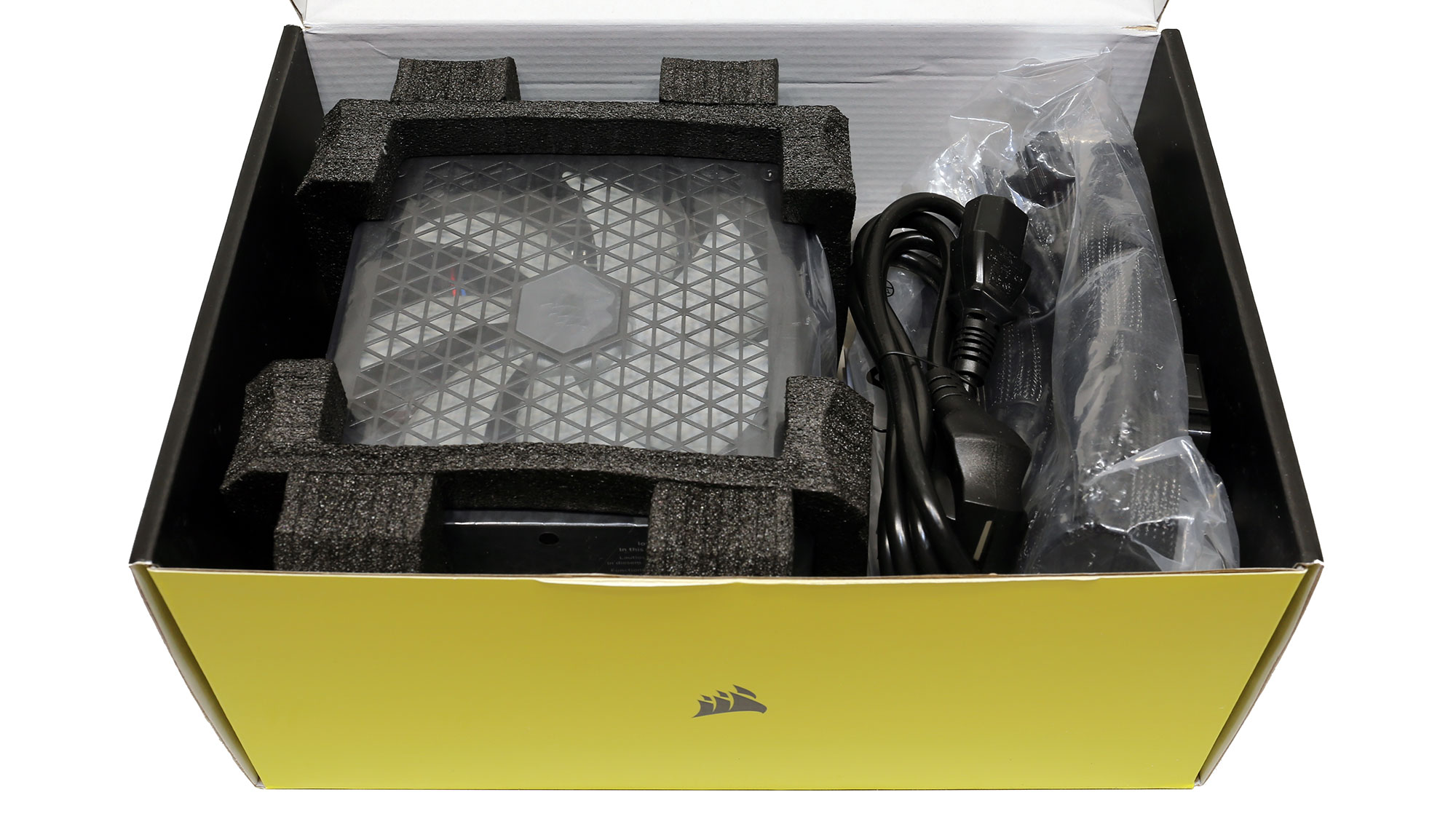
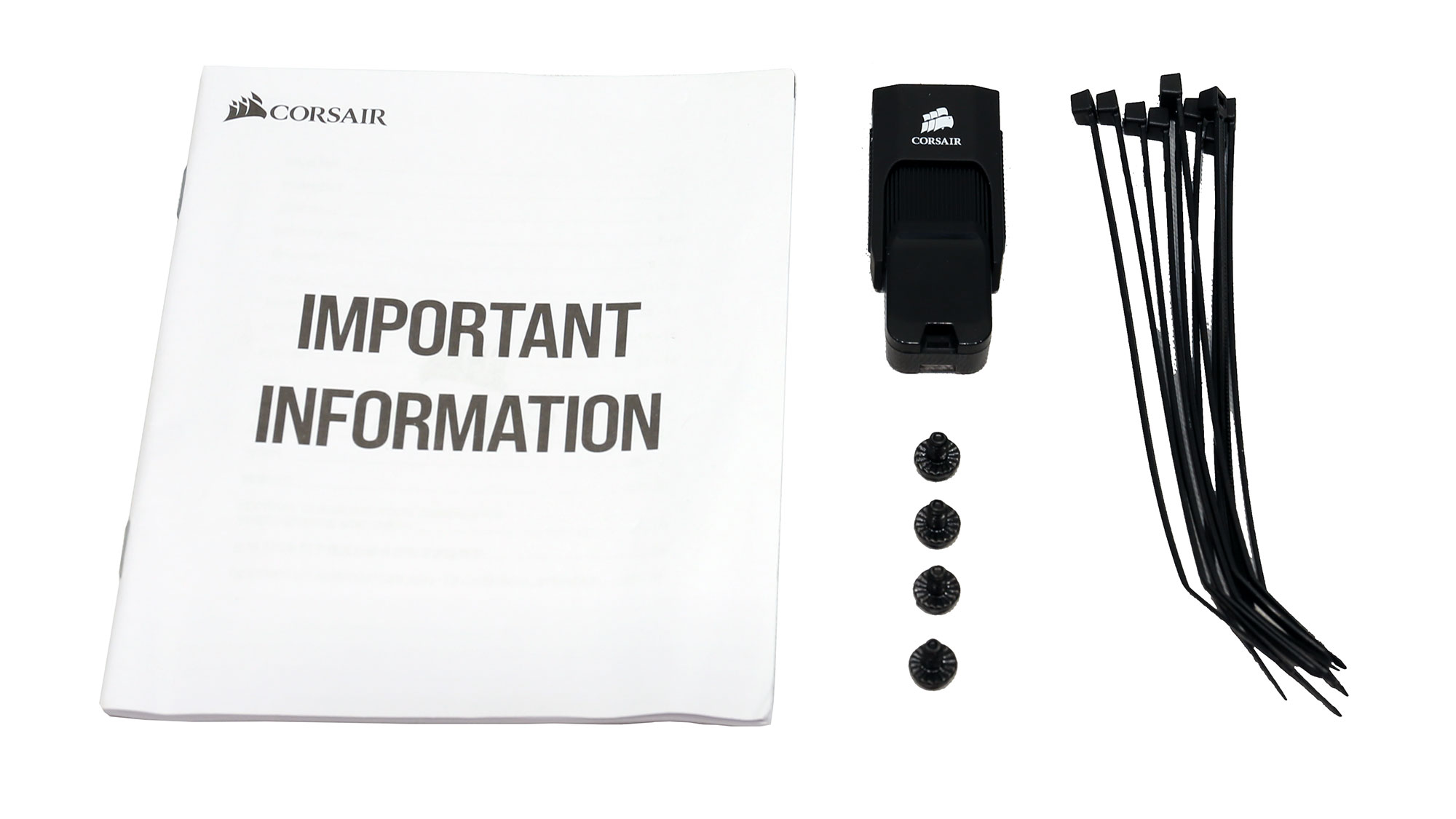
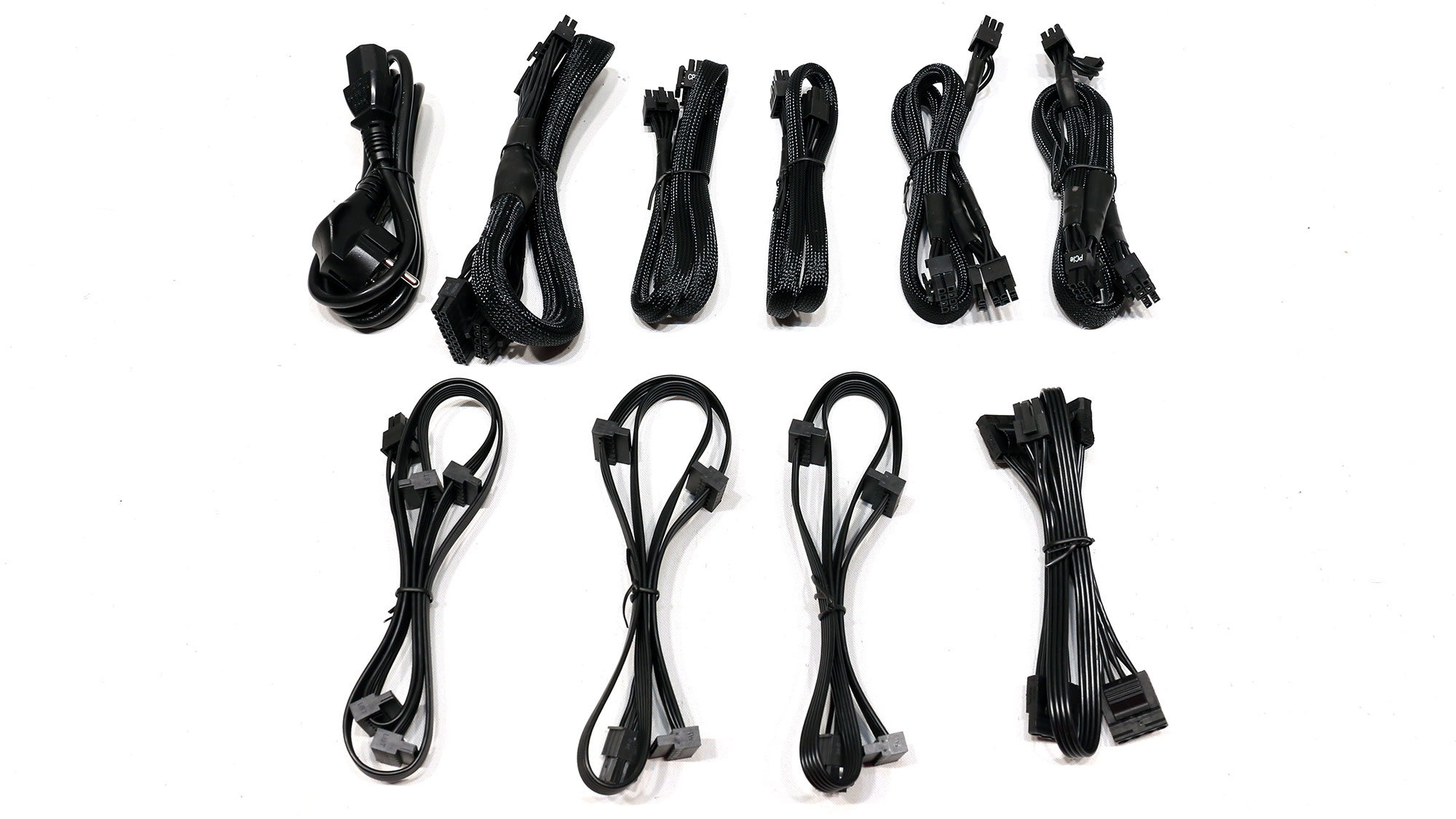
Specifications of Corsair RM750x
Manufacturer (OEM) | CWT |
Max. DC Output | 750W |
Efficiency | 80 PLUS Gold, Cybenetics Gold (87-89%) |
Noise | Cybenetics A- (25-30 dB[A]) |
Modular | ✓ (fully) |
Intel C6/C7 Power State Support | ✓ |
Operating Temperature (Continuous Full Load) | 0 - 50°C |
Over Voltage Protection | ✓ |
Under Voltage Protection | ✓ |
Over Power Protection | ✓ |
Over Current (+12V) Protection | ✓ |
Over Temperature Protection | ✓ |
Short Circuit Protection | ✓ |
Surge Protection | ✓ |
Inrush Current Protection | ✓ |
Fan Failure Protection | ✗ |
No Load Operation | ✓ |
Cooling | 140mm Magnetic Levitation Fan (NR140ML) |
Semi-Passive Operation | ✓ |
Dimensions (W x H x D) | 150 x 85 x 160mm |
Weight | 1.64 kg (3.62 lb) |
Form Factor | ATX12V v2.53, EPS 2.92 |
Warranty | 10 Years |
Power Specifications of Corsair RM750x
| Rail | 3.3V | 5V | 12V | 5VSB | -12V | |
|---|---|---|---|---|---|---|
| Max. Power | Amps | 20 | 20 | 62.5 | 3 | 0.3 |
| Watts | 150 | 750 | 15 | 3.6 | ||
| Total Max. Power (W) | 750 |
Cables & Connectors of Corsair RM750x
| Description | Cable Count | Connector Count (Total) | Gauge | In Cable Capacitors |
|---|---|---|---|---|
| ATX connector 20+4 pin (610mm) | 1 | 1 | 16-20AWG | Yes |
| 4+4 pin EPS12V (650mm) | 2 | 2 | 18AWG | Yes |
| 6+2 pin PCIe (600mm+150mm) | 2 | 4 | 16-18AWG | Yes |
| SATA (500mm+110mm+110mm+110mm) | 1 | 4 | 18AWG | No |
| SATA (520mm+110mm+110mm) | 2 | 6 | 18AWG | No |
| 4-pin Molex (450mm+100mm+100mm+100mm) | 1 | 4 | 18AWG | No |
| AC Power Cord (1400mm) - C13 coupler | 1 | 1 | 18AWG | - |
There are two EPS and four PCIe connectors, which are enough to deliver the unit's full power without any issues. The number of peripheral connectors is increased, and our only complaint here is the small distance between the 4-pin Molex connectors. SATA drives' slots might be close to each other in most chassis, not in all, though, but this usually is not the case for the devices that take power from 4-pin Molex (e.g., case fans). Finally, the in-cable caps can be a headache during cable routing and management.
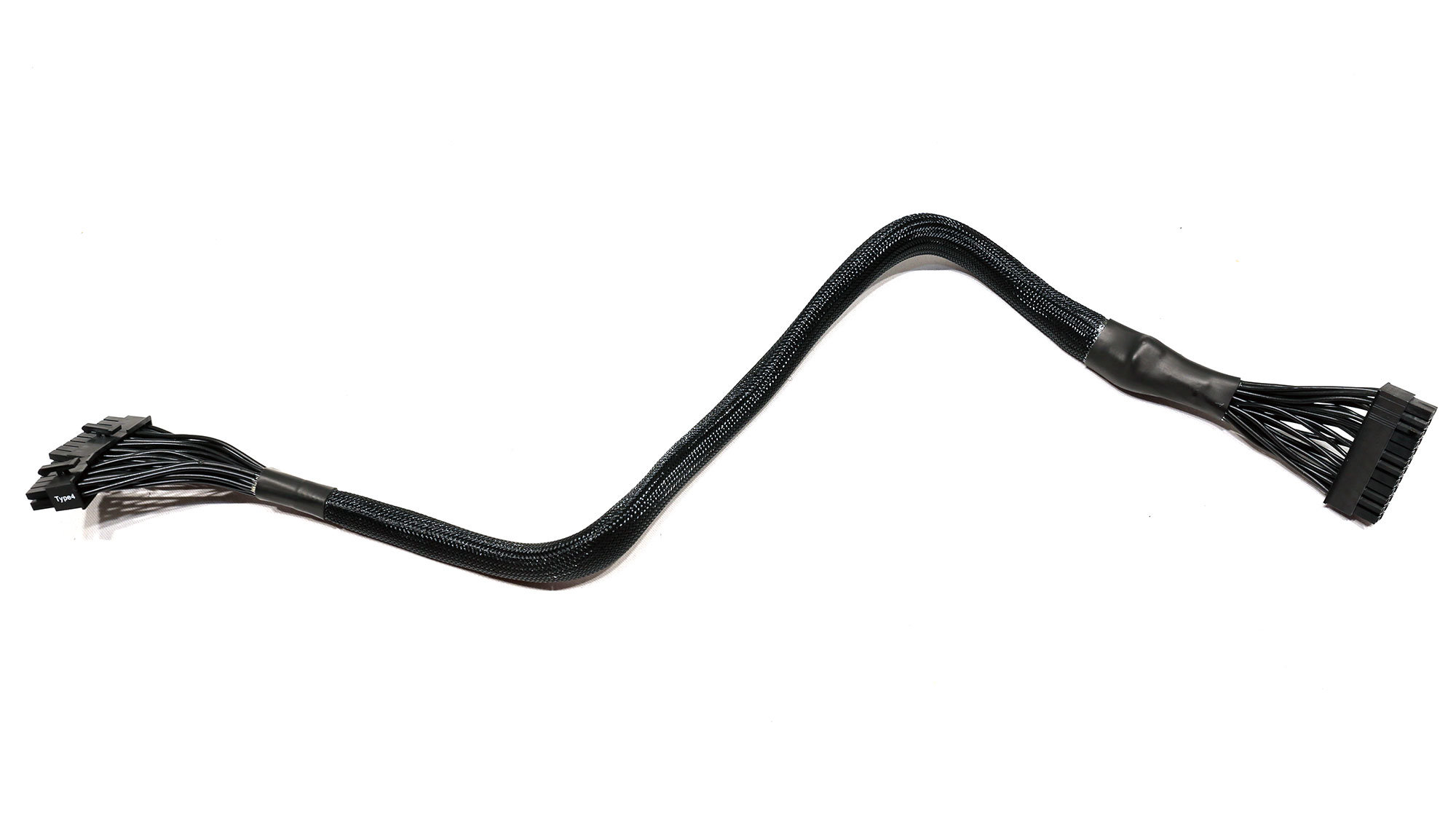
Cable Photos
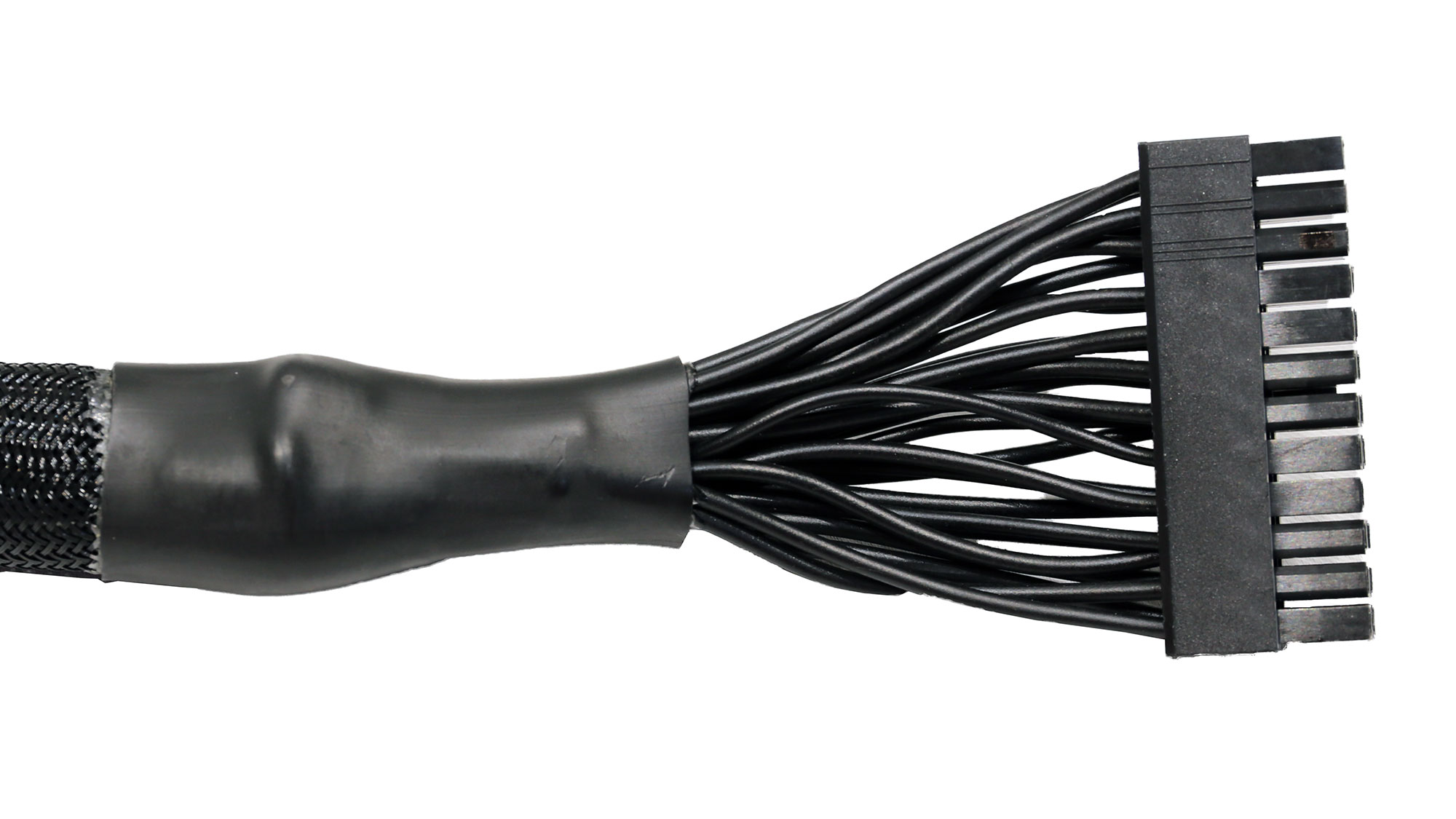
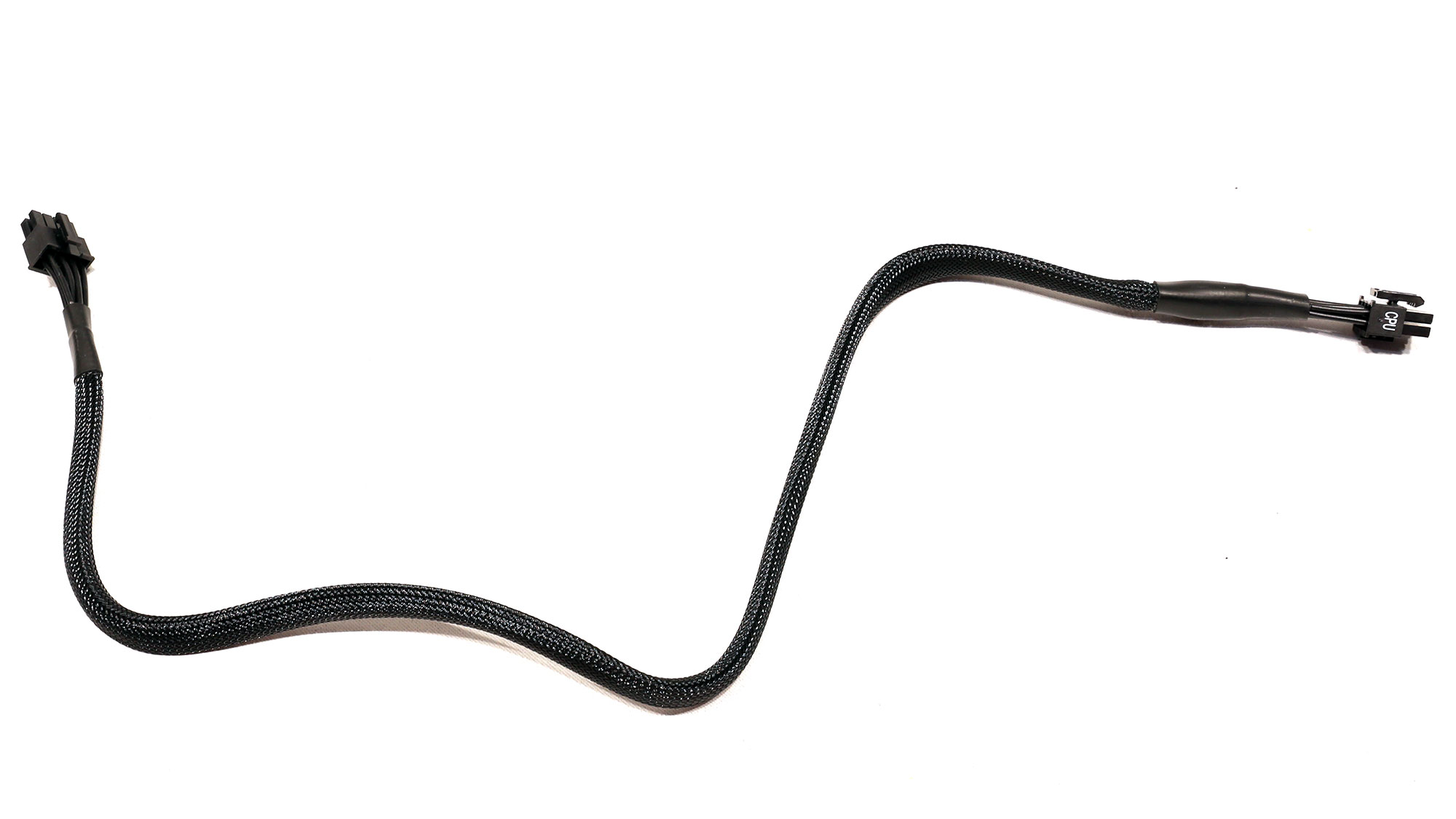
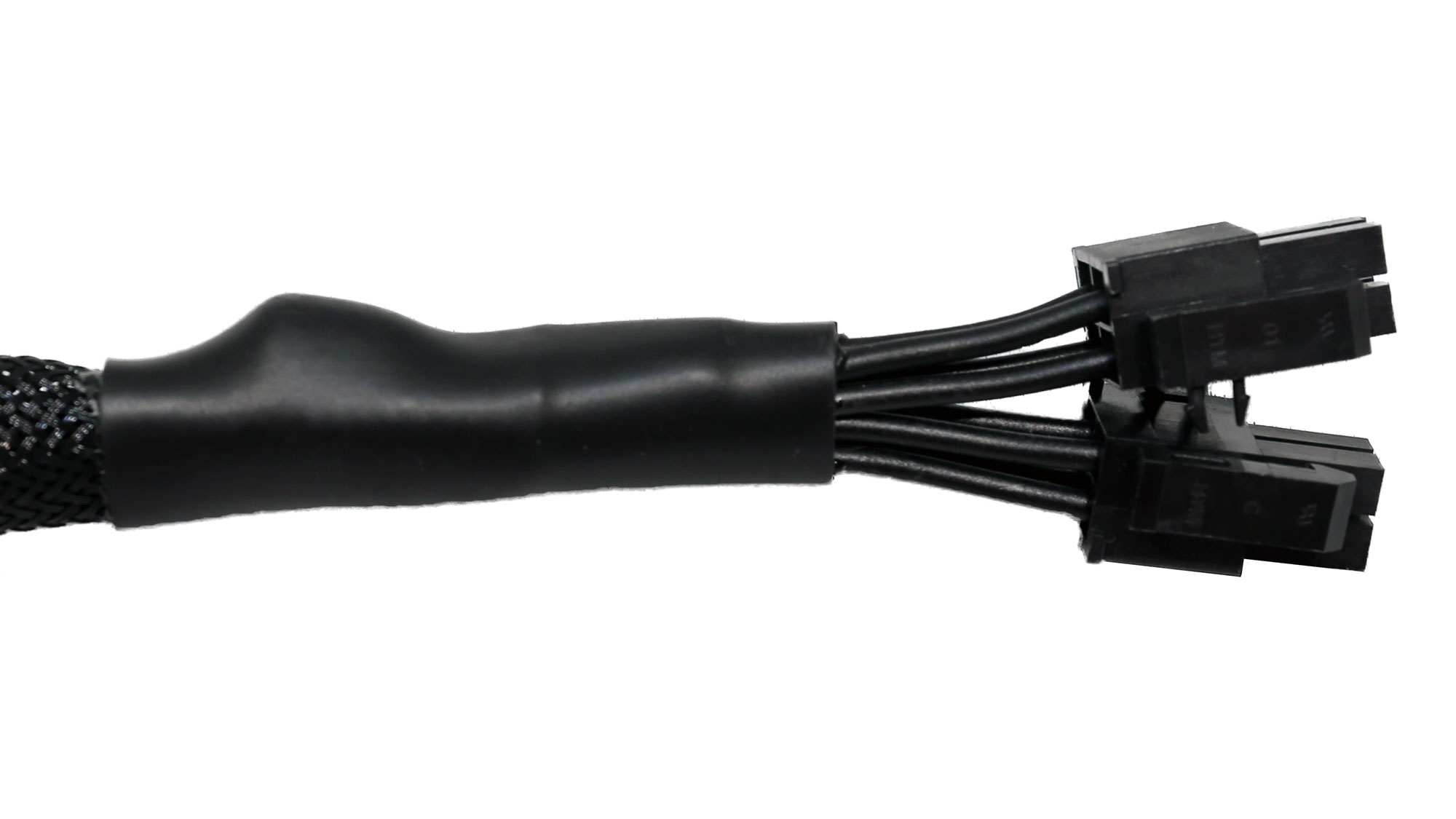
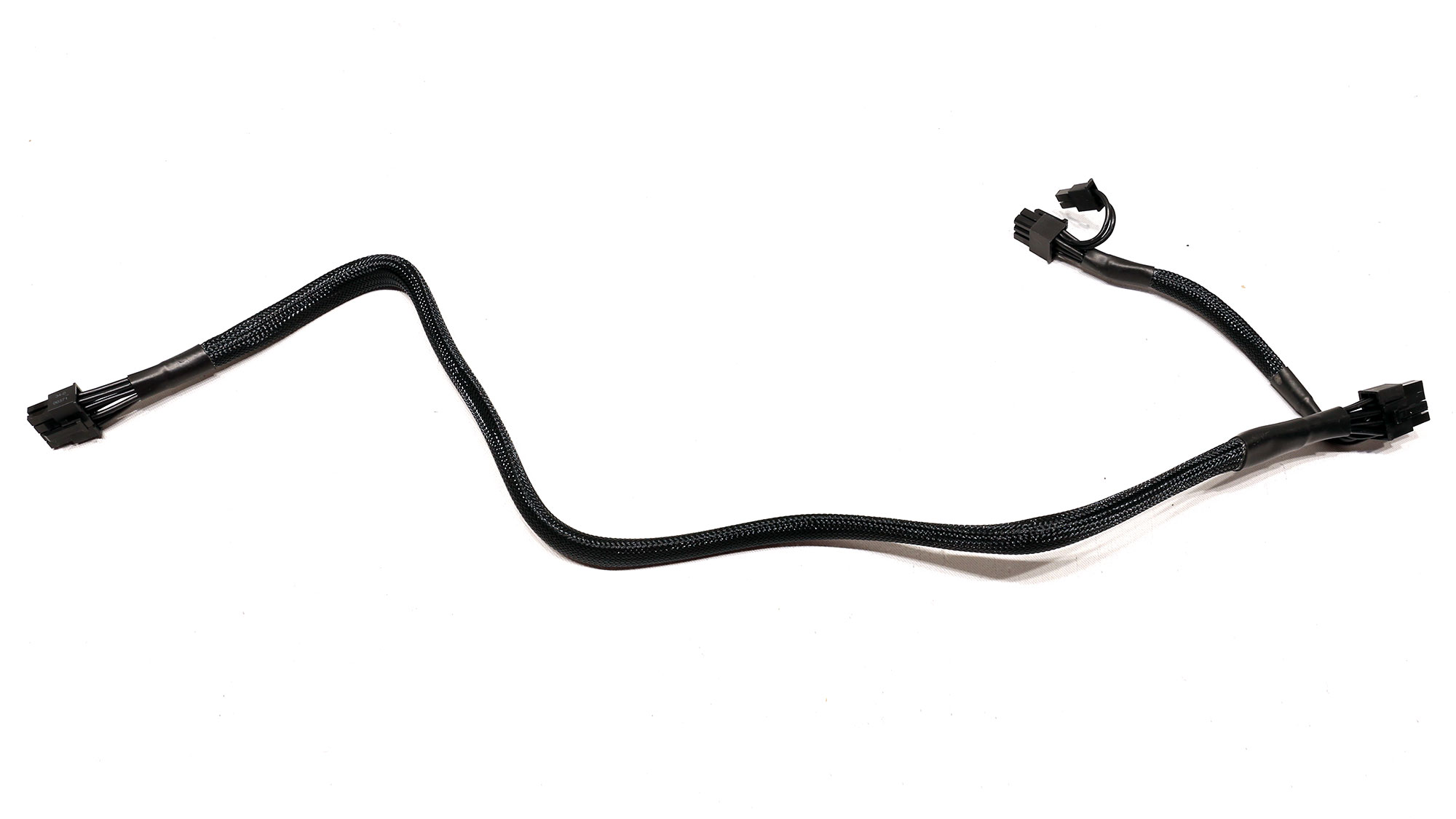
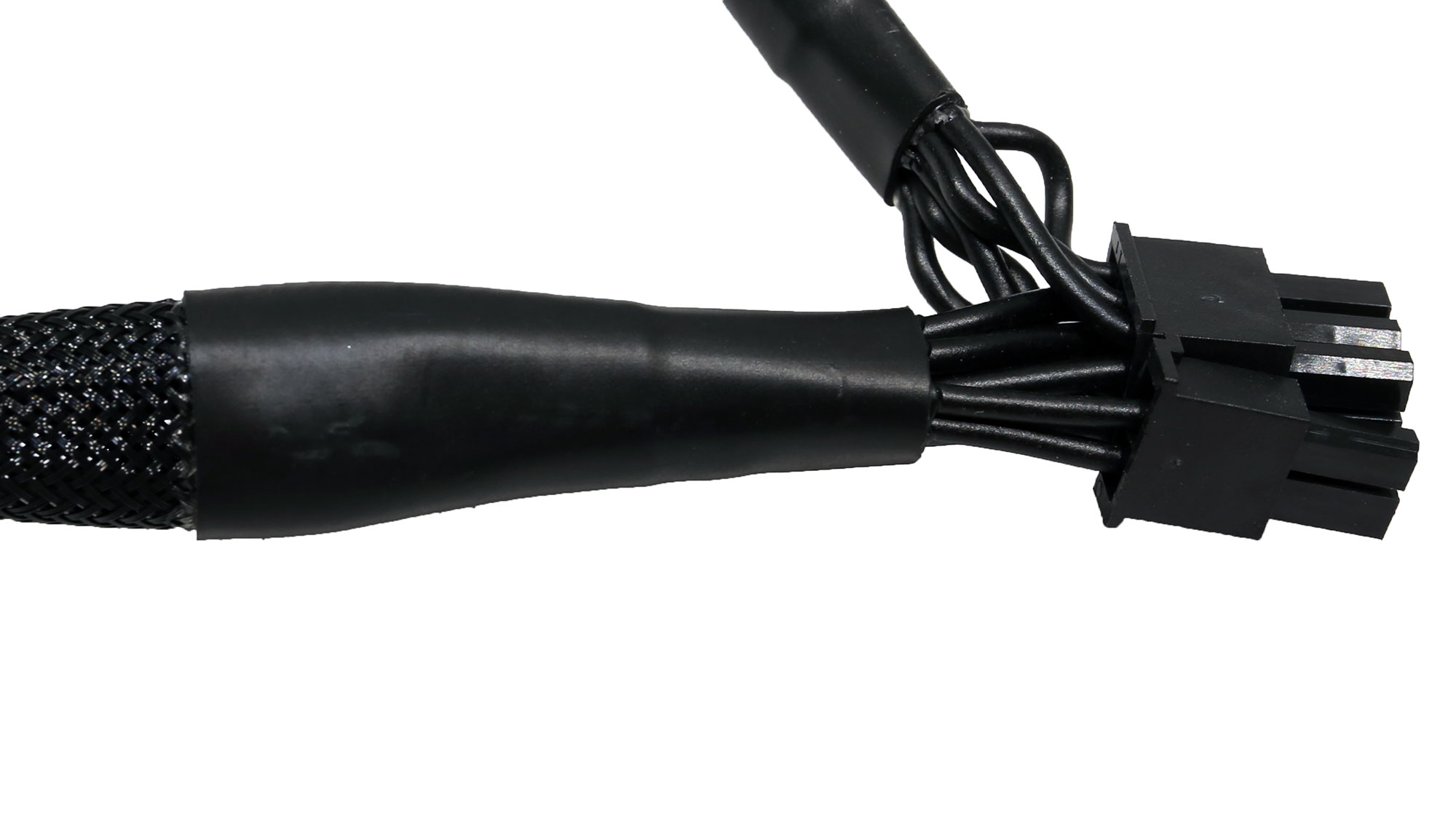
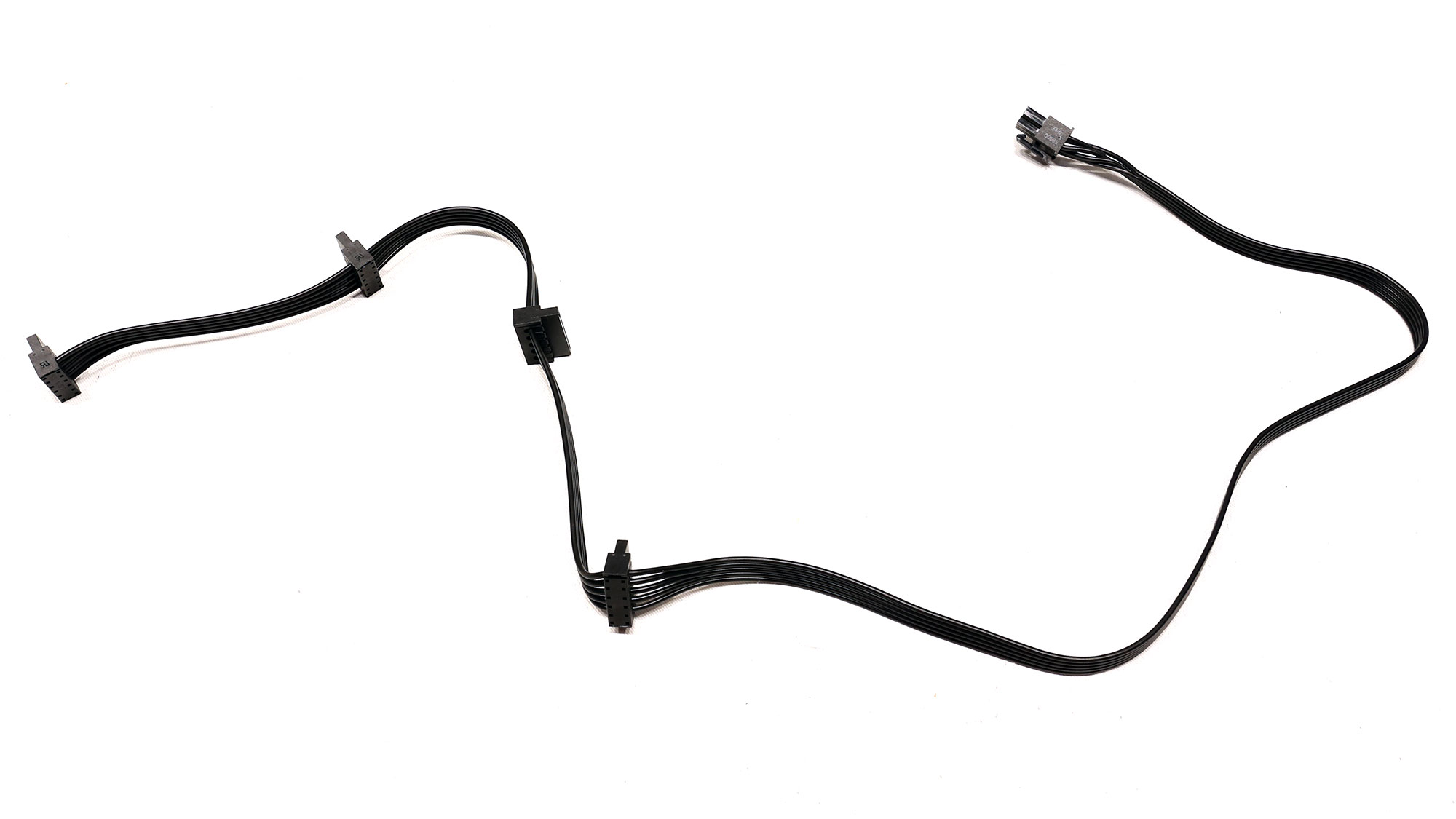
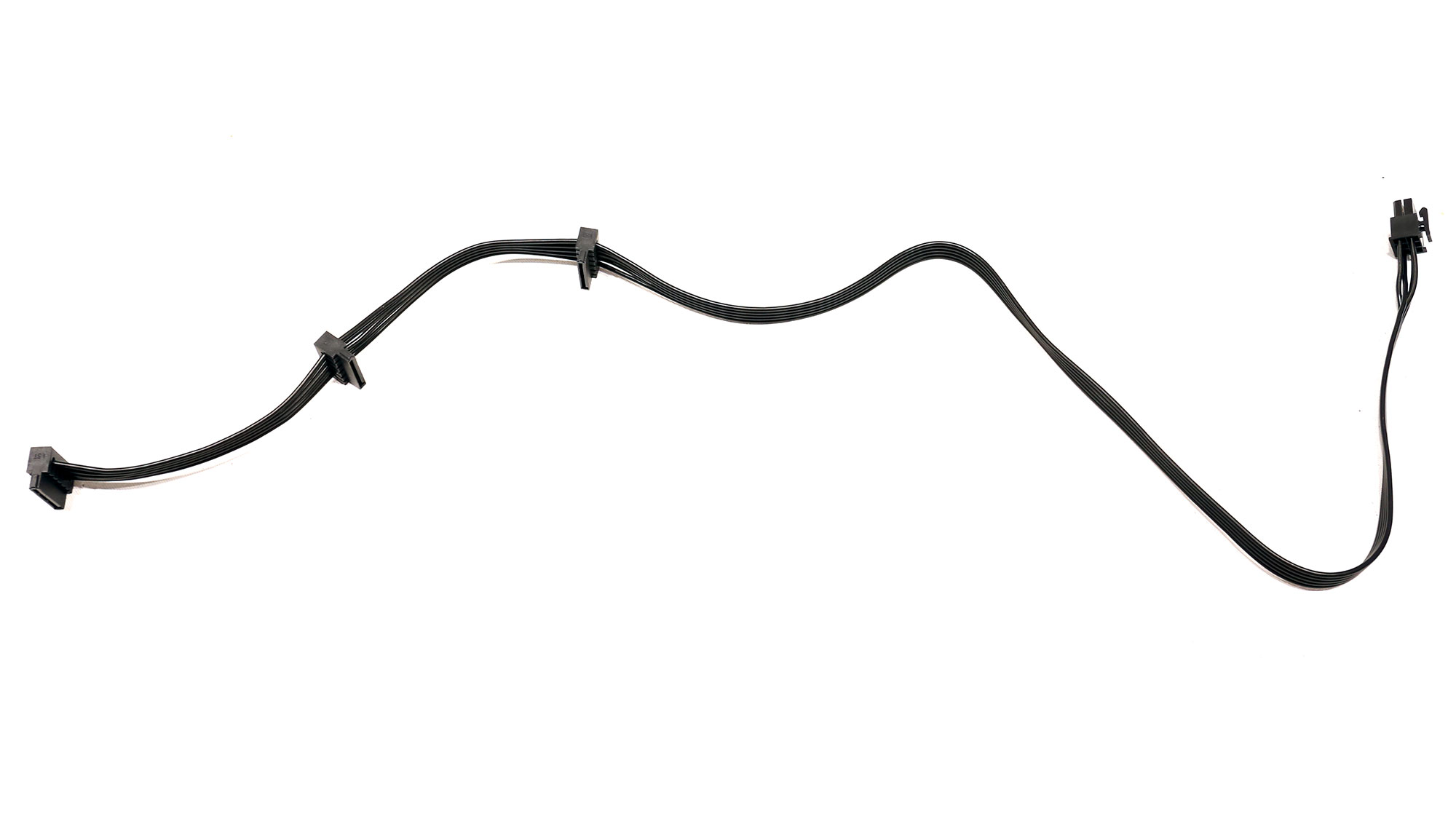
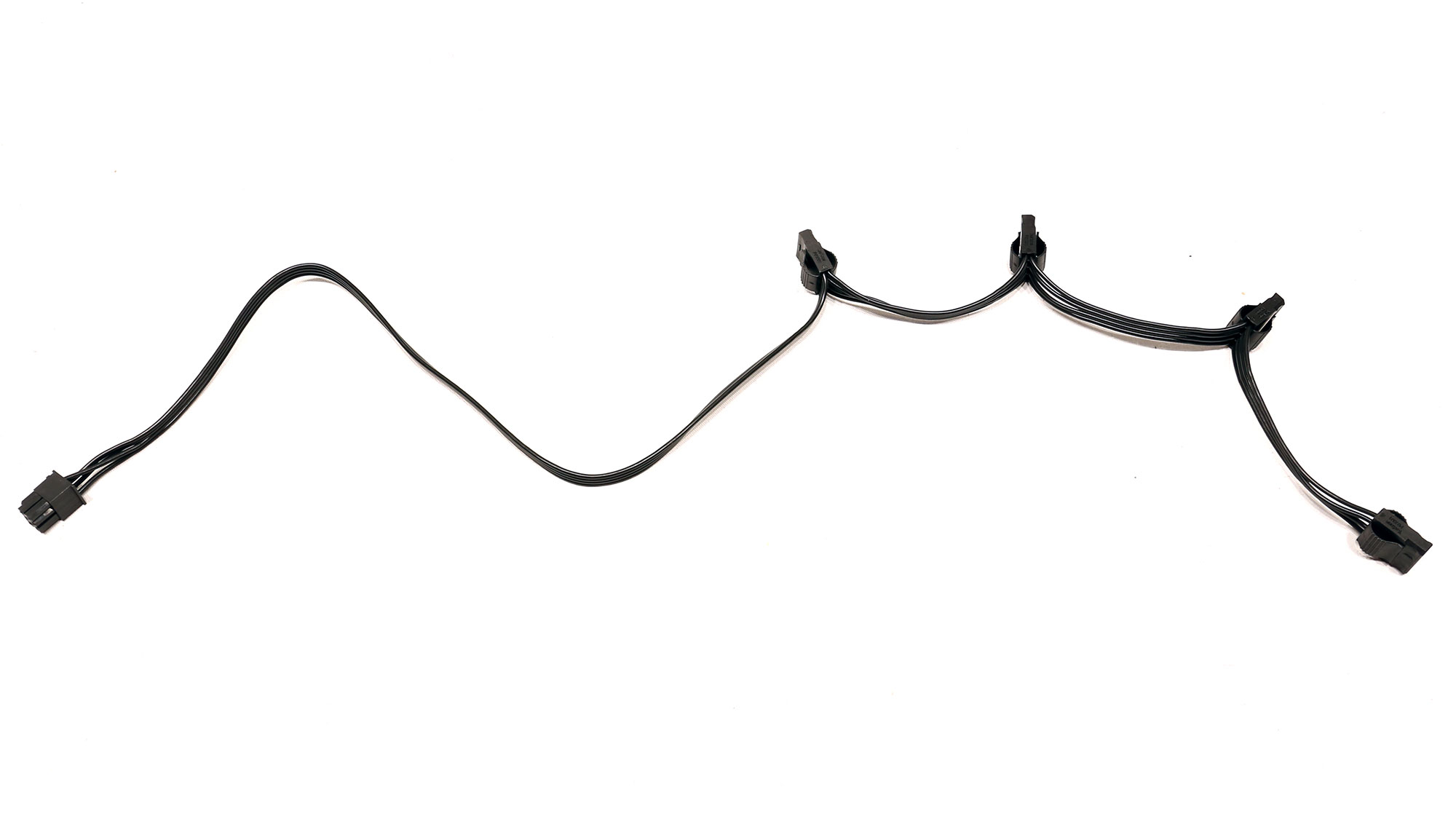
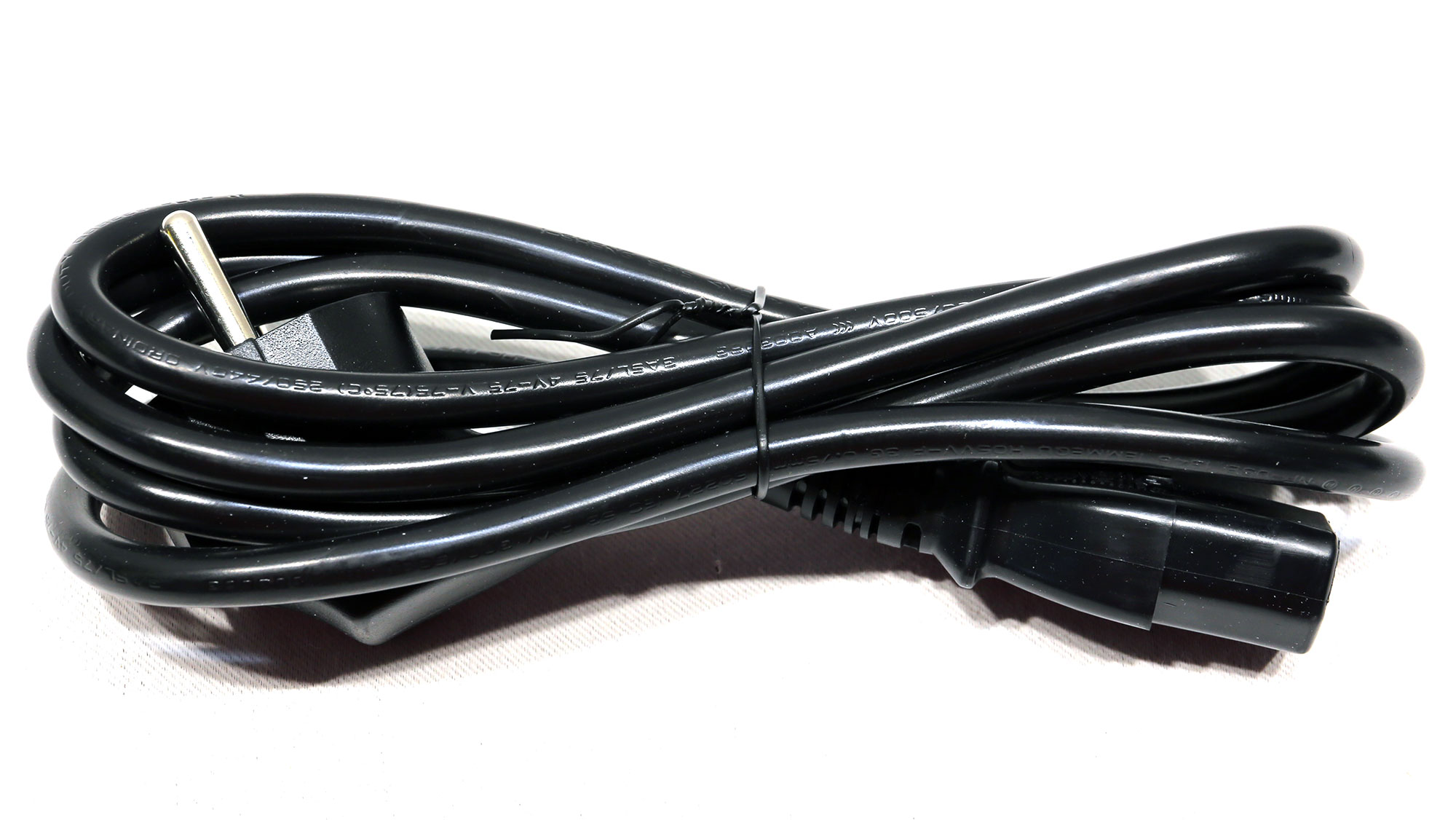
Component Analysis of Corsair RM750x
We strongly encourage you to have a look at our PSUs 101 article, which provides valuable information about PSUs and their operation, allowing you to better understand the components we're about to discuss.
| General Data | - |
| Manufacturer (OEM) | CWT |
| PCB Type | Double Sided |
| Primary Side | - |
| Transient Filter | 4x Y caps, 2x X caps, 2x CM chokes, 1x MOV |
| Inrush Protection | NTC Thermistor SCK-037 (3 Ohm) & Relay |
| Bridge Rectifier(s) | 2x GBU1506 (600V, 15A @ 100°C) |
| APFC MOSFETs | 2x On Semiconductor FCPF190N60E (600V, 13.1A @ 100°C, Rds(on): 0.19Ohm) |
| APFC Boost Diode | 1x Power Intergrations QH08TZ600 (600V, 8A @ 95°C) |
| Bulk Cap(s) | 2x Nippon Chemi-Con (400V, 470uF & 390uF each or 860uF combined, 2,000h @ 105°C, KMW) |
| Main Switchers | 2x On Semiconductor FCPF190N60E (600V, 13.1A @ 100°C, Rds(on): 0.19Ohm) |
| APFC Controller | Champion CM6500UNX & Champion CM03X |
| Resonant Controller | Champion CU6901VAC |
| Topology | Primary side: APFC, Half-Bridge & LLC converter Secondary side: Synchronous Rectification & DC-DC converters |
| Secondary Side | - |
| +12V MOSFETs | 6x On Semiconductor NTMFS5C430N (40V, 131A @ 100°C, Rds(on): 1.7mOhm) |
| 5V & 3.3V |
DC-DC Converters: 2x UBIQ QM3054M6 (30V, 61A @ 100°C, Rds(on): 4.8mOhm) & 2x UBIQ QN3107M6N (30V, 70A @ 100°C, Rds(on): 2.6mOhm) |
| Filtering Capacitors | Electrolytic: 7x Nippon Chemi-Con (1-5,000h @ 105°C, KZE), 7x Nippon Chemi-Con (4-10,000h @ 105°C, KY), 1x Rubycon (4-10,000h @ @ 105°C, YXJ) Polymer: 33x FPCAP |
| Change Over Switch | 1x Sync Power SPN3006 MOSFET (30V, 57A @ 100°C, Rds(on): 5.5mOhm) |
| Supervisor IC | Weltrend WT7502R (OVP, UVP, SCP, PG) |
| Fan Controller | Microchip PIC16F1503 |
| Fan Model | Corsair NR140ML (140mm, 12V, 0.27A, Magnetic Levitation Bearing Fan) |
| 5VSB | - |
| Rectifier | 1x PS1045L SBR (45V, 10A) & IPS ISD04N65A |
| Standby PWM Controller | On-Bright OB5282 |
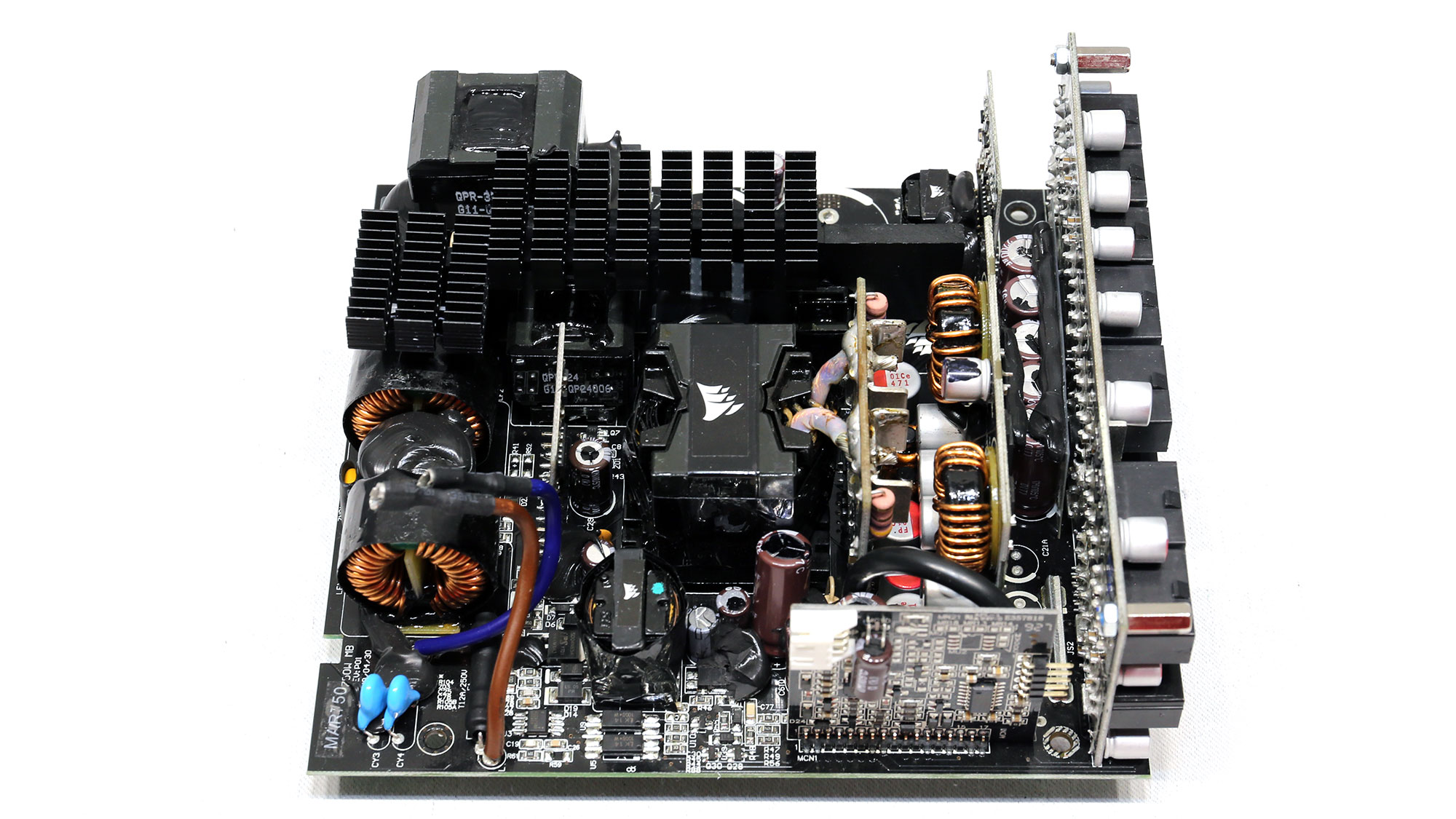
Overall Photos
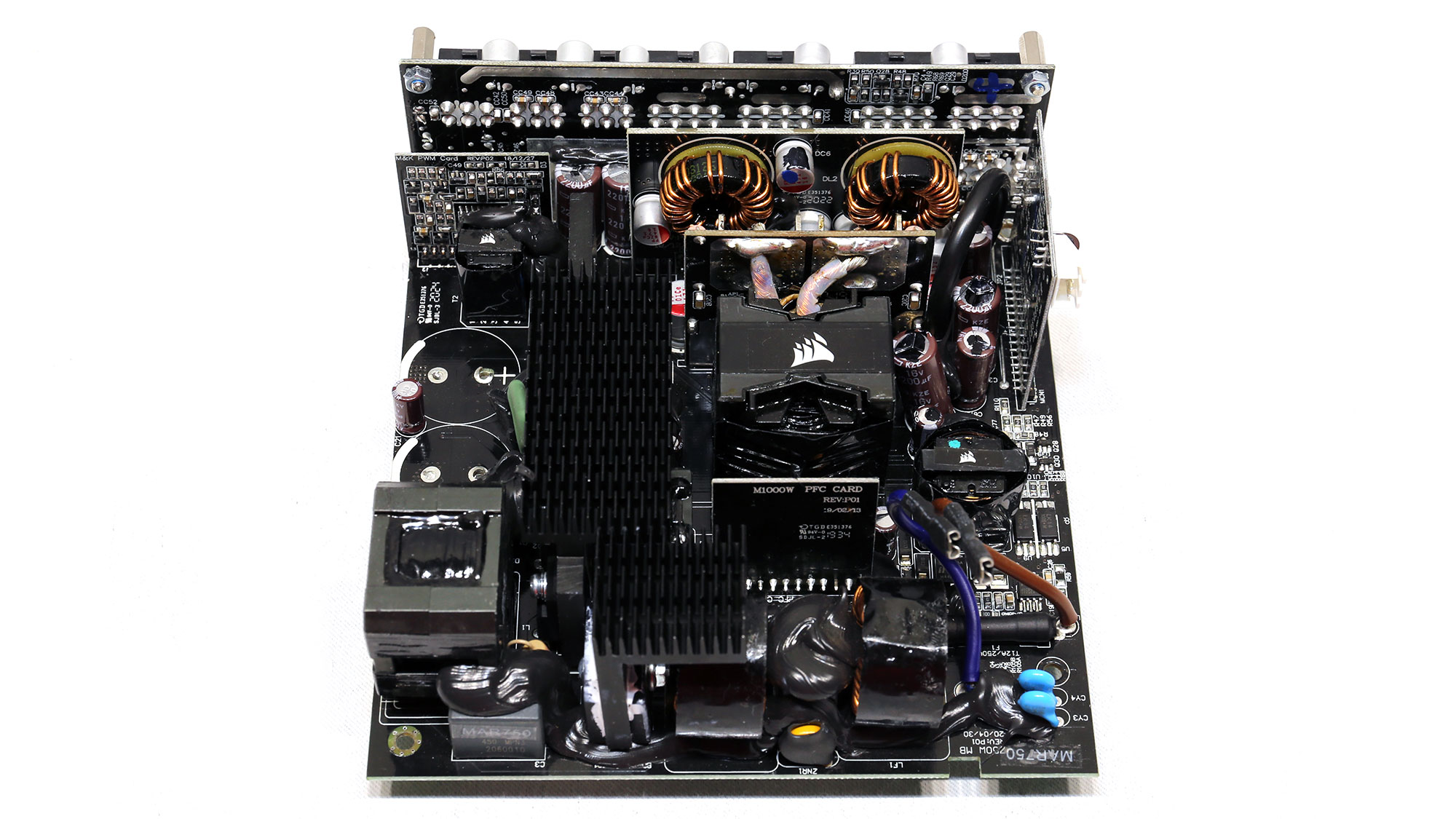
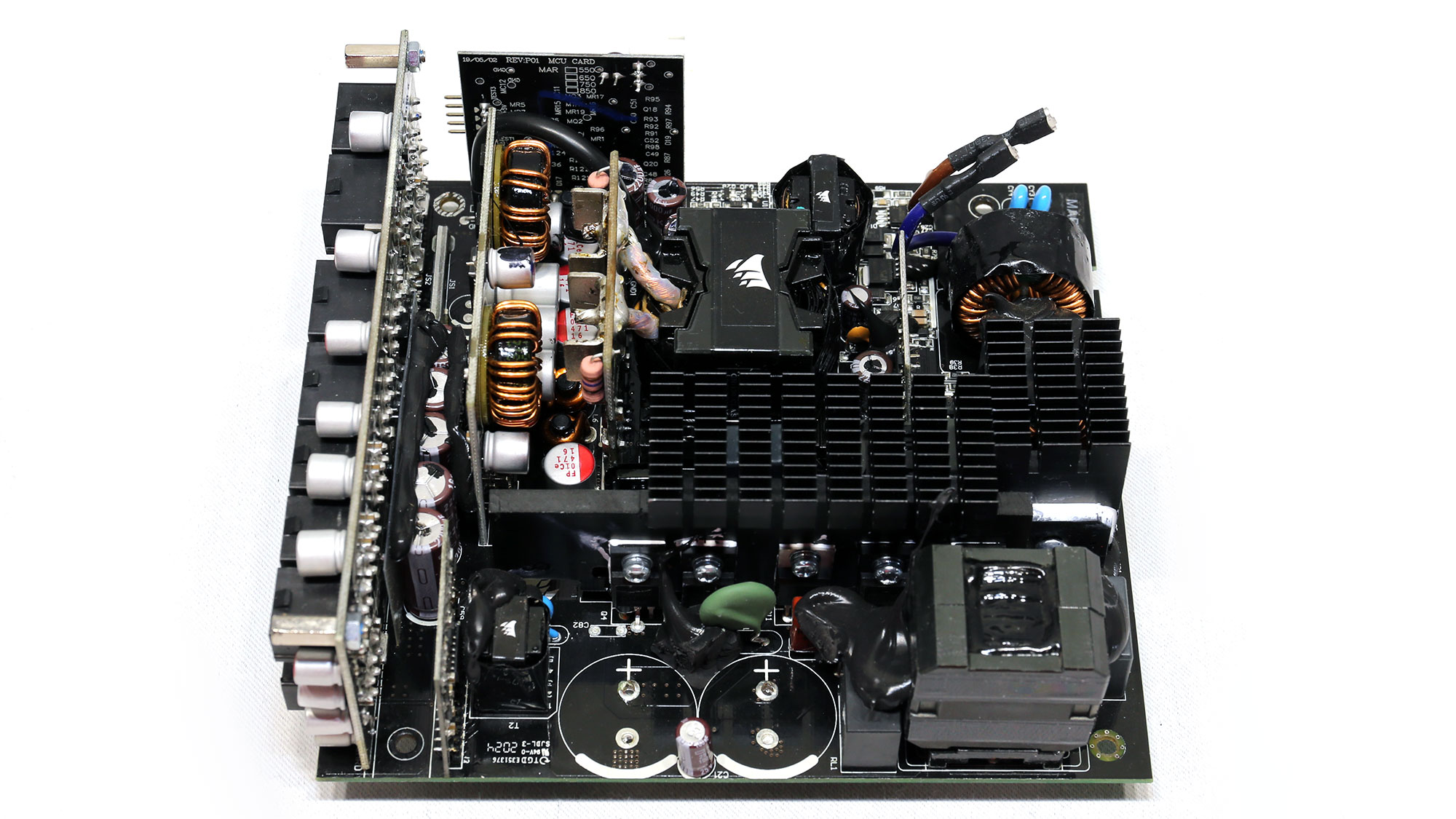
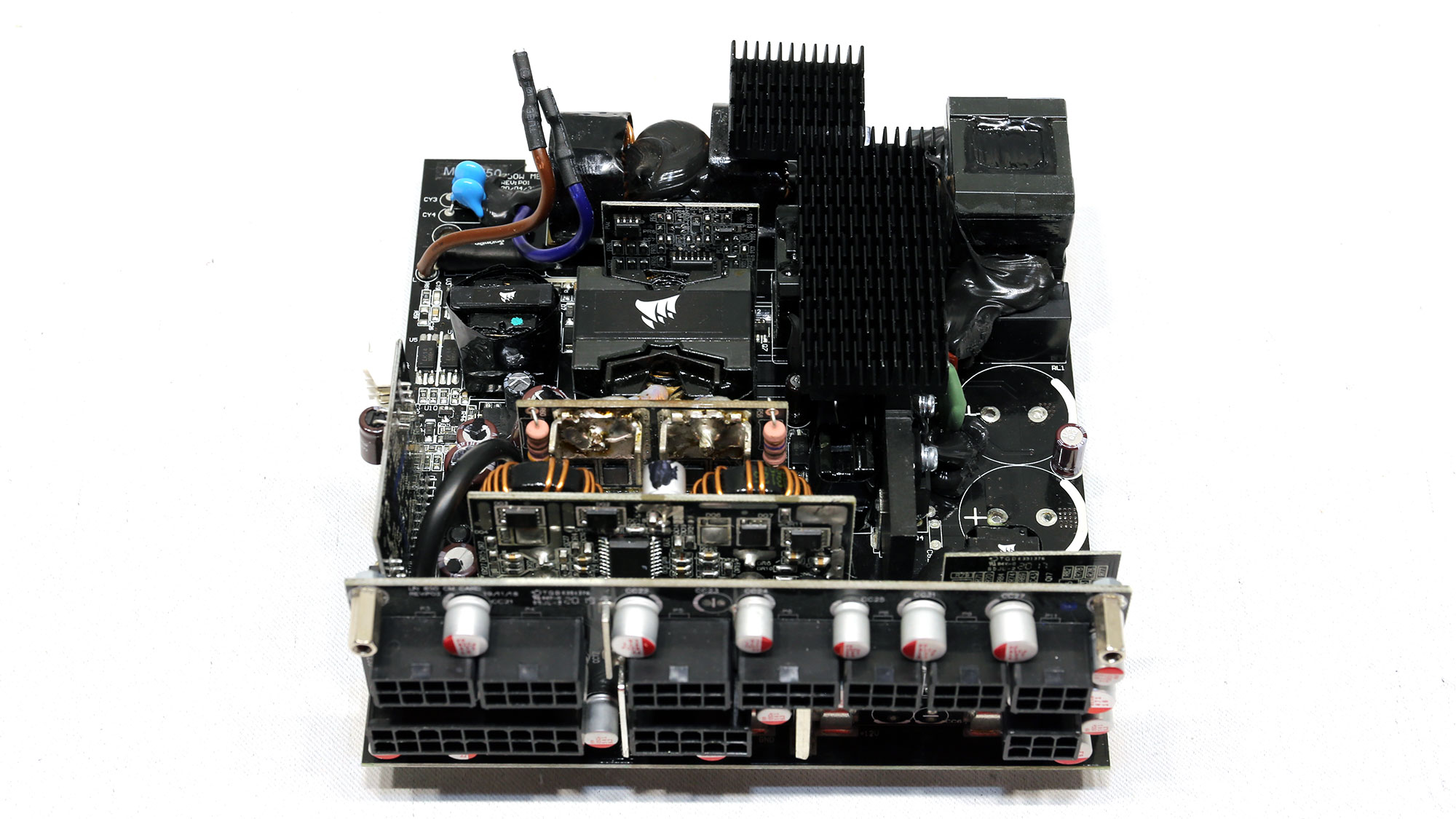
Like the RM1000x model, which we reviewed first, the OEM didn't change, so Channel Well Technology (CWT) makes the new RMx units. The platform has several differences to offer improved performance and ATX v2.52 compatibility. The major change is the new fan, and the PCB's dimensions haven't changed, so there was space for a 140mm fan, allowing for good airflow.
Get Tom's Hardware's best news and in-depth reviews, straight to your inbox.
The build quality is high, and CWT used good parts, including On Semiconductor FETs, Japanese caps by Chemi-Con and Rubycon, and lots of FPCAP polymer caps.
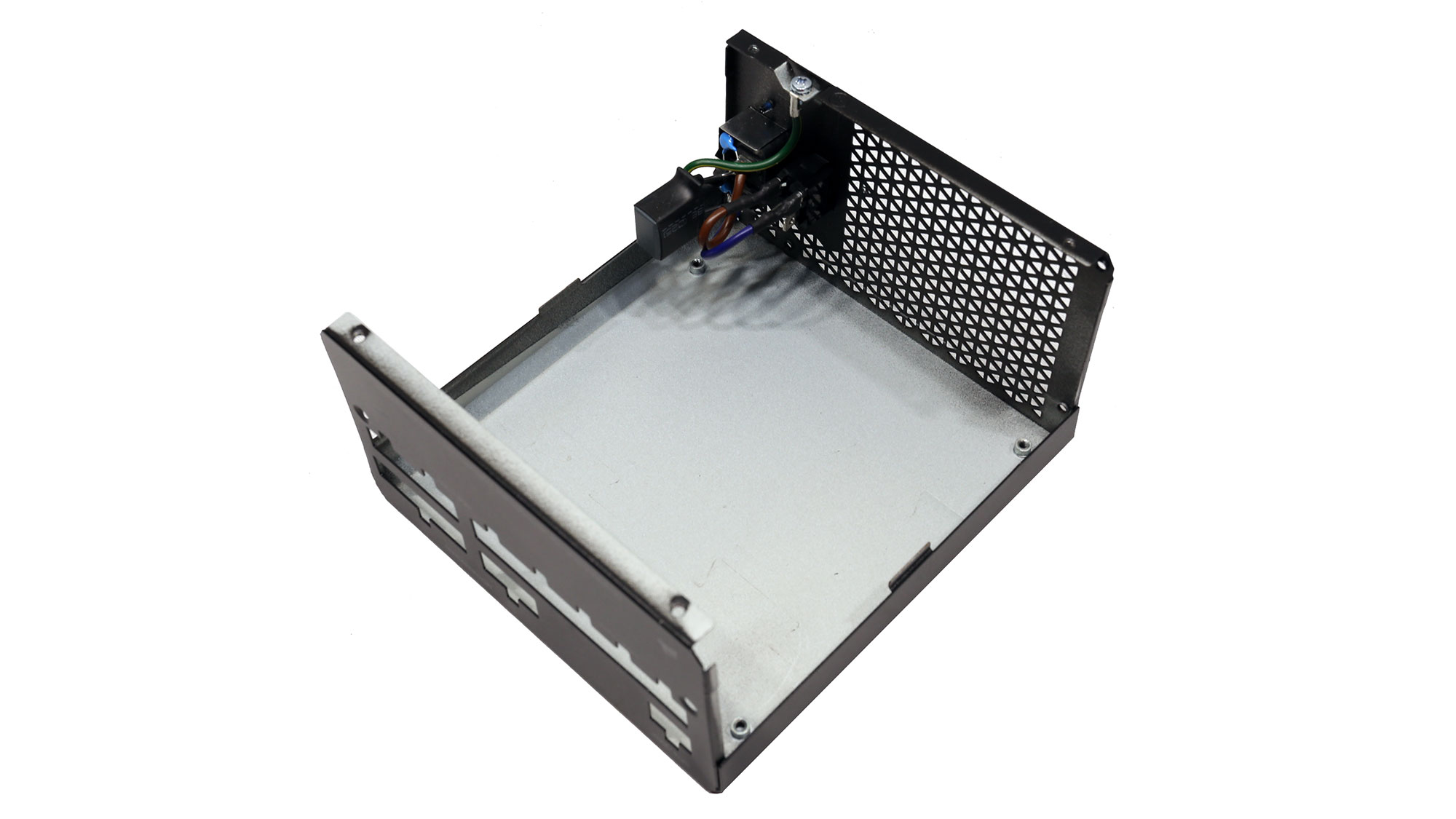
Transient filter
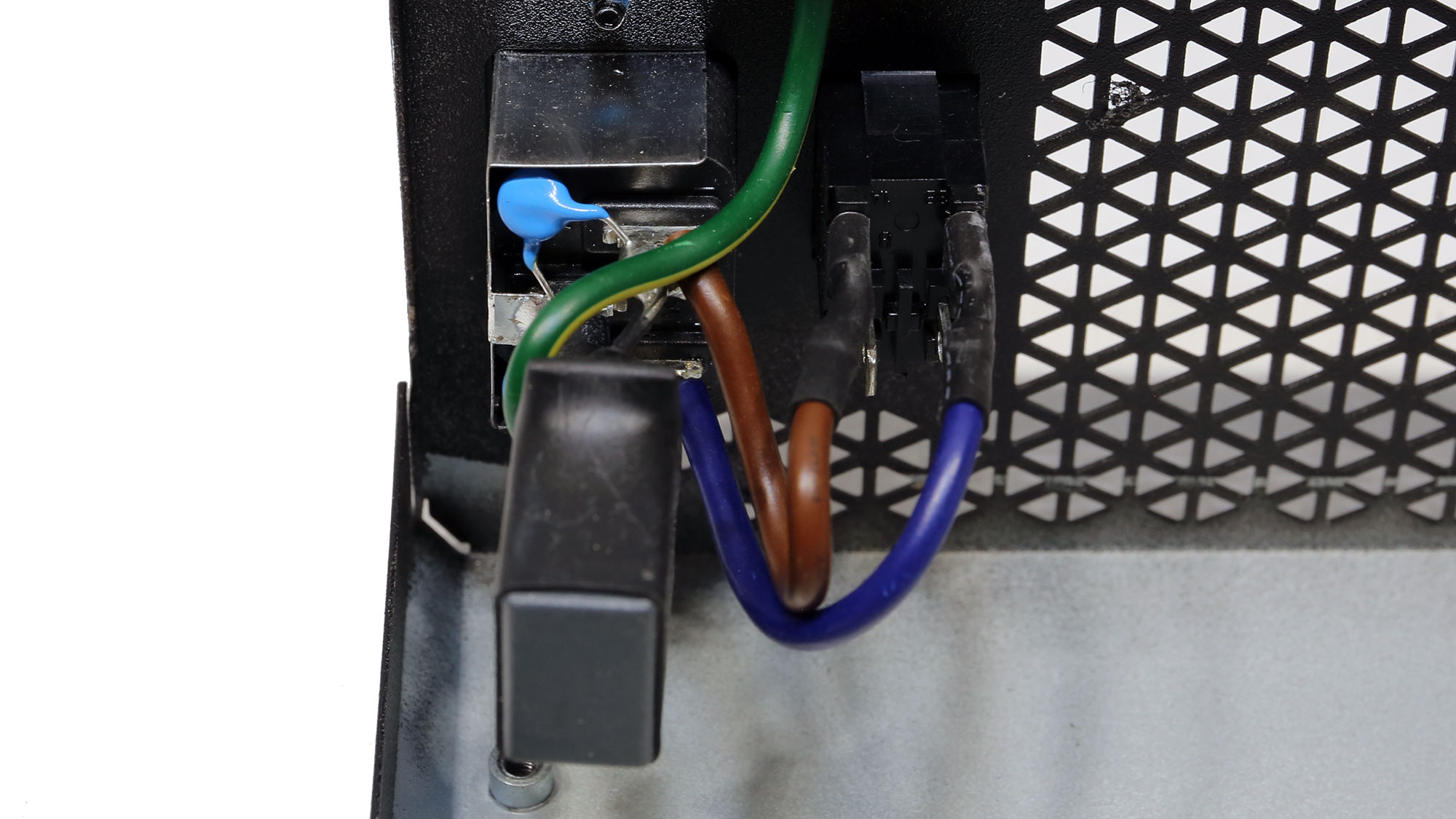
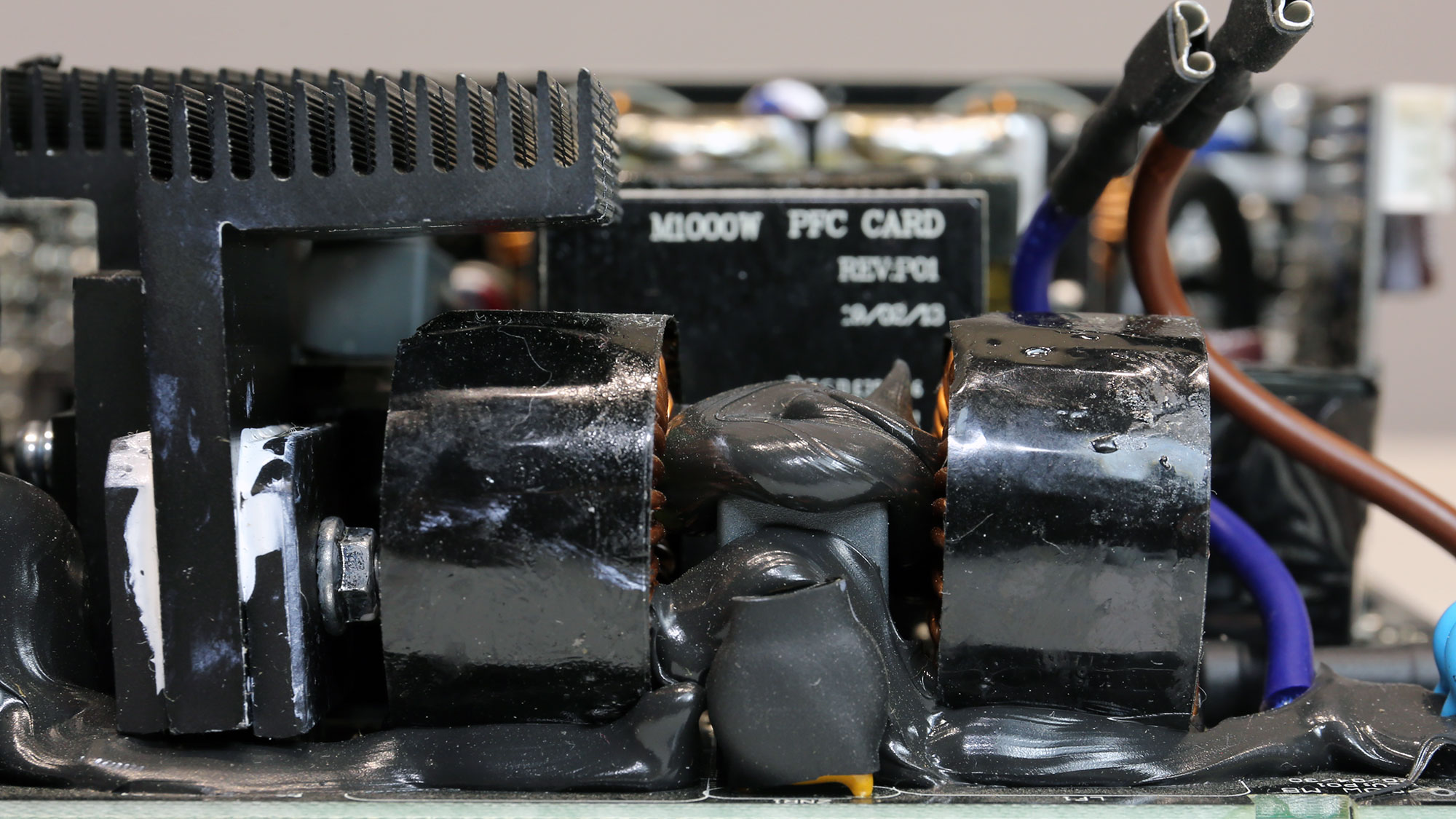
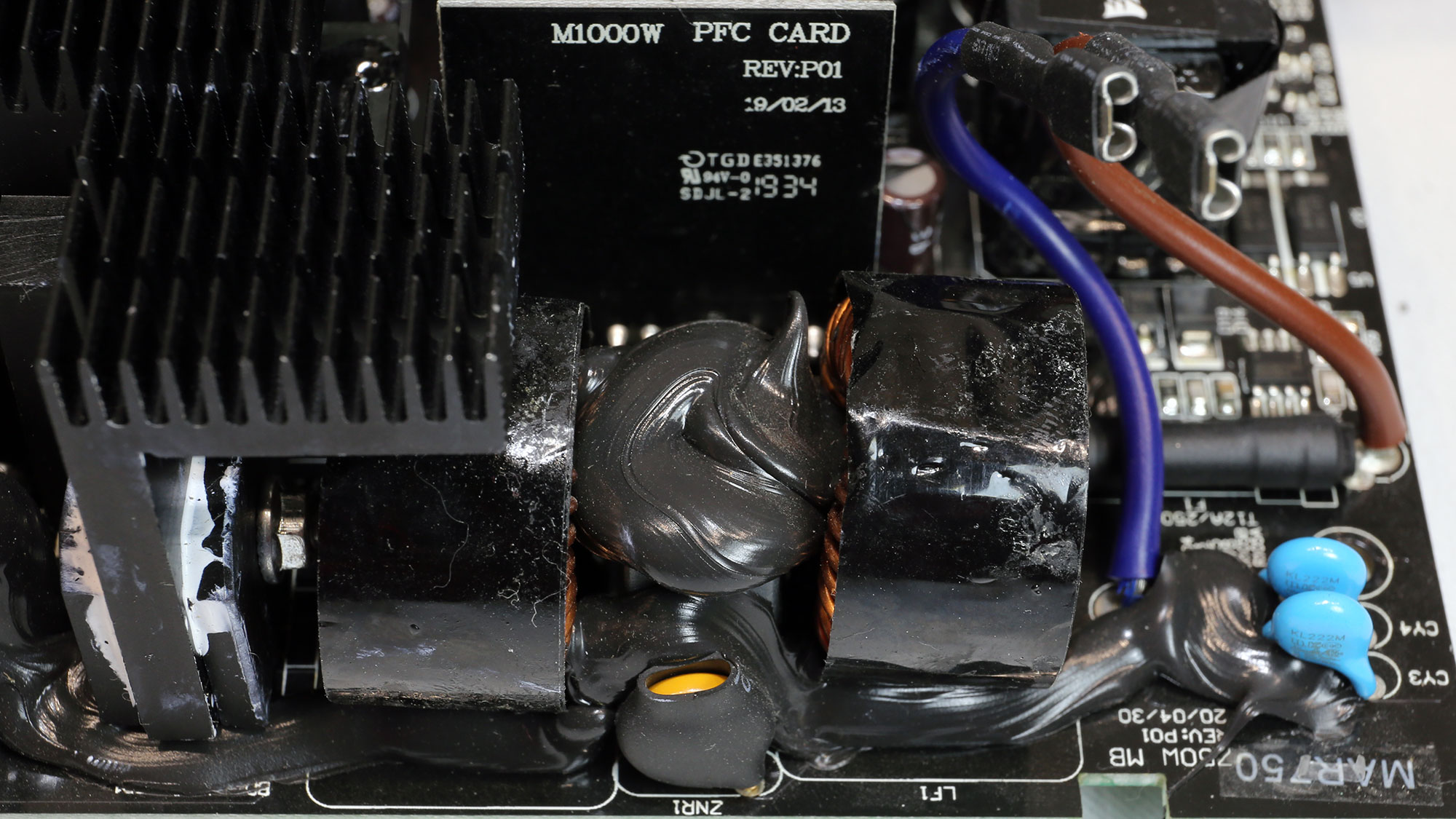
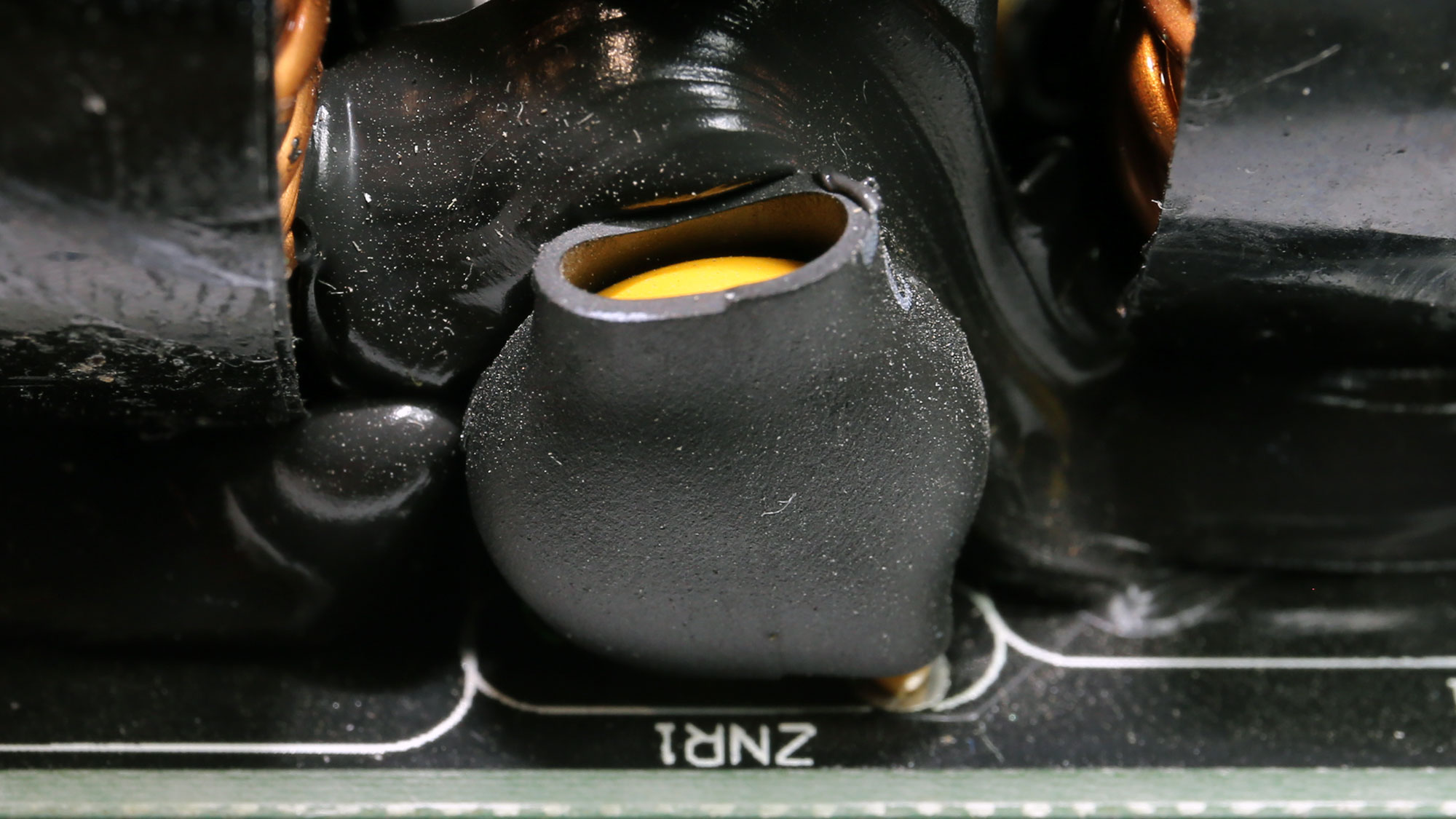
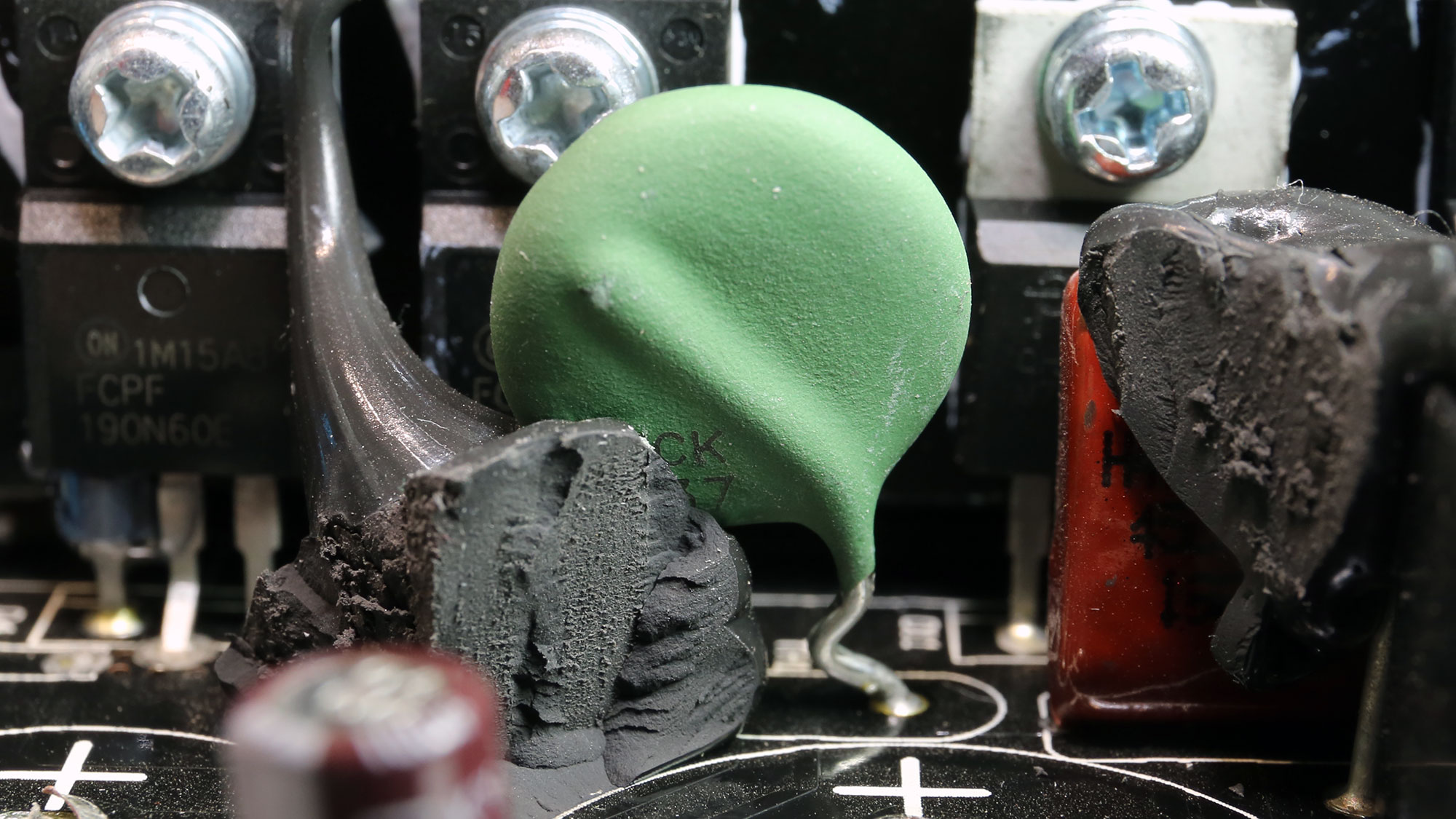
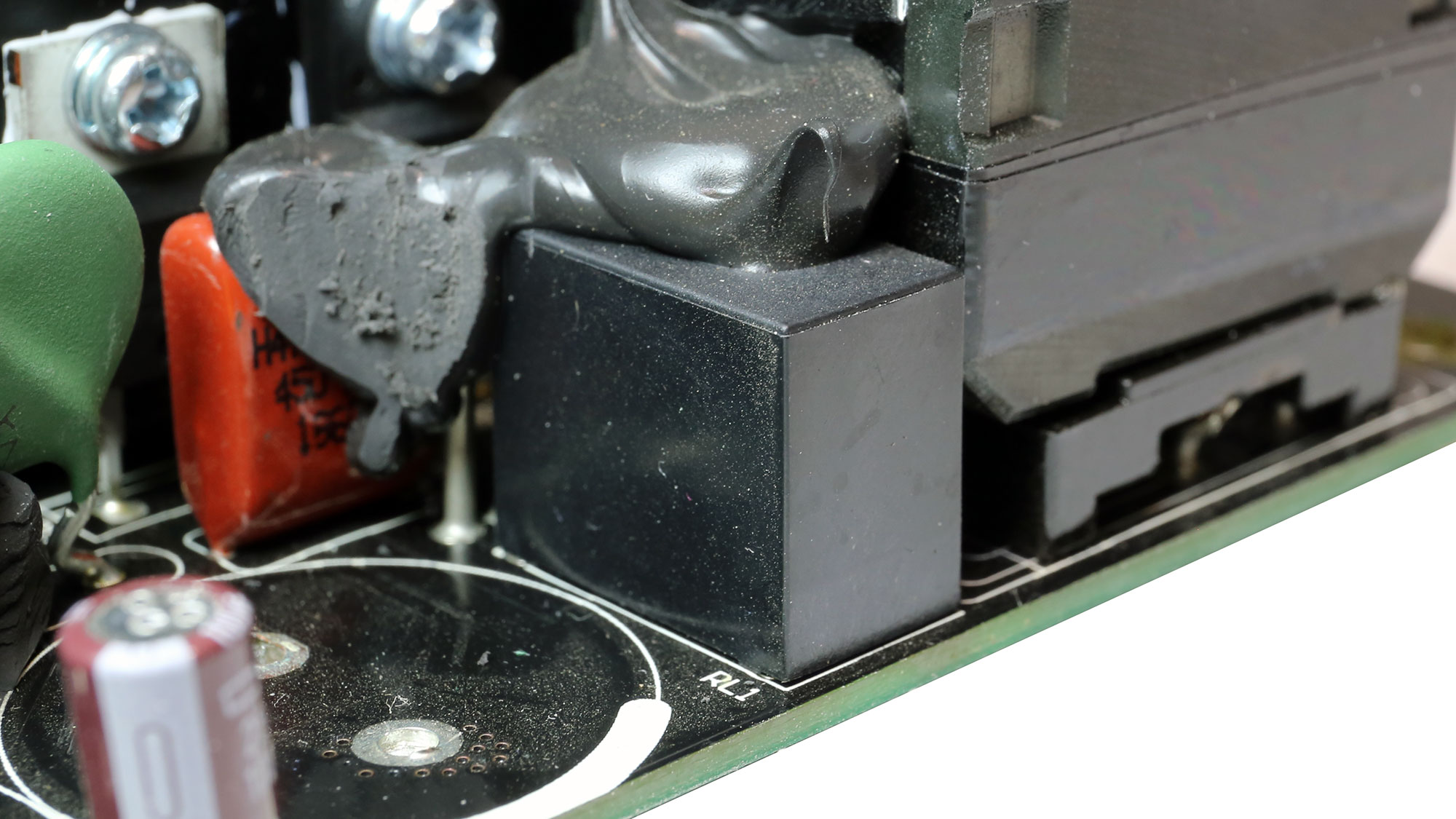
The transient filter has all required parts to provide adequate protection and, at the same time, suppress both incoming and outgoing conducted EMI emissions.
The inrush currents are suppressed by an NTC thermistor and relay combination, which does a good job.
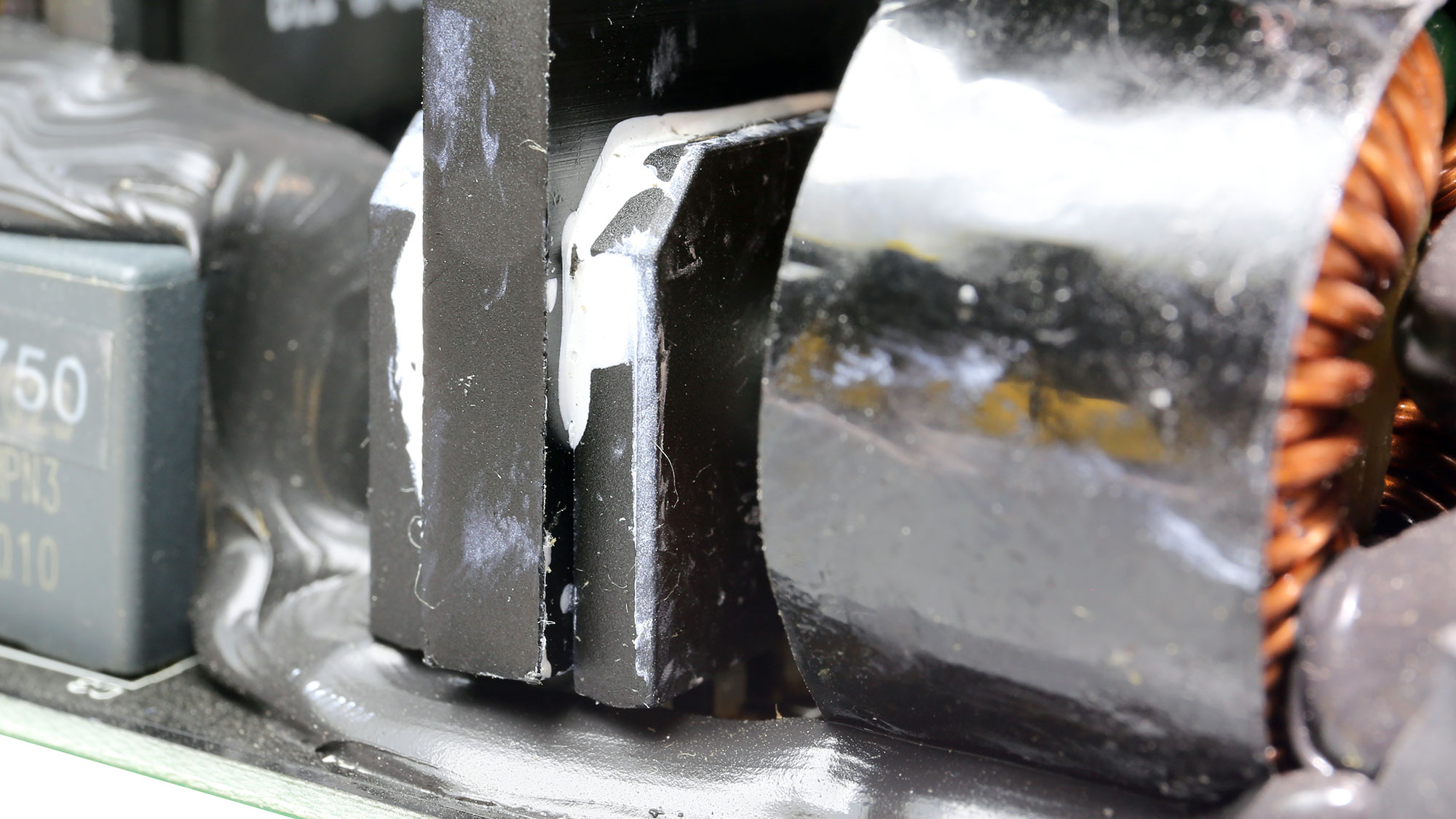
Bridge rectifiers
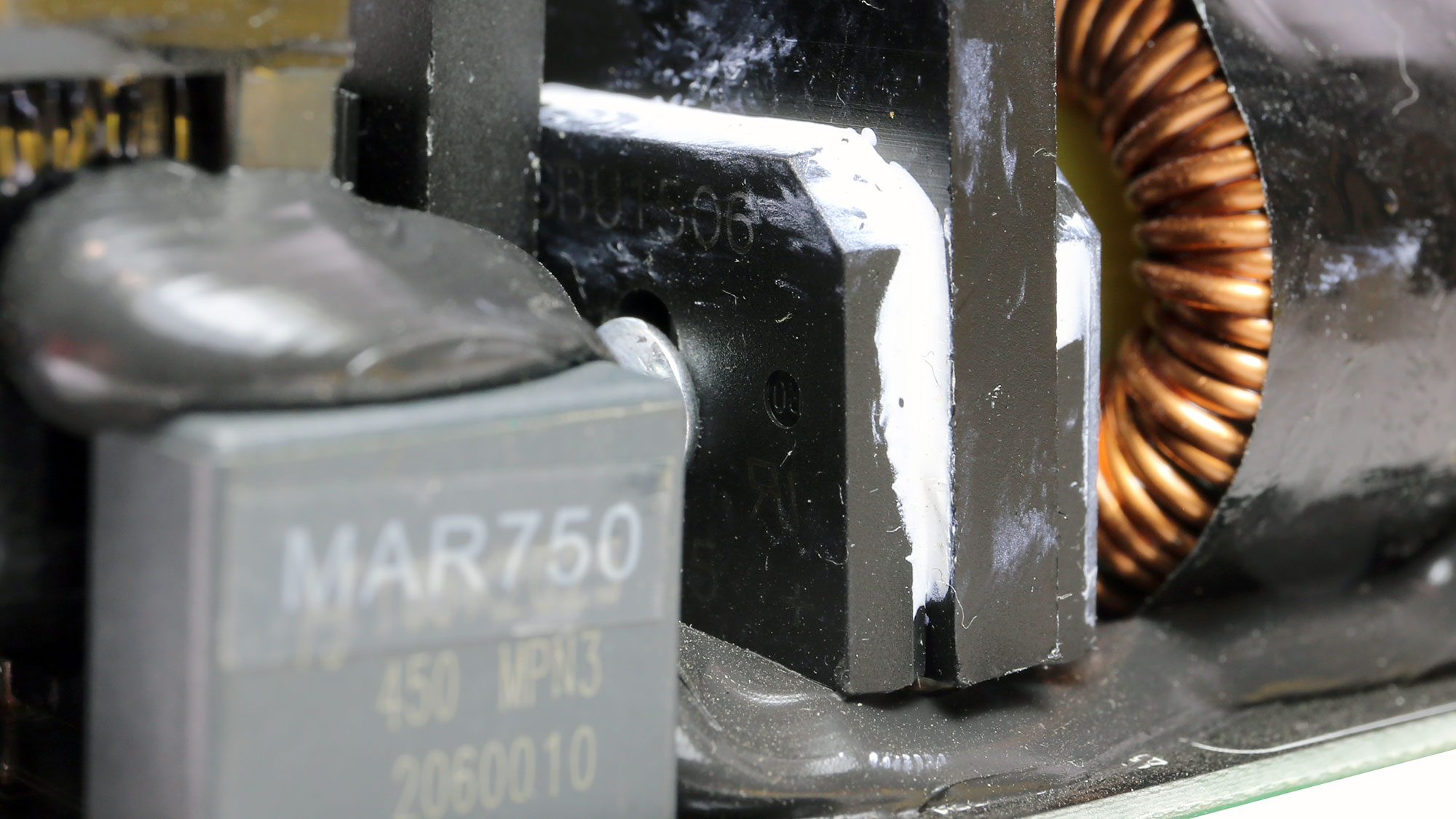
The bridge rectifiers are powerful and are installed on a dedicated heat sink, so they won't get too hot even under high loads and increased operating temperatures.
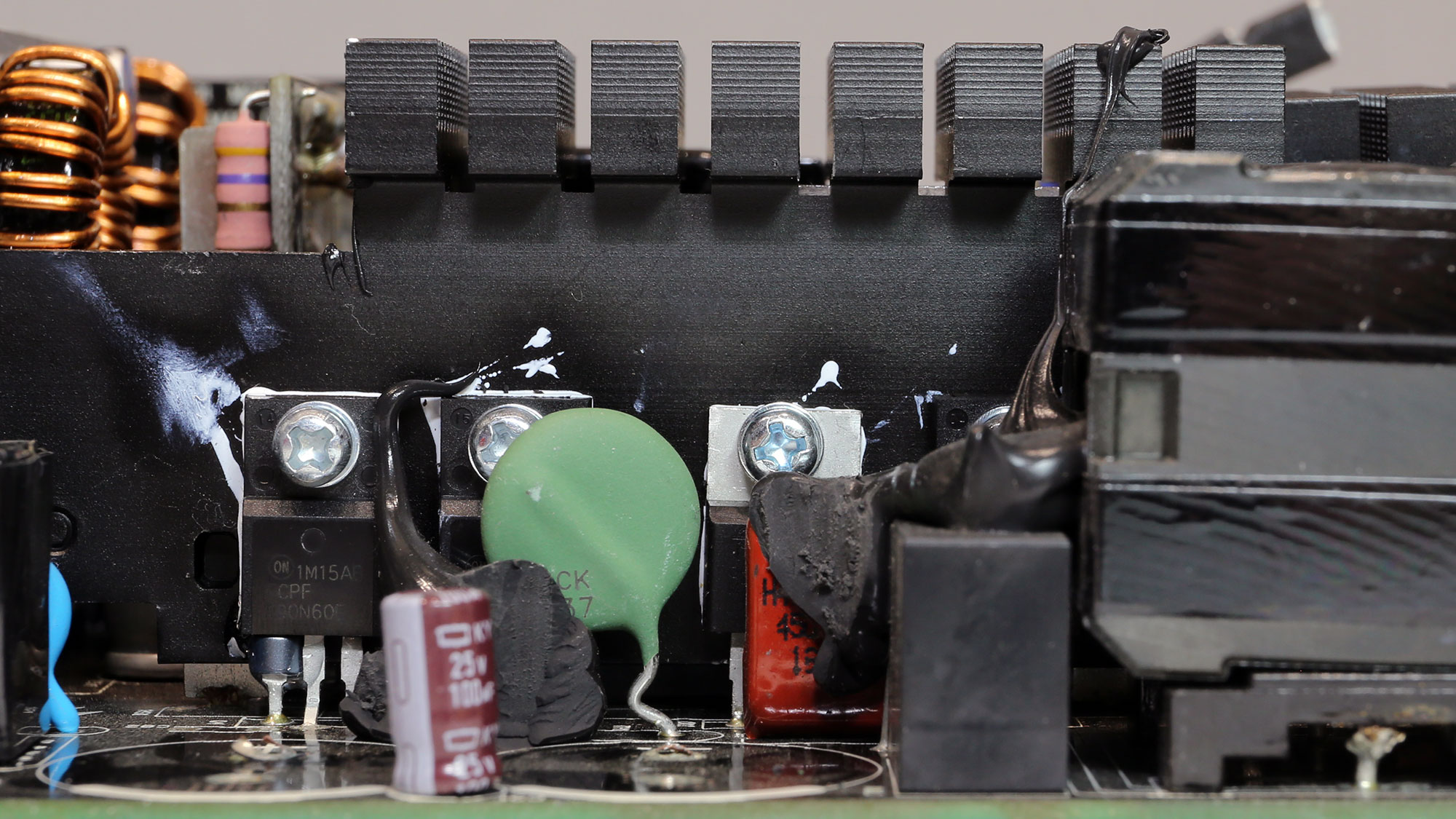
APFC converter
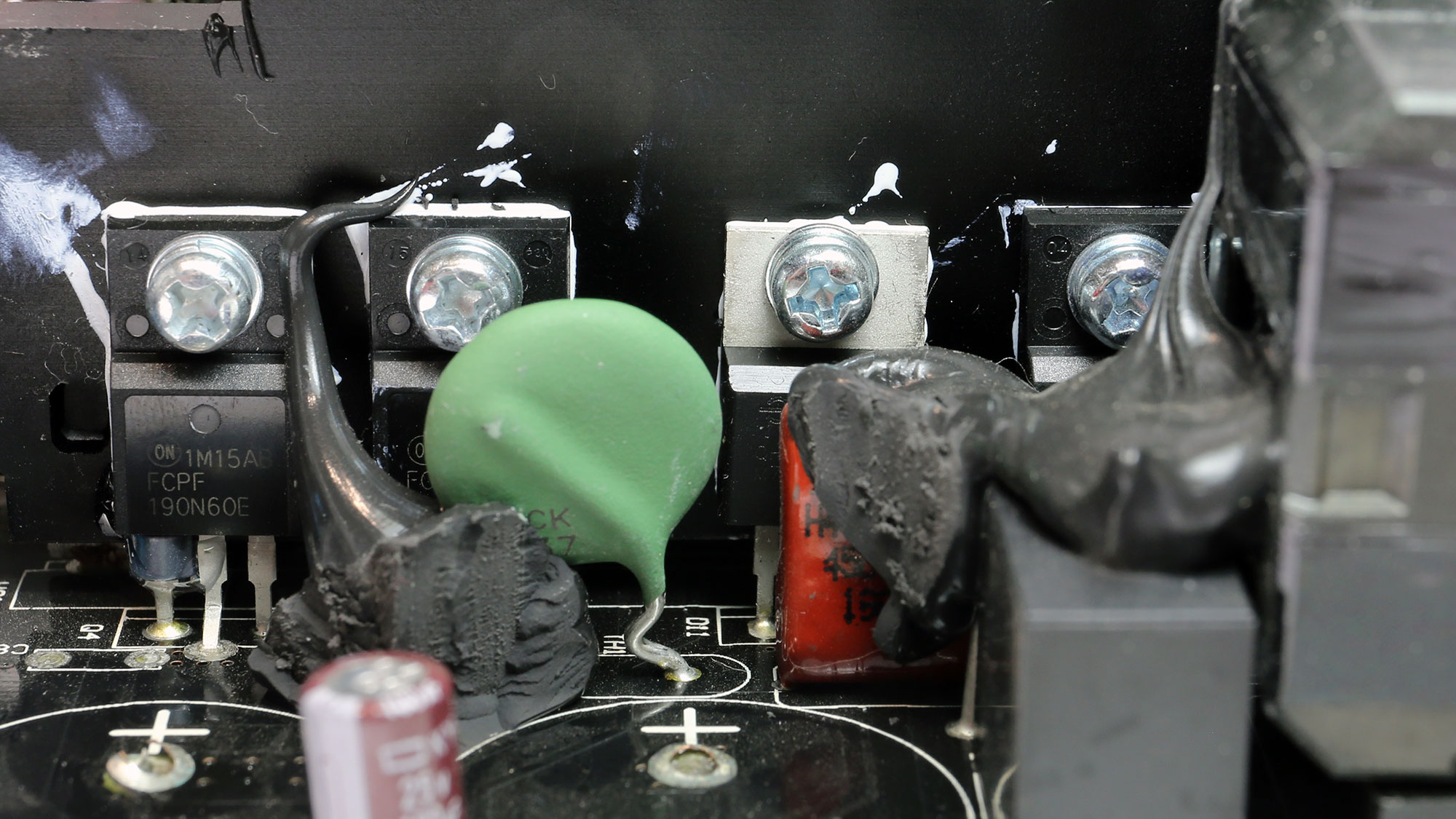
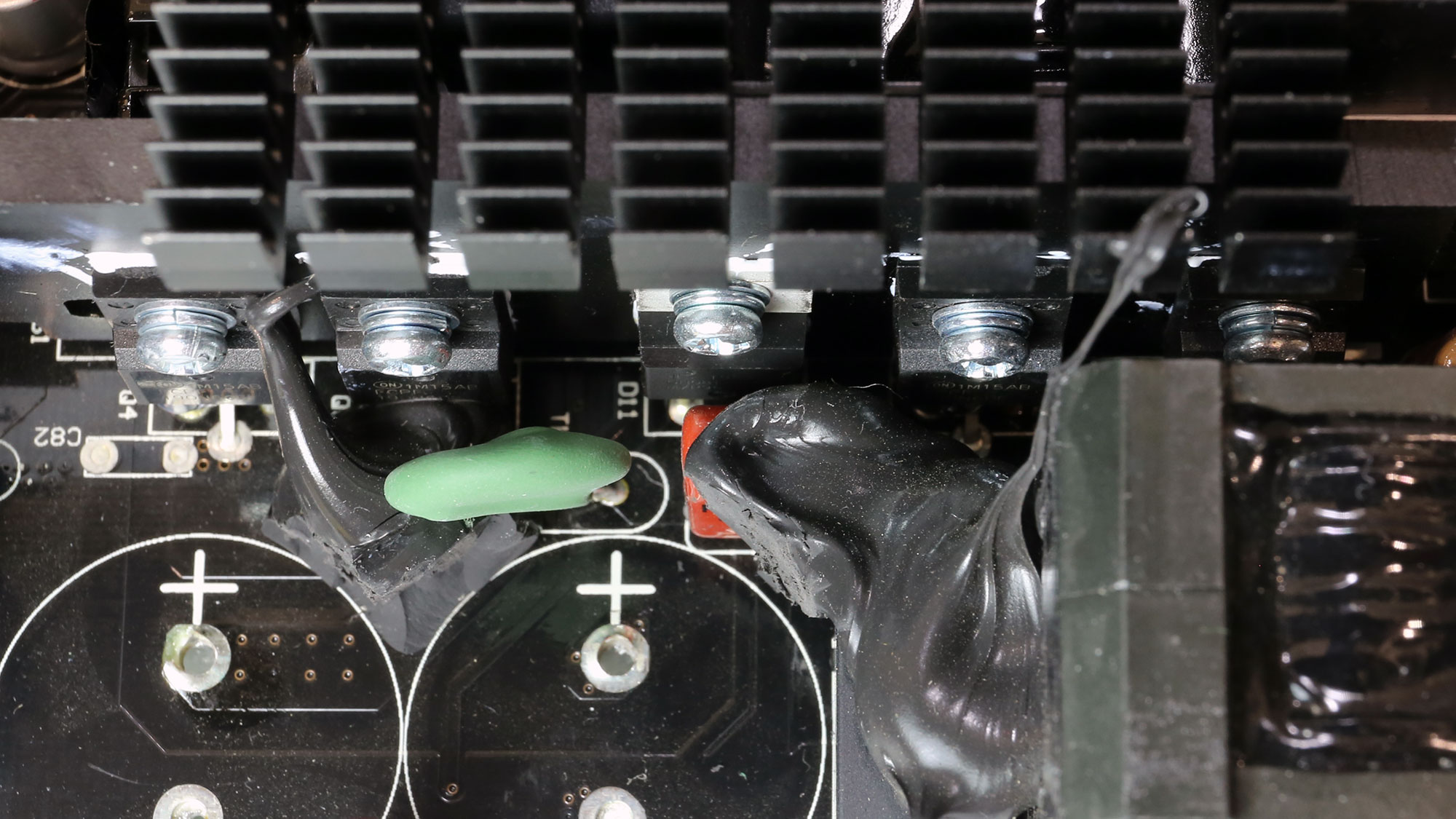
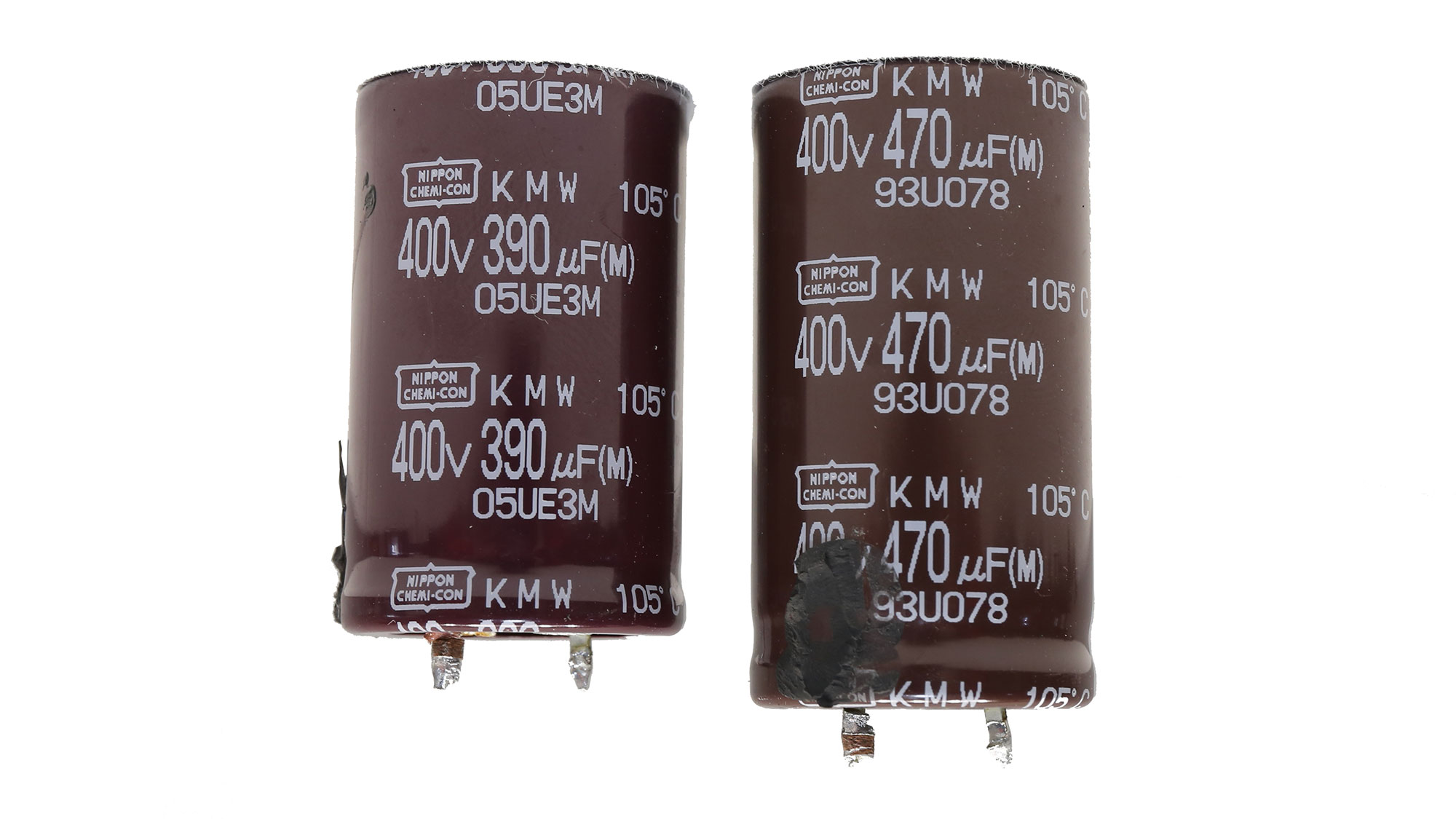
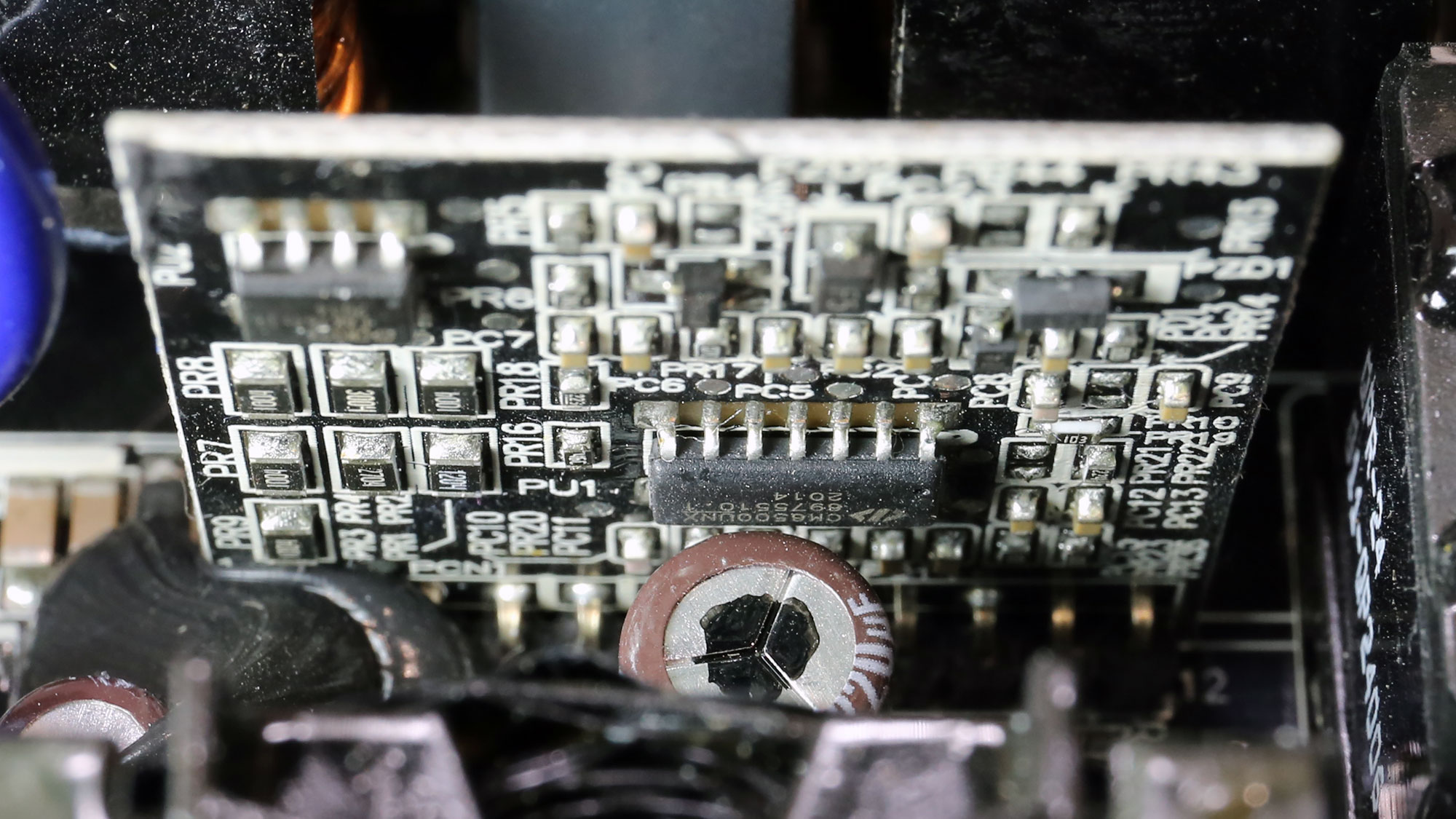
The APFC converter uses two FETs, provided by On Semiconductor, and a single boost diode. The bulk caps are by Chemi-Con, and their combined capacity is high enough to provide for a longer than 26ms hold-up time.
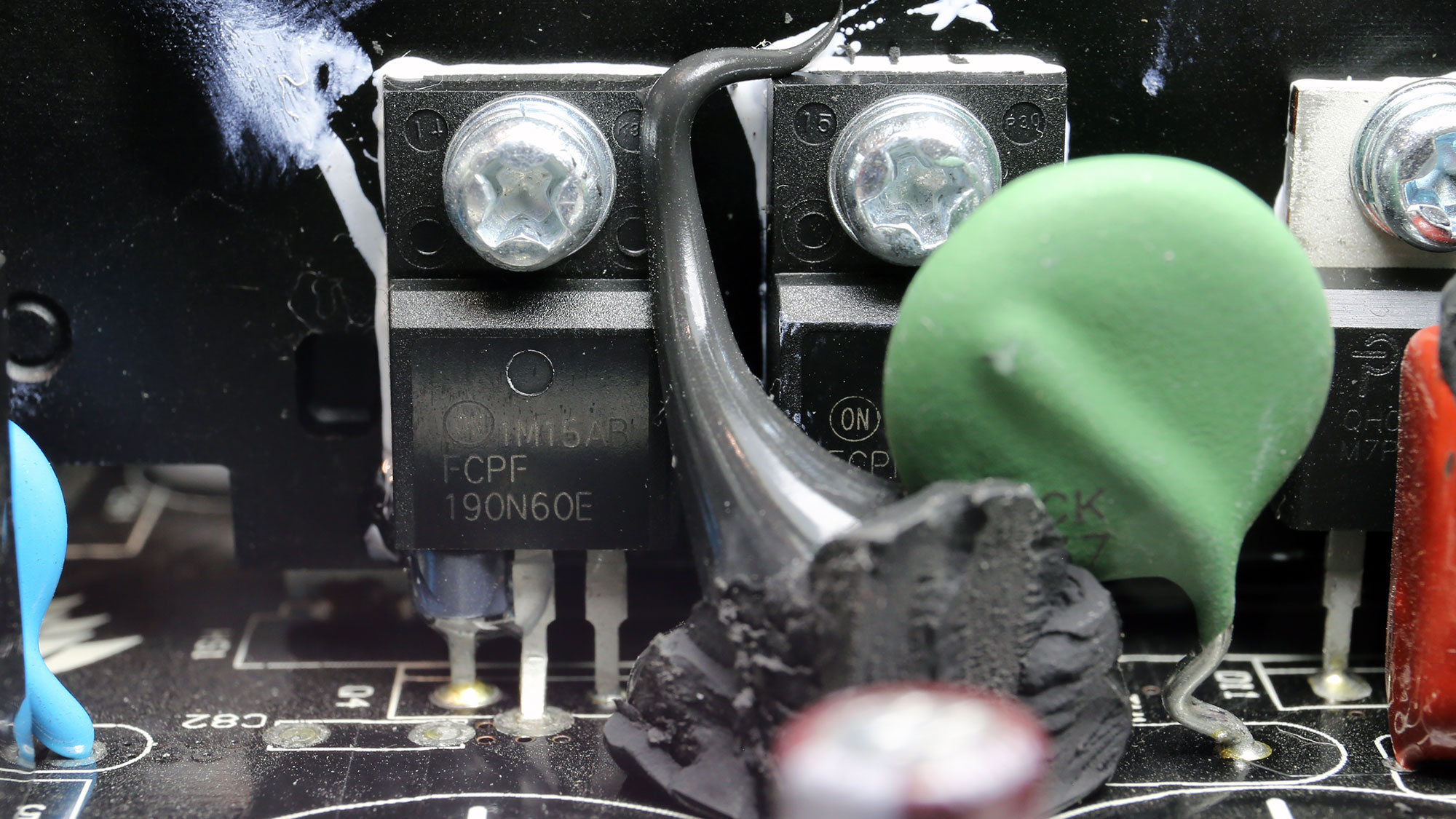
Main FETs and primary transformer
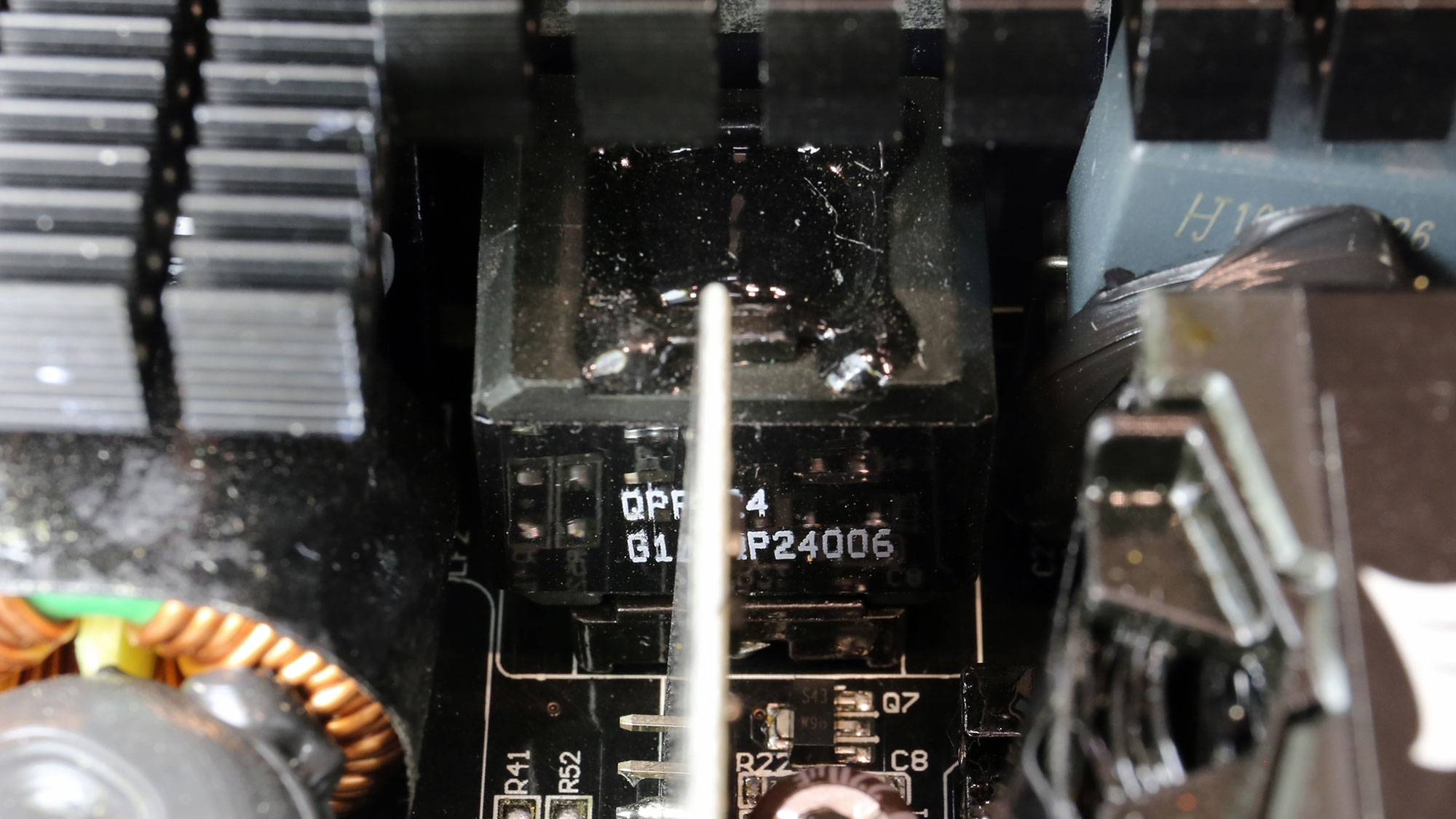
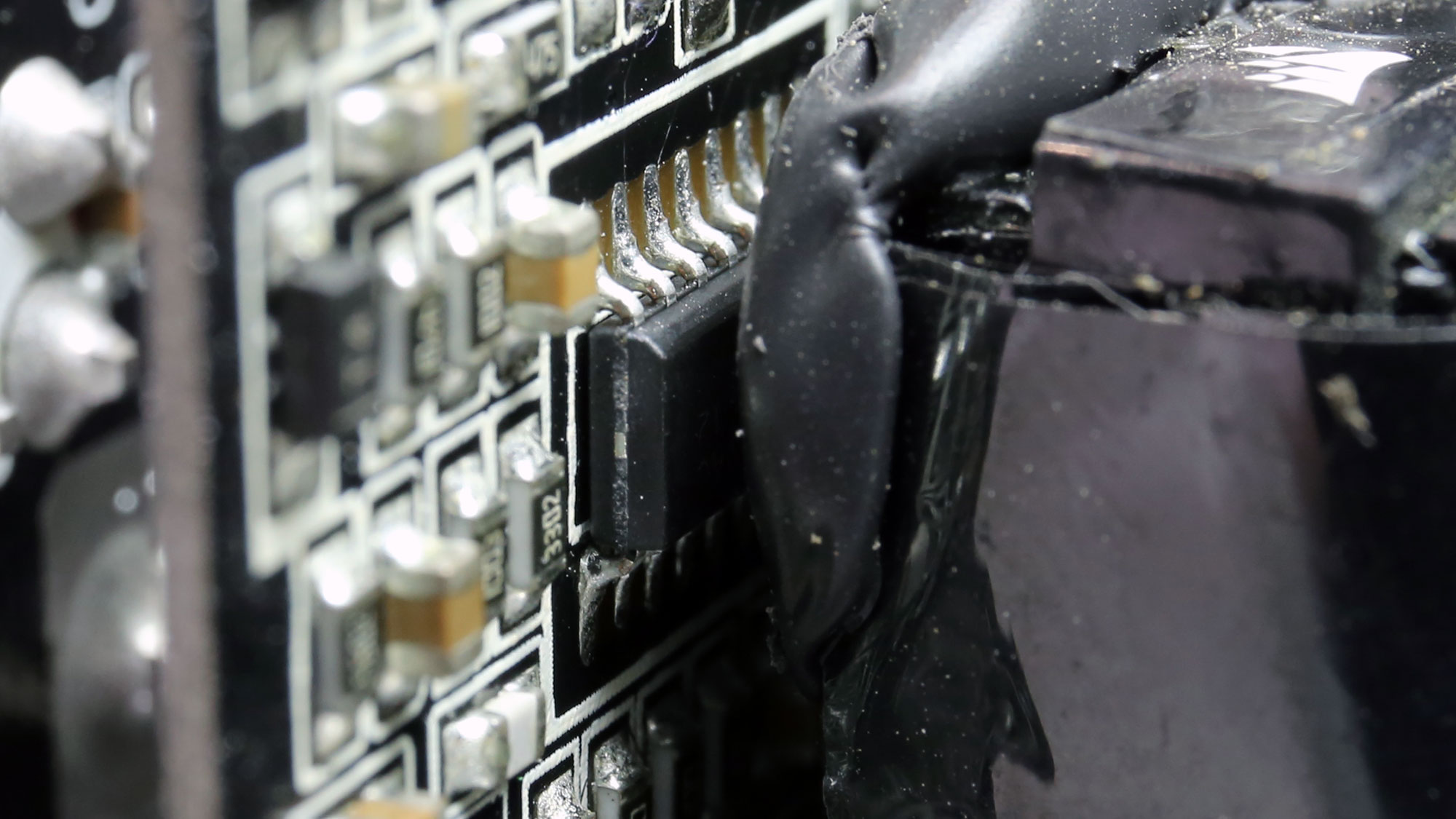
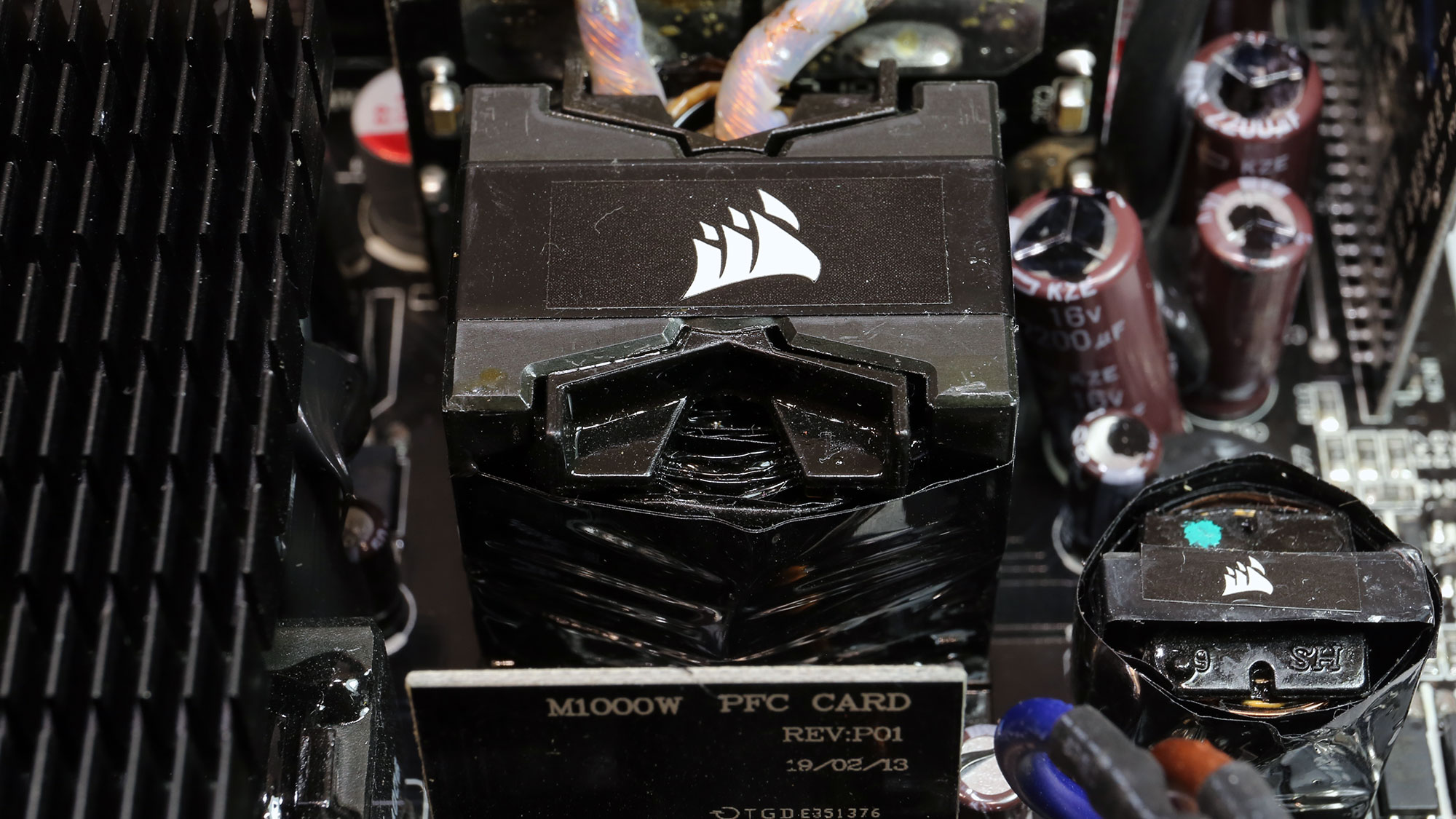
The main FETs are installed in a half-bridge topology, and an LLC resonant converter is also used to boost efficiency. The resonant controller is a Champion CM6901VAC IC.
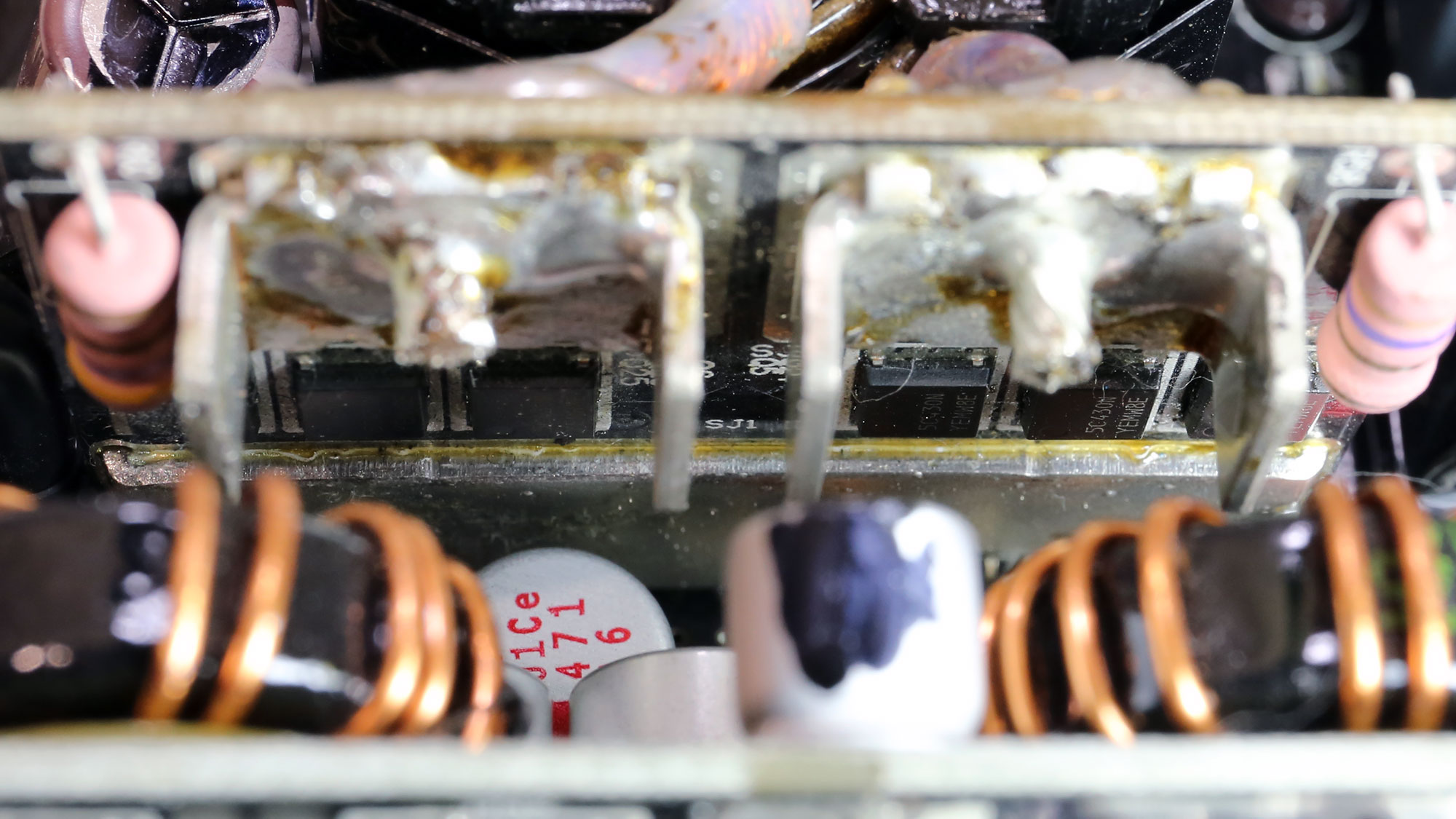
12V FETs and VRMs
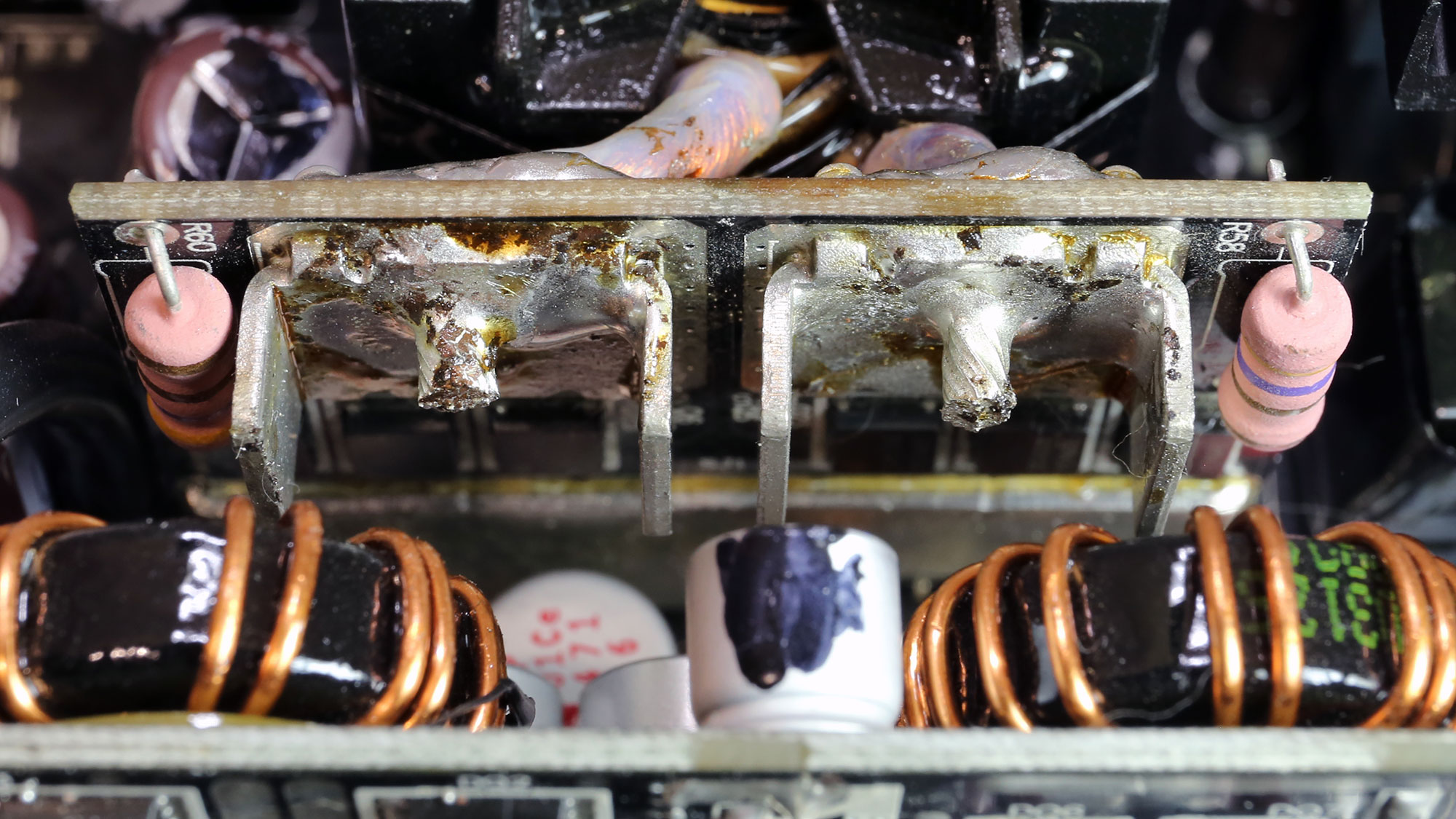
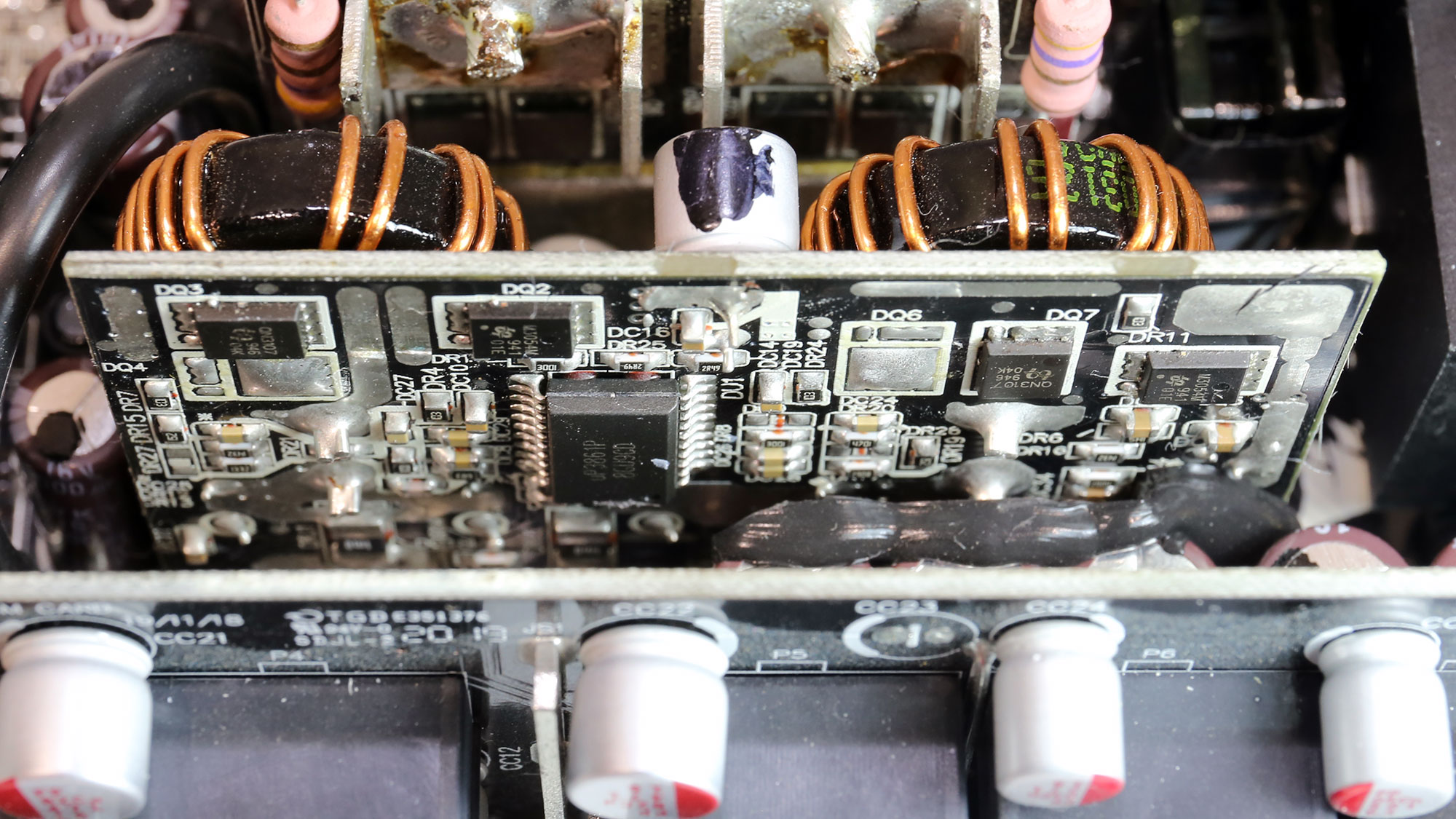
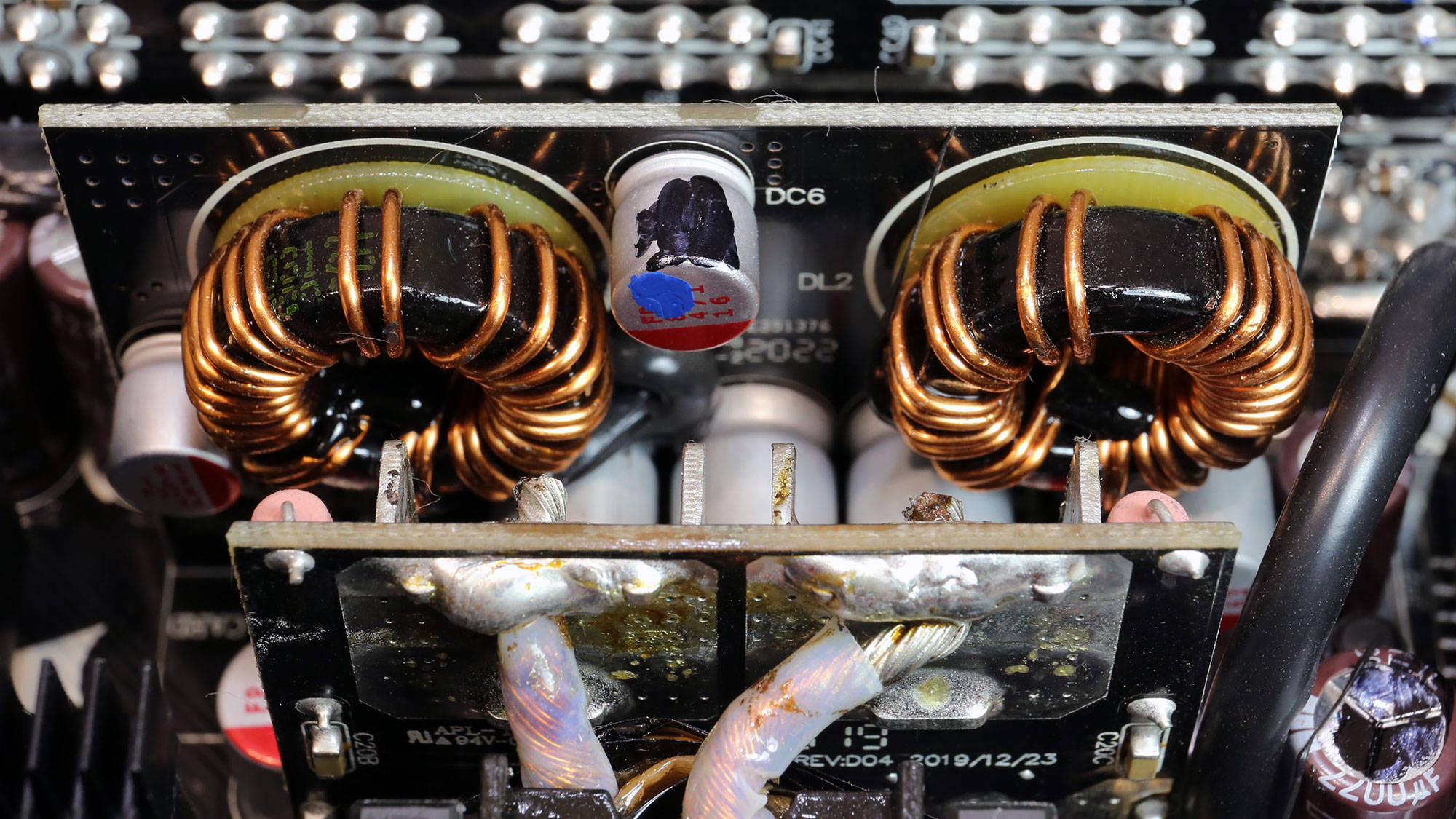
Six FETs regulate the 12V rail while a pair of DC-DC converters generate the minor rails.
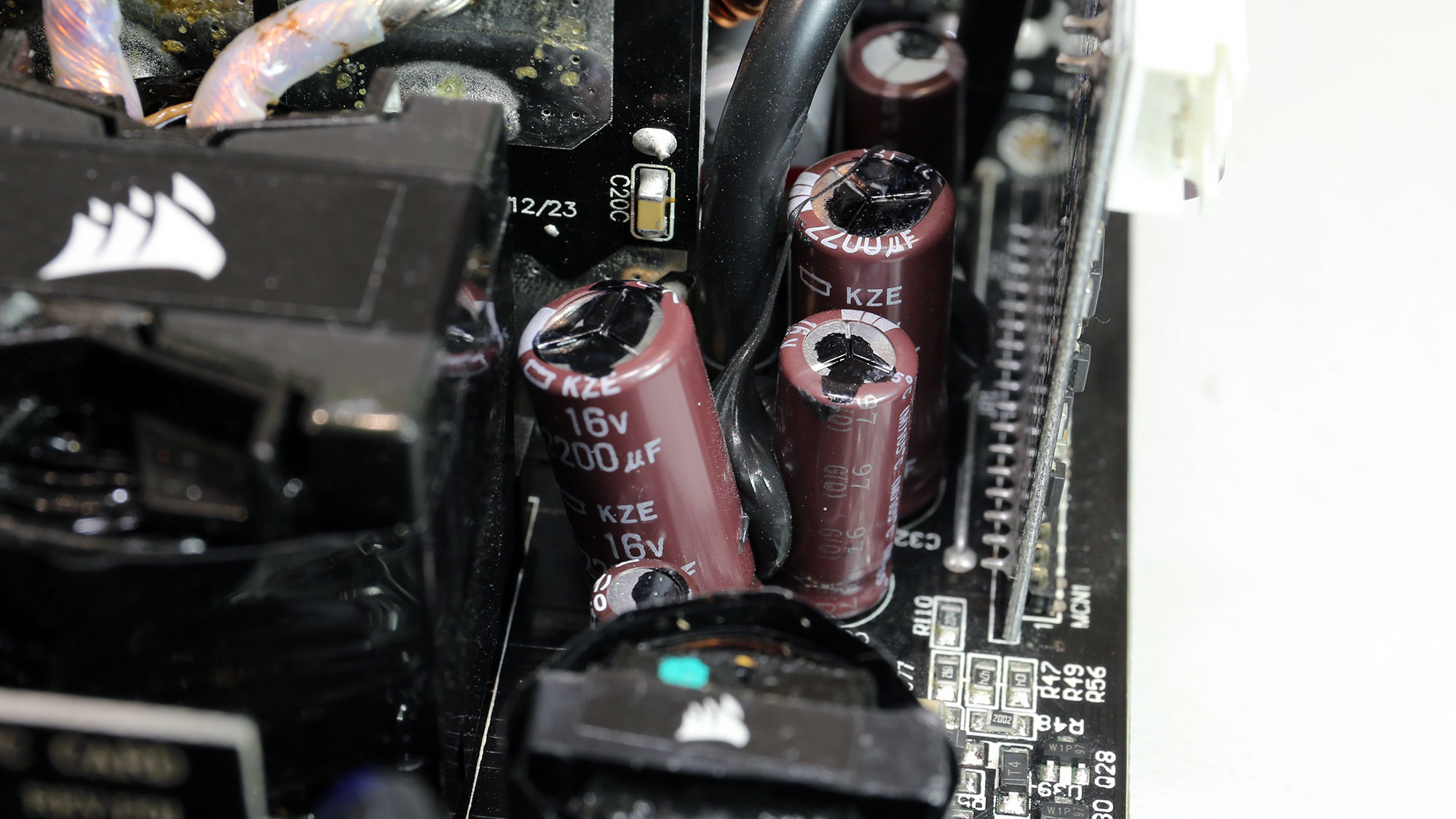
Filtering caps
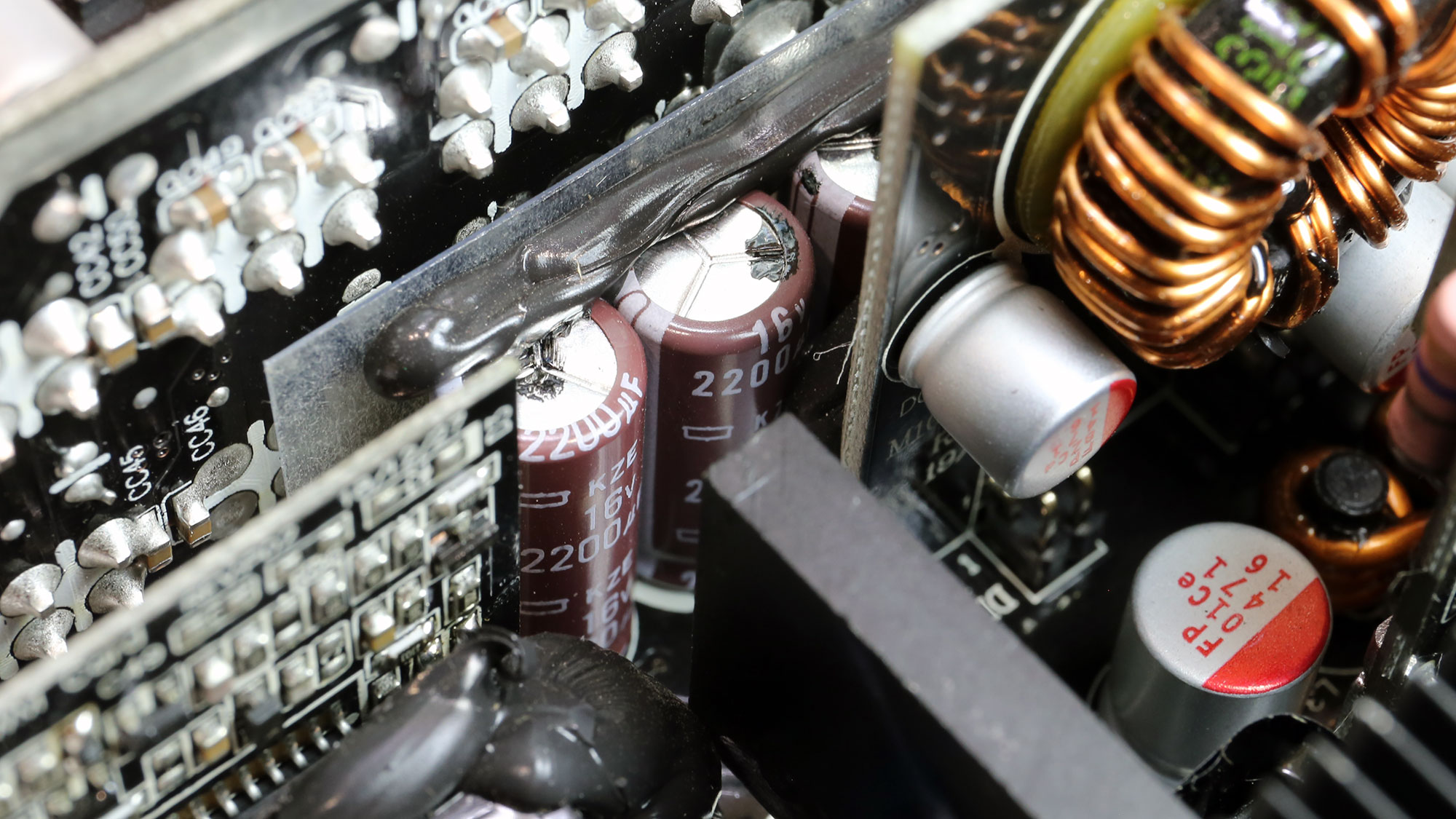
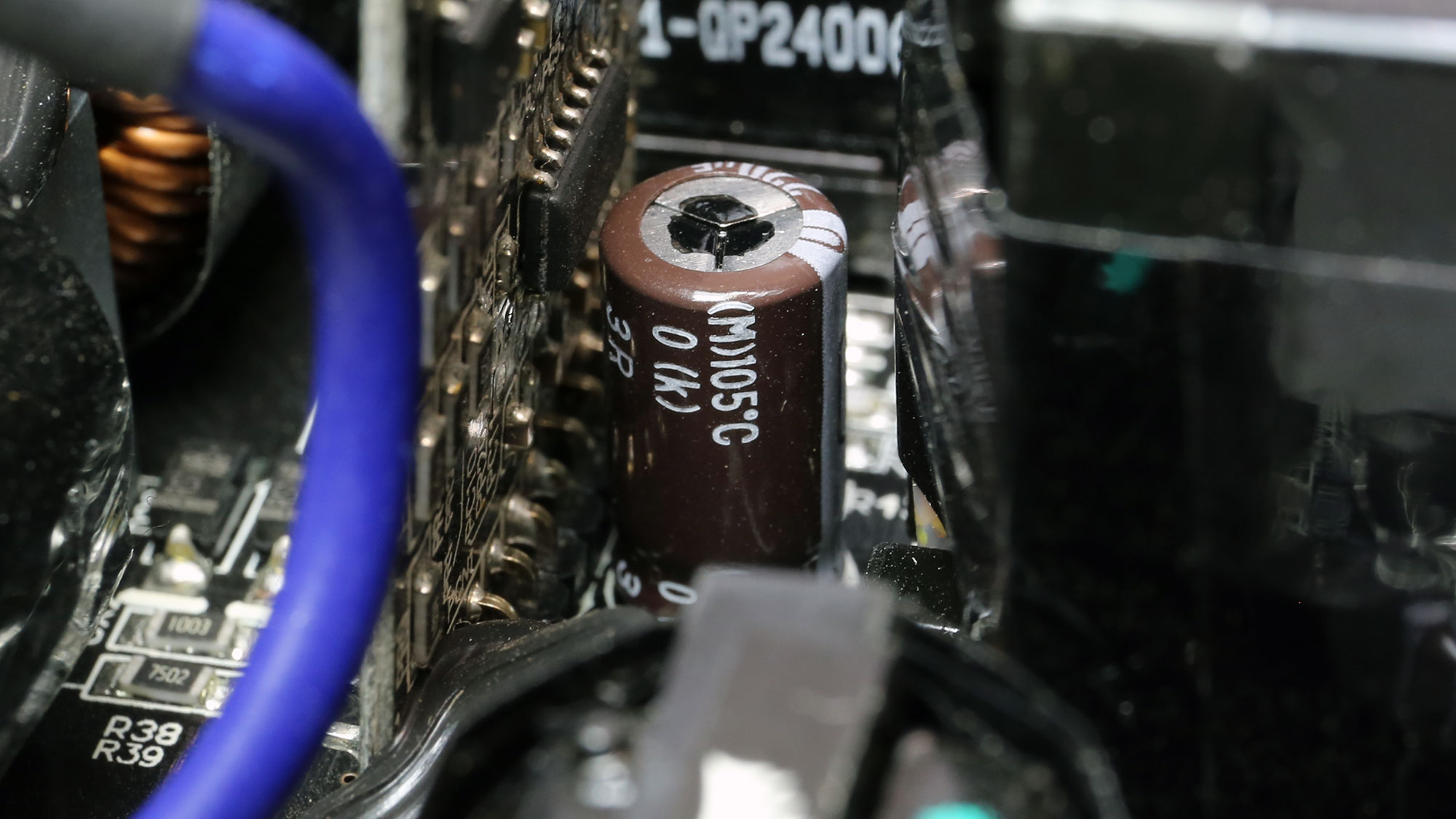
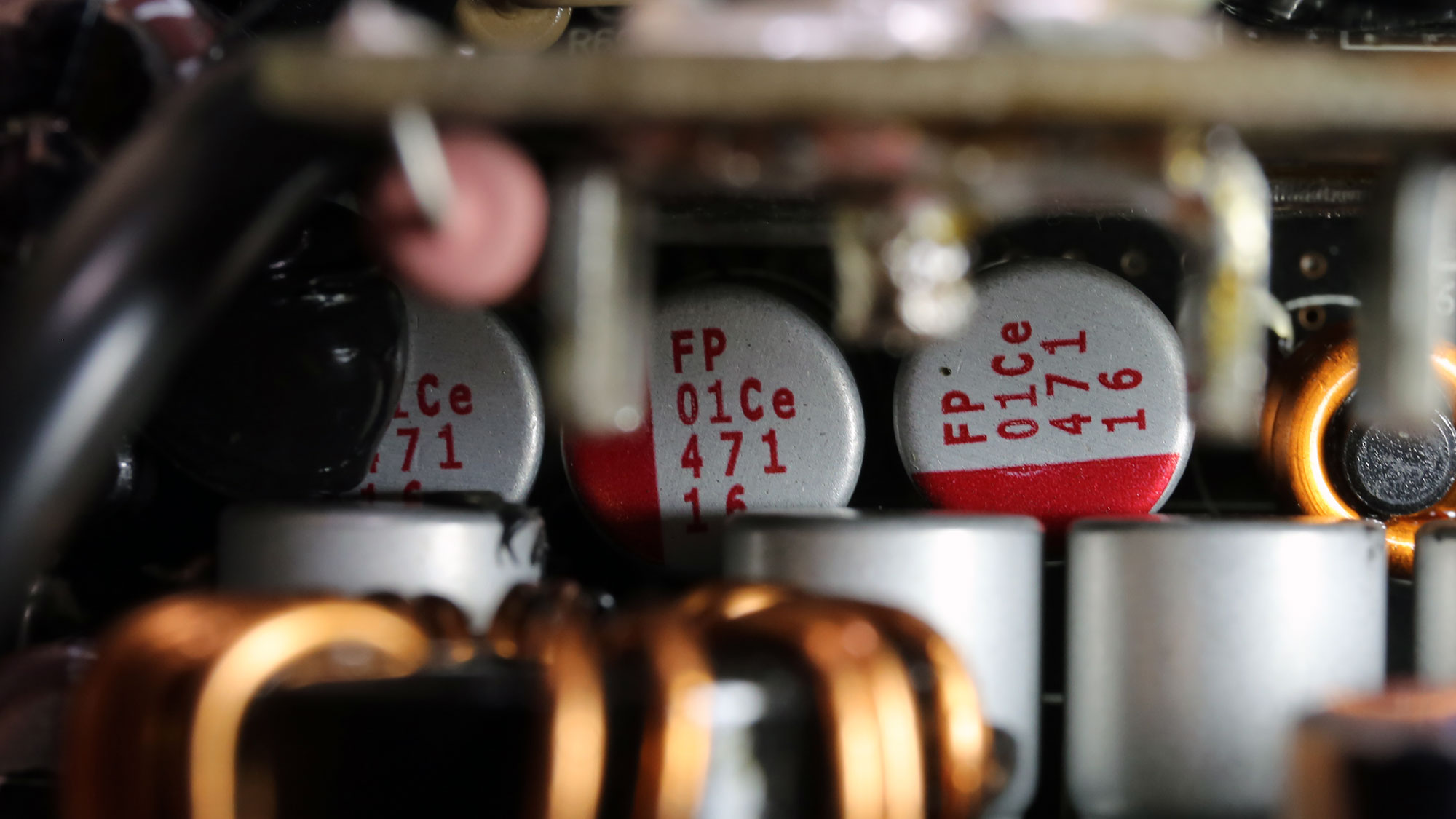
Chemi-Con mostly provides the filtering caps, so there won't be any issues in the long run. Besides electrolytic caps, we also find a large number of polymer ones by FPCAP.
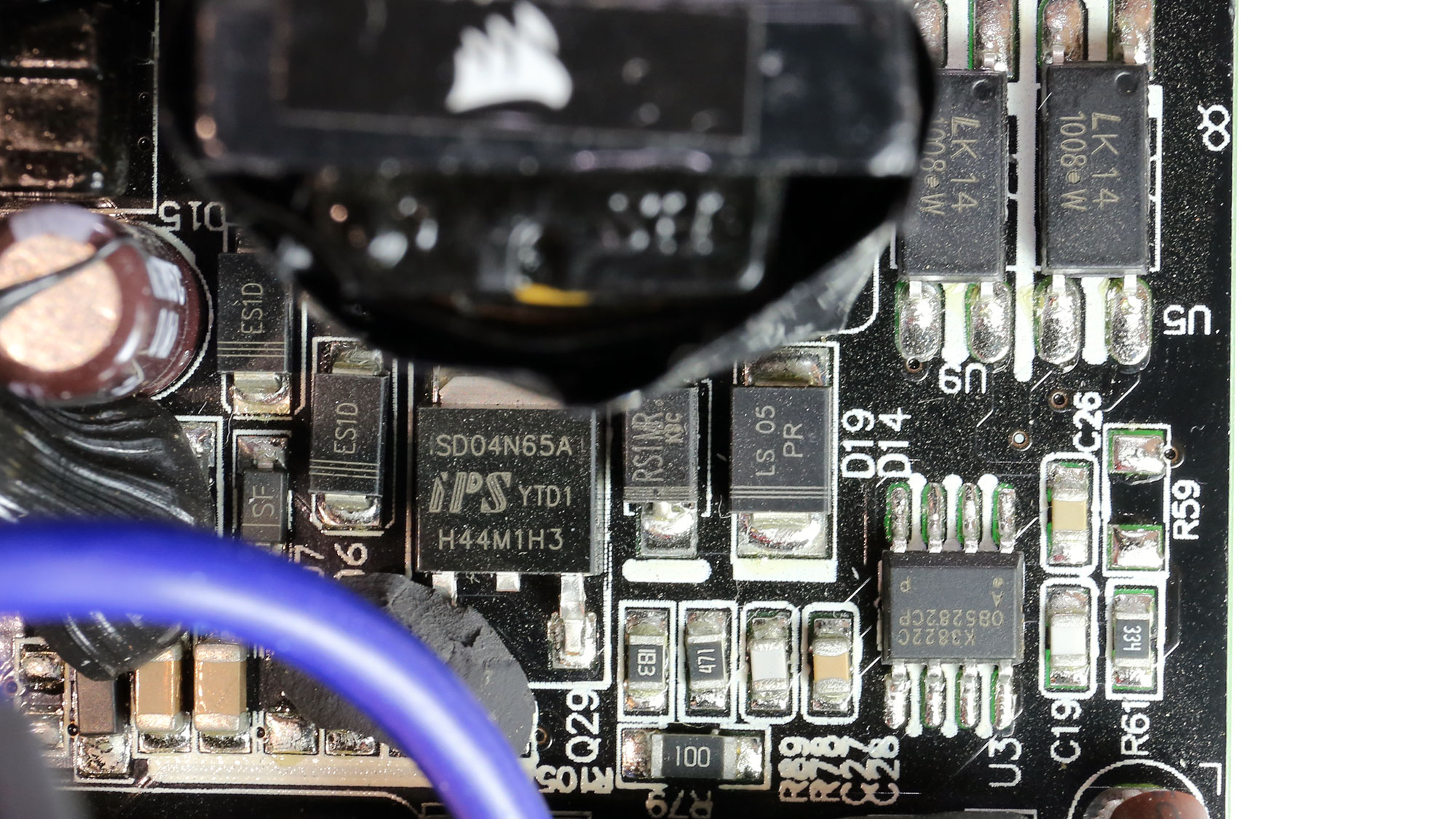
5VSB Circuit
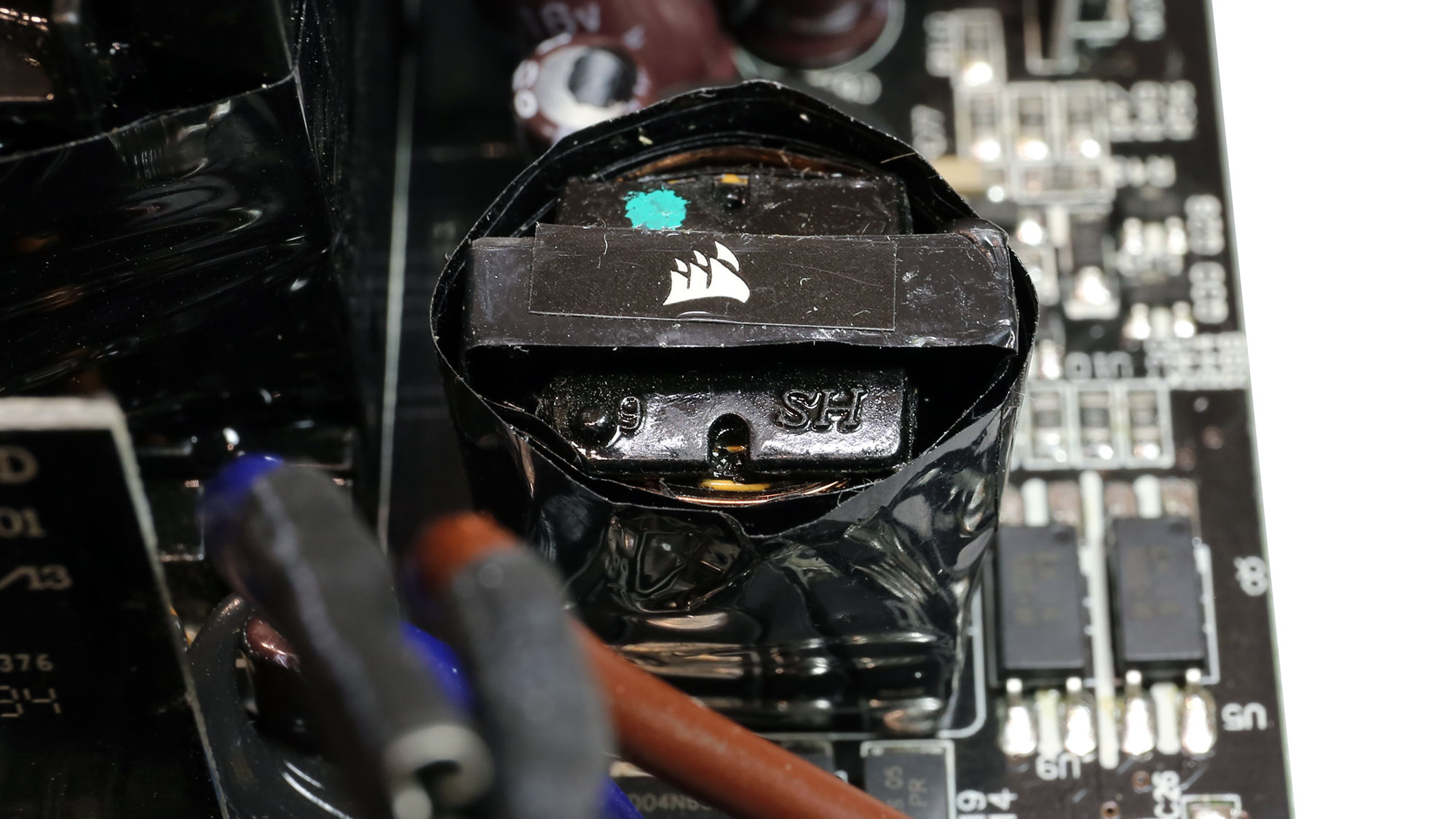
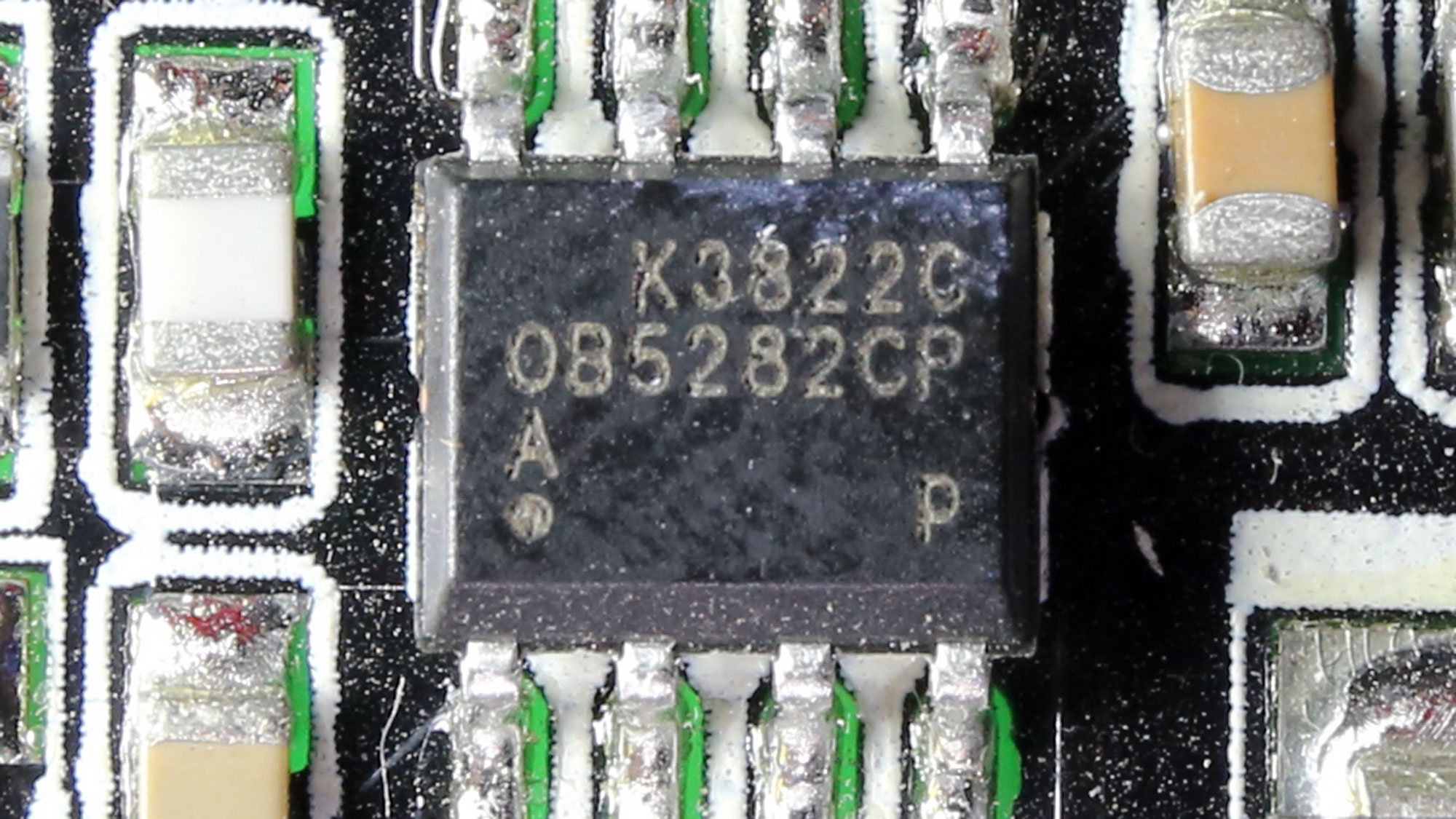
The 5VSB rail uses an SBR on its secondary side, and the standby PWM controller is an On-Bright OB5282 IC.
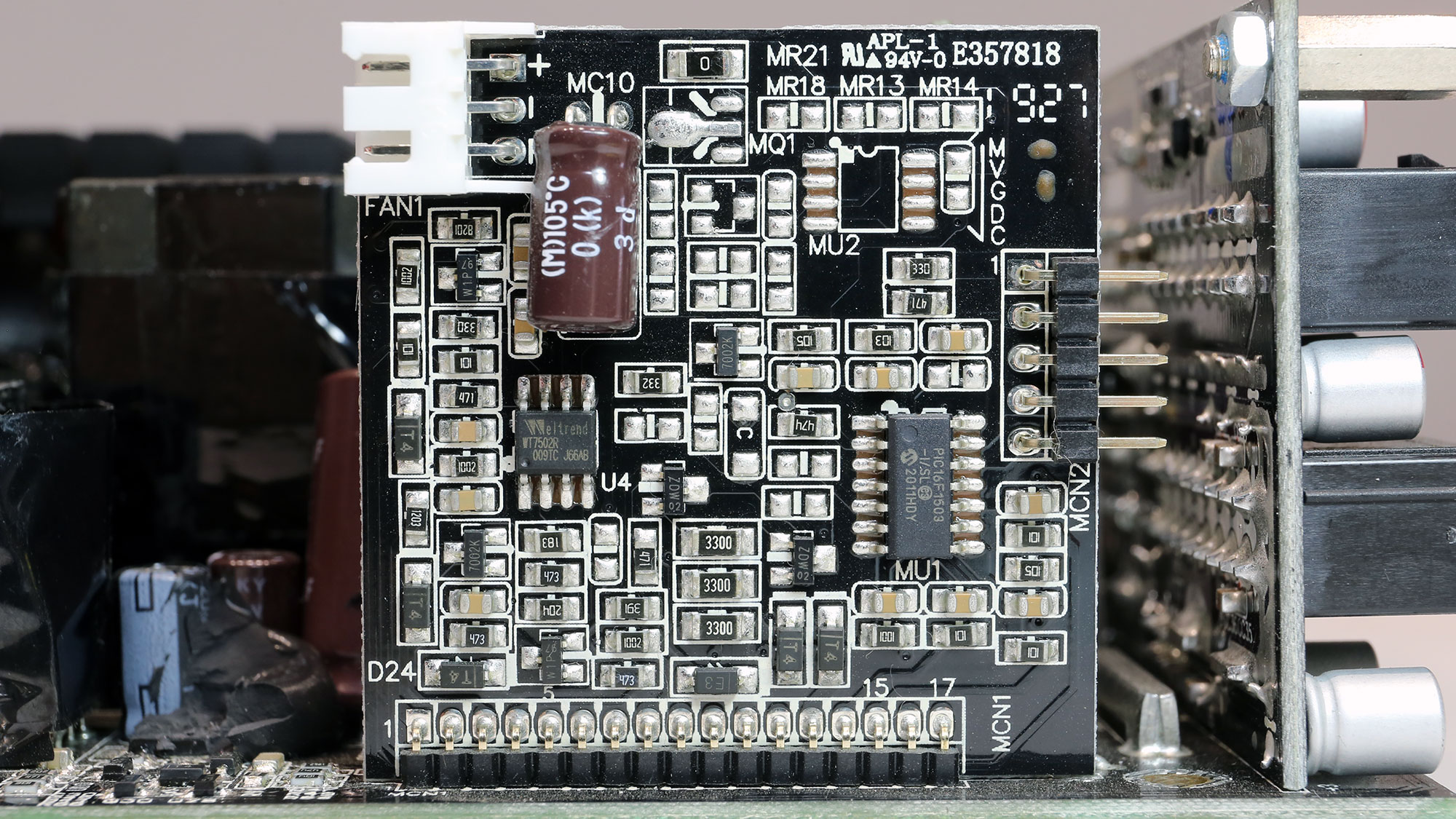
Supervisor IC Board
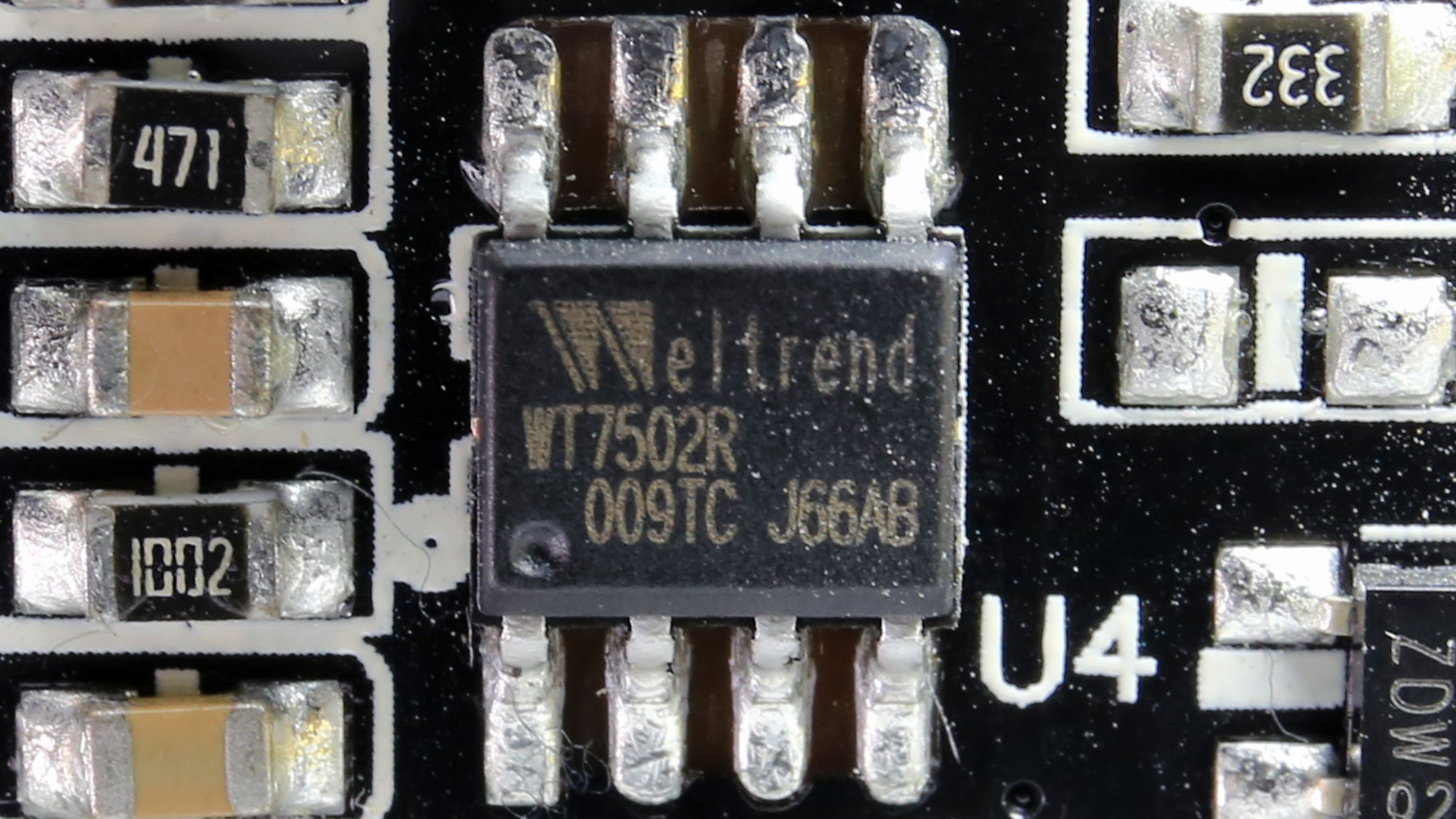
The Supervisor IC is a Weltrend WT7502R, supporting all basic protection features but OTP (Over Temperature Protection). The latter is implemented through another circuit.
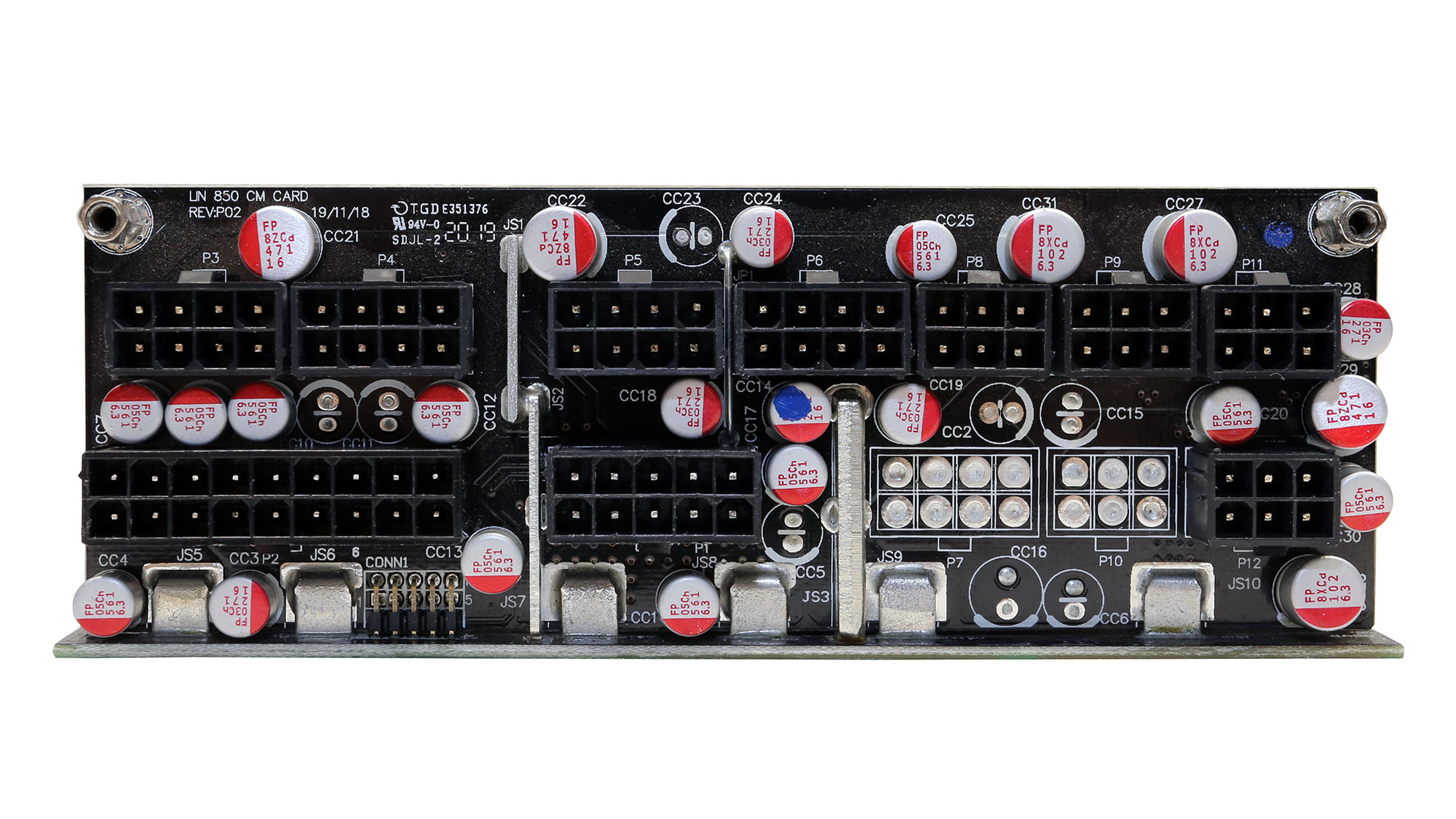
Modular Board
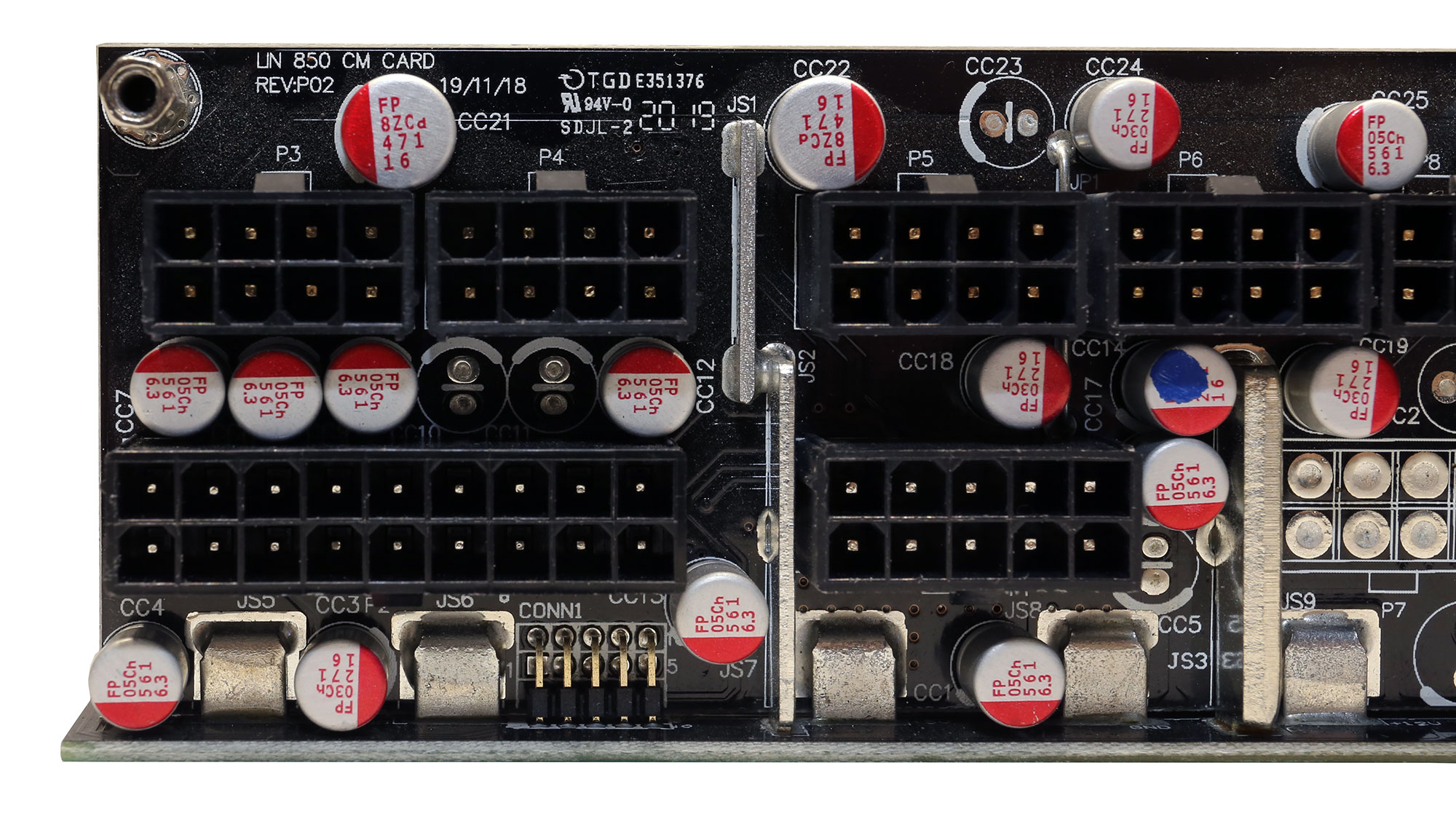
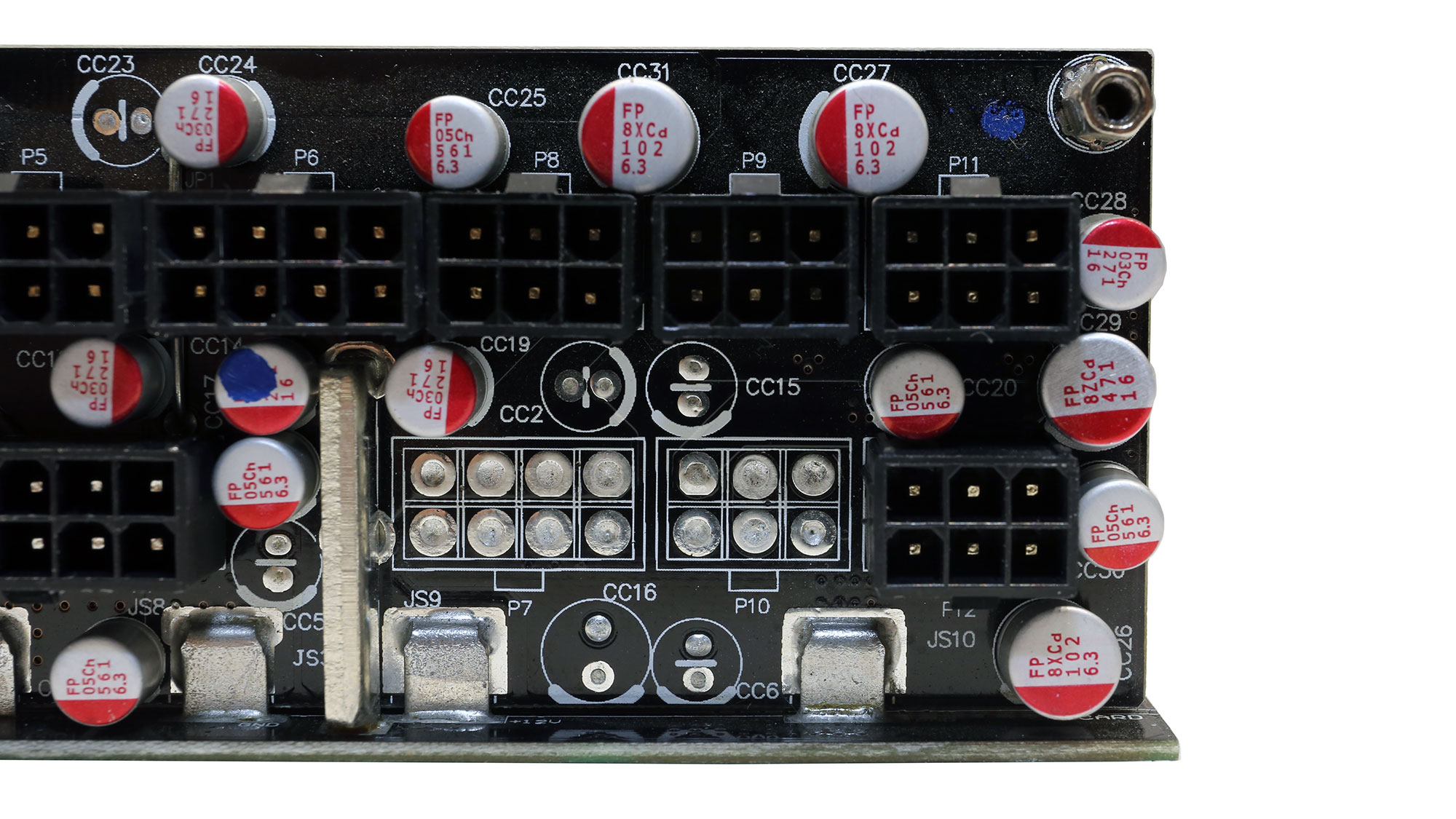
There are several bus bars on the modular board for power transfers with minimized energy losses. Many polymer caps are also installed on this area for lower ripple on all rails.
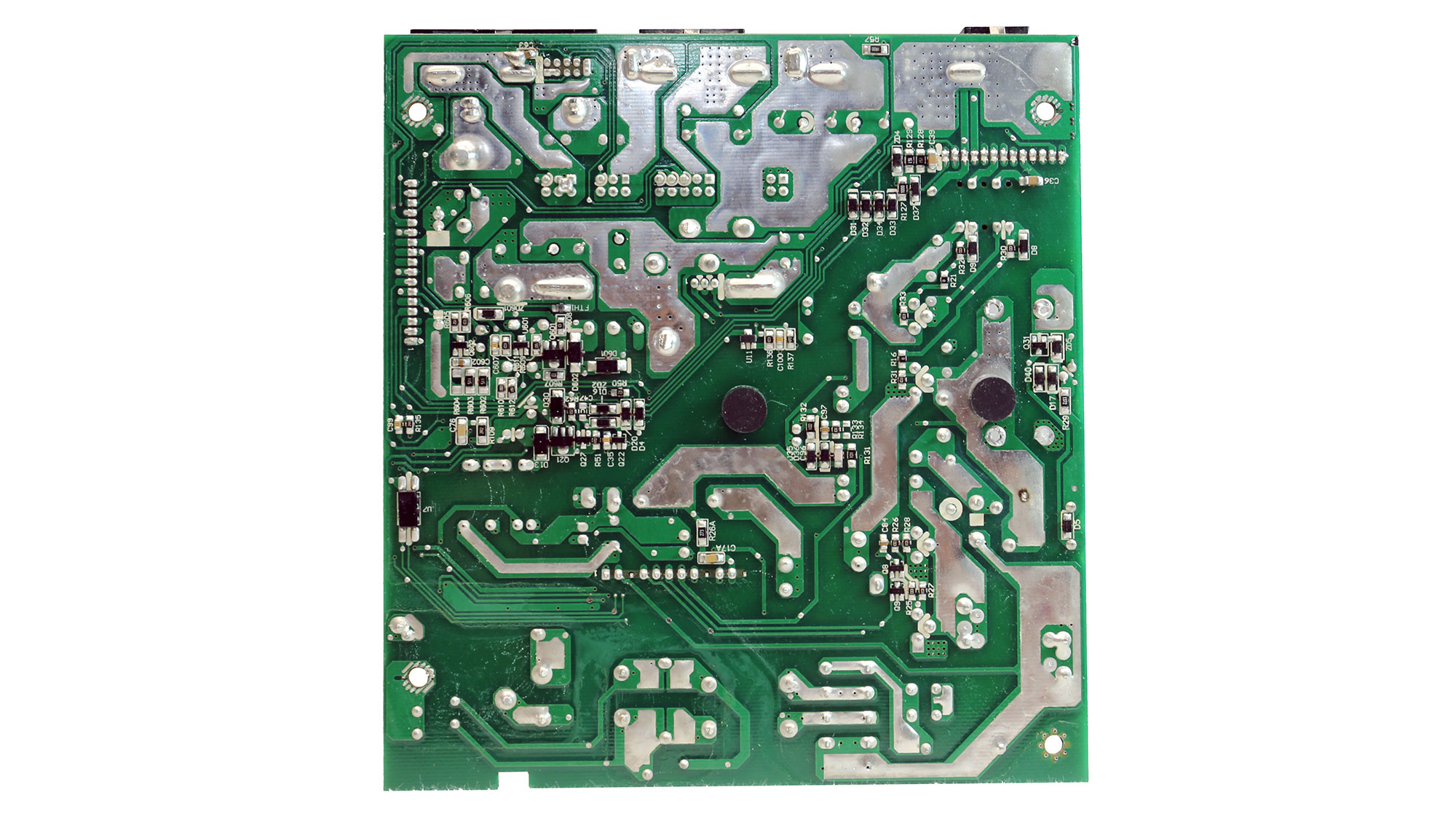
Soldering quality
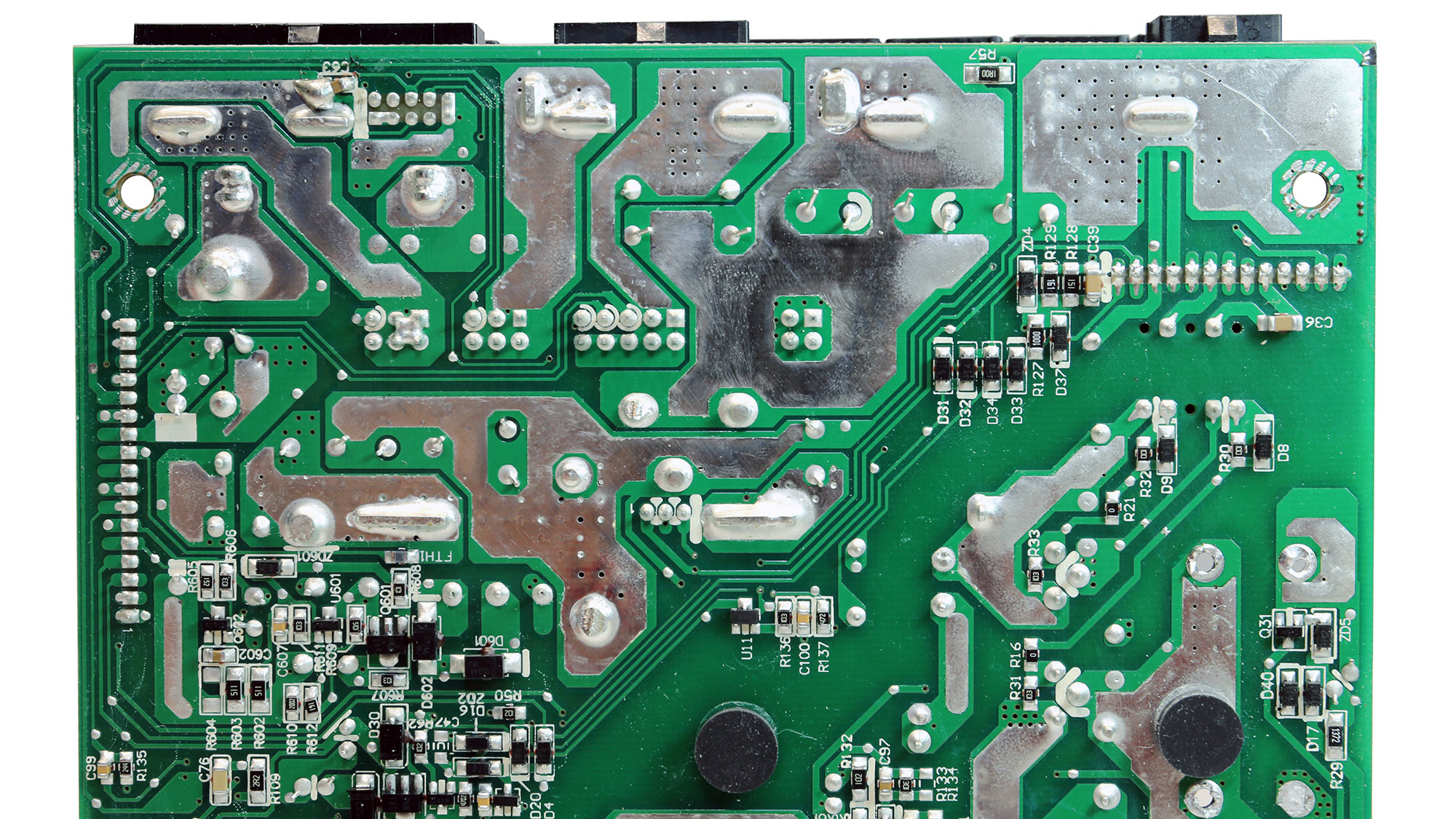
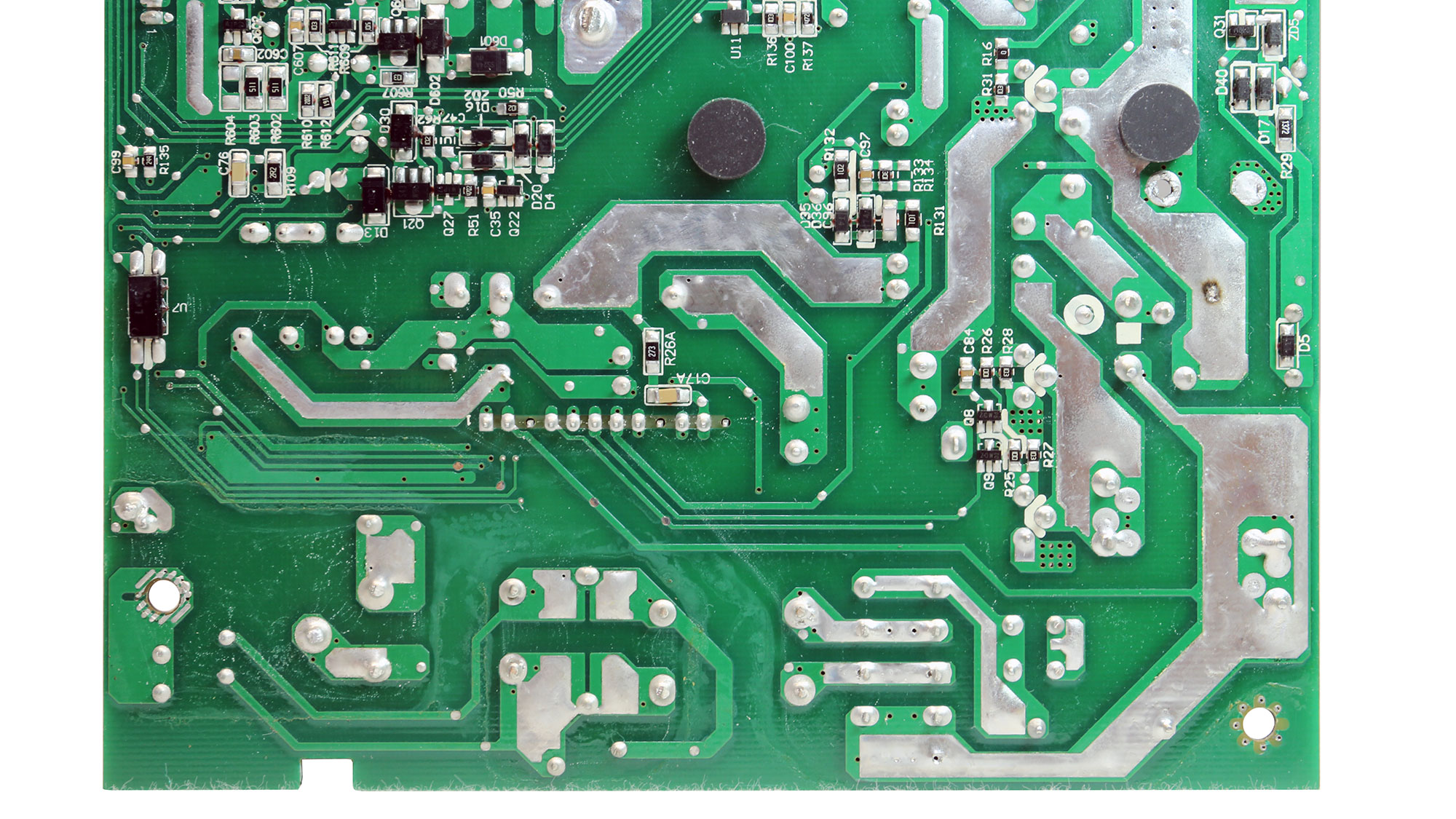
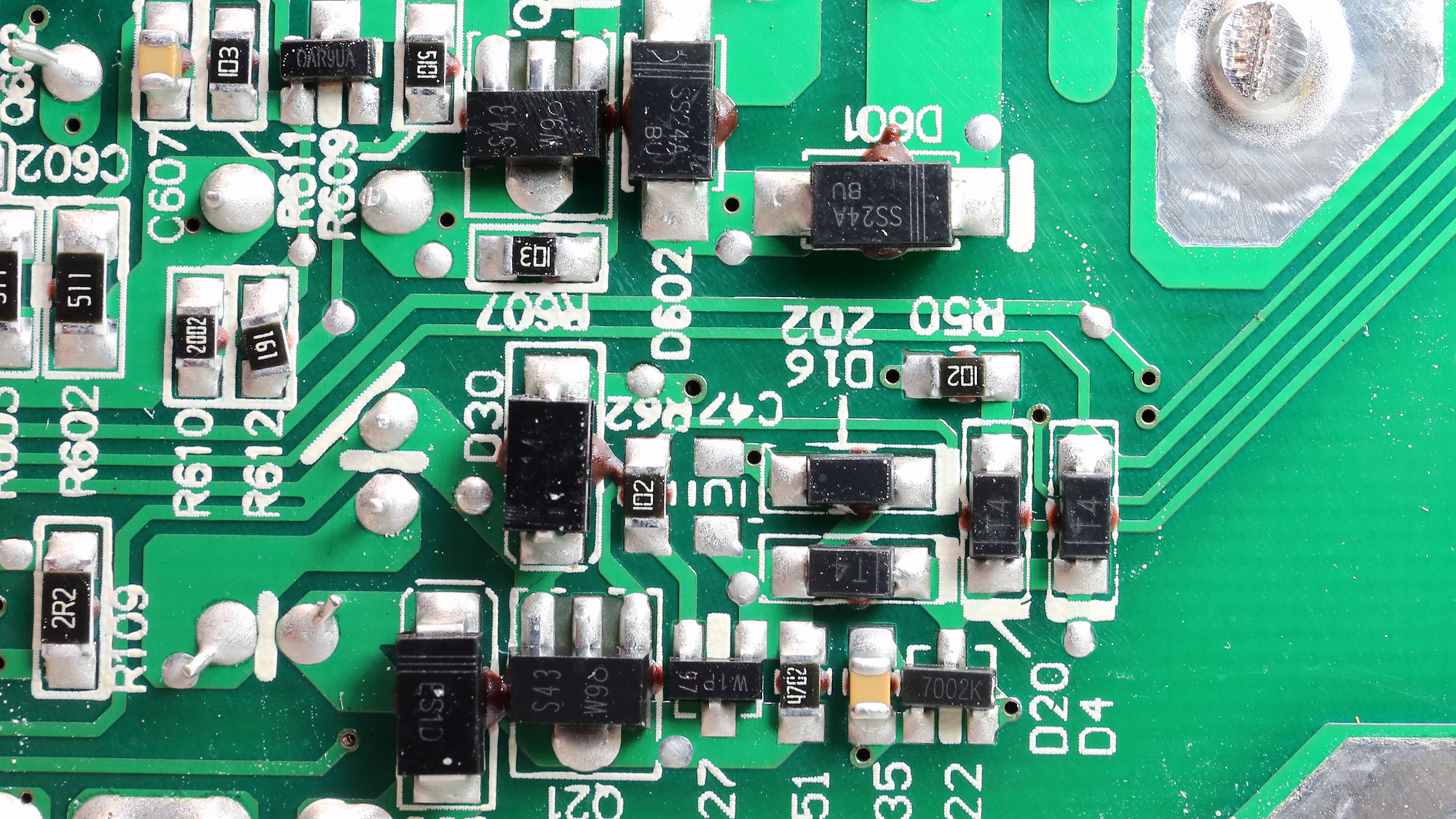
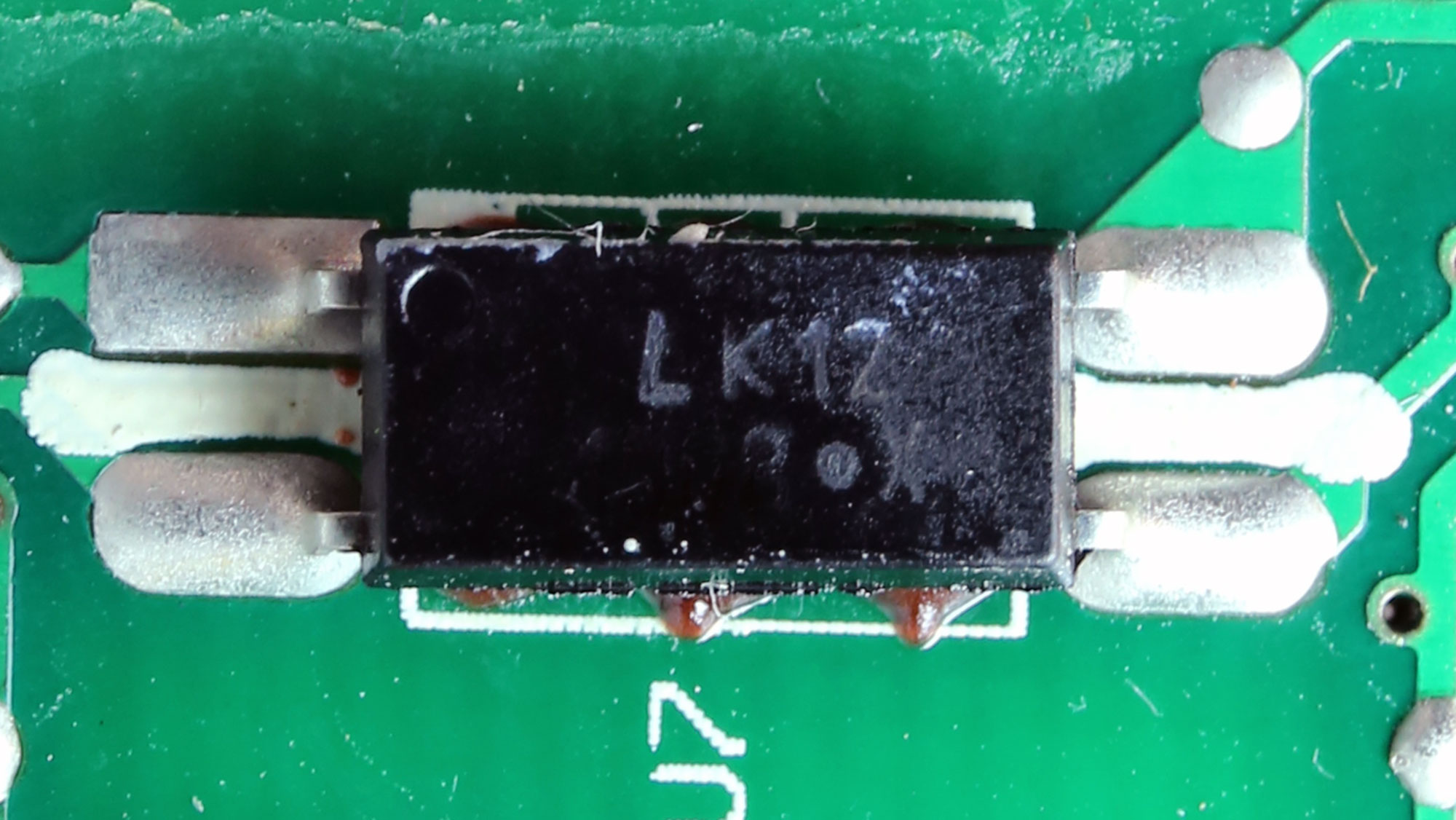
Soldering quality is satisfactory, but in some areas of the PCB's finish doesn't look so good.
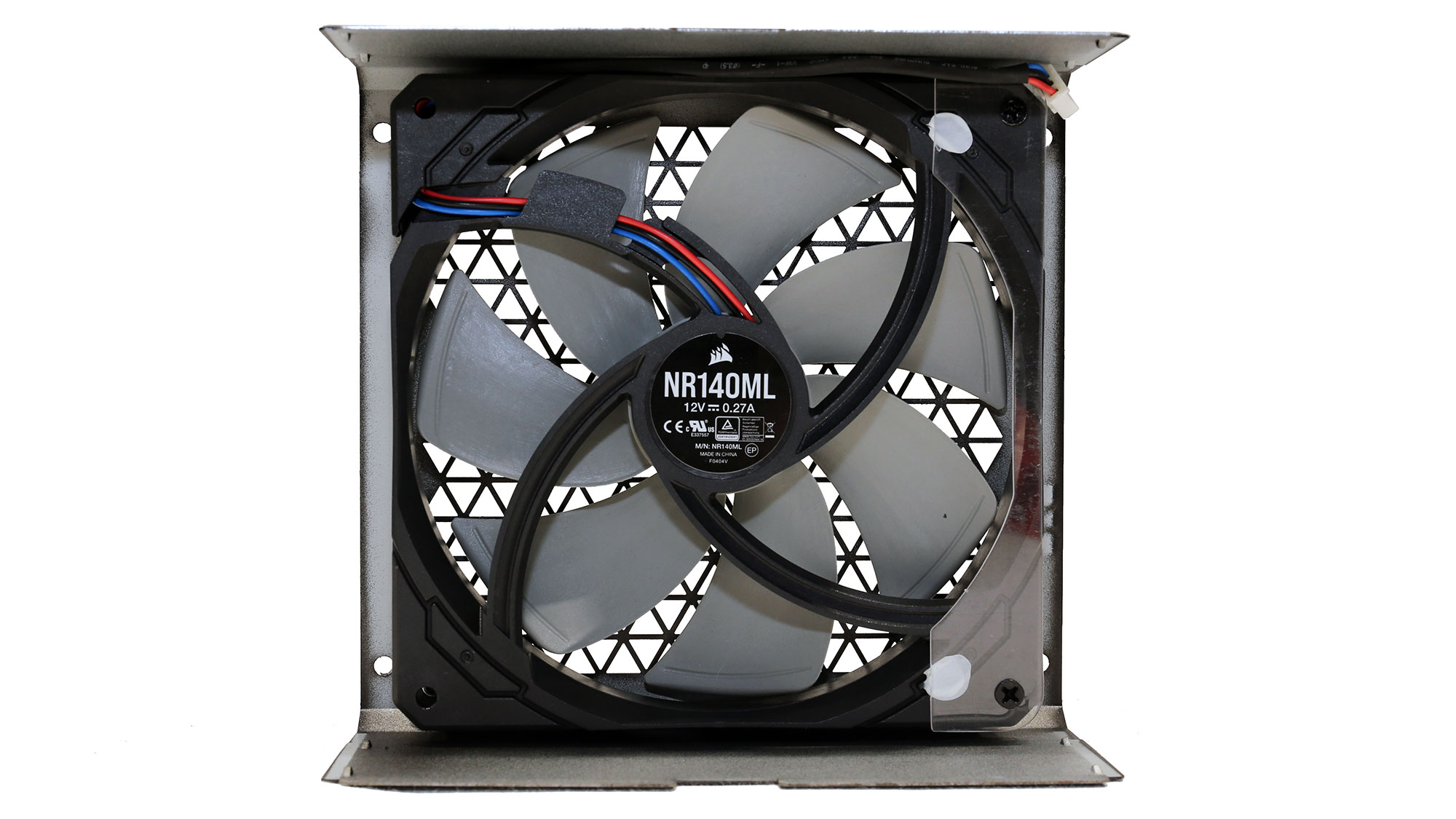
Cooling fan
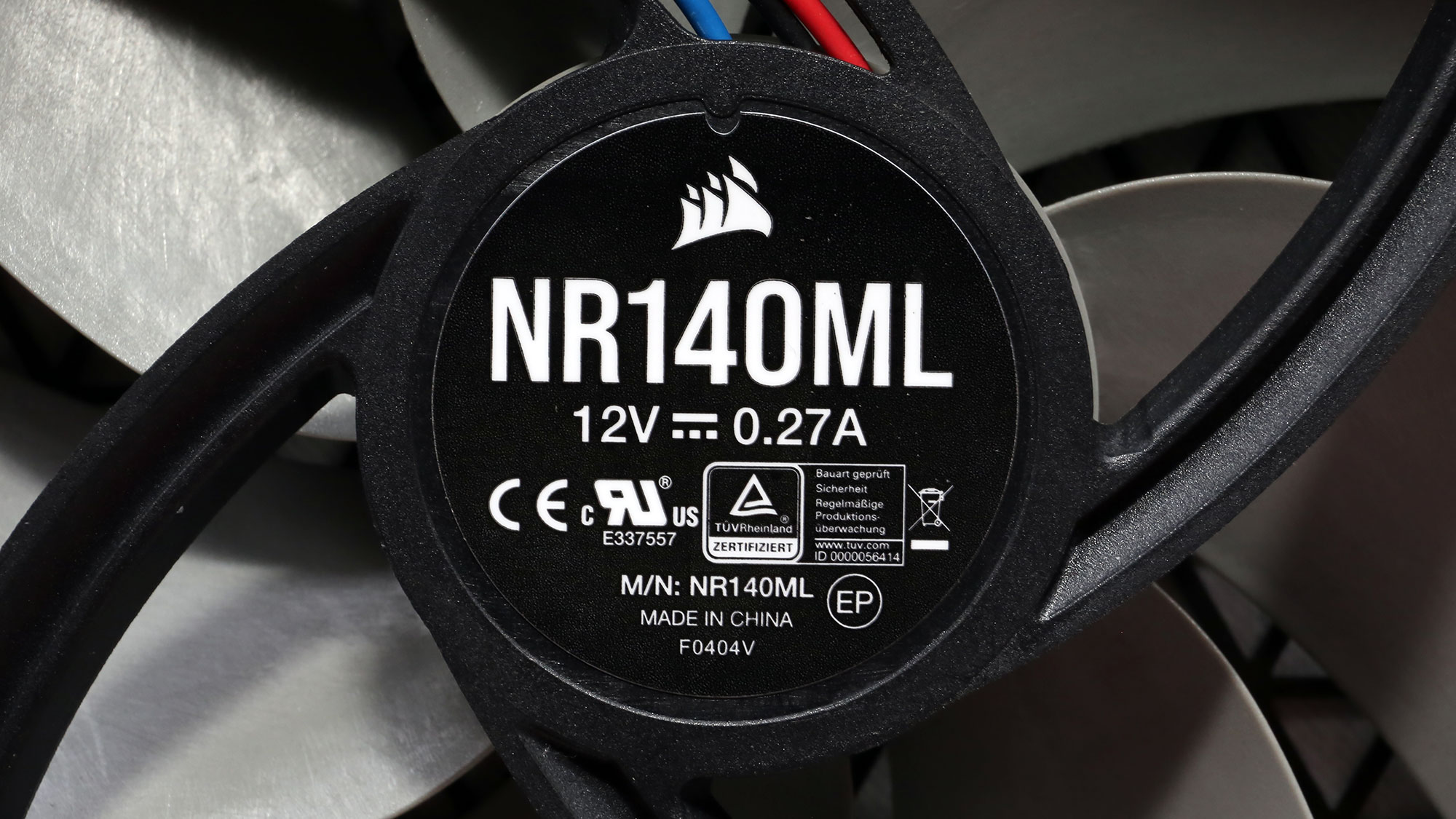
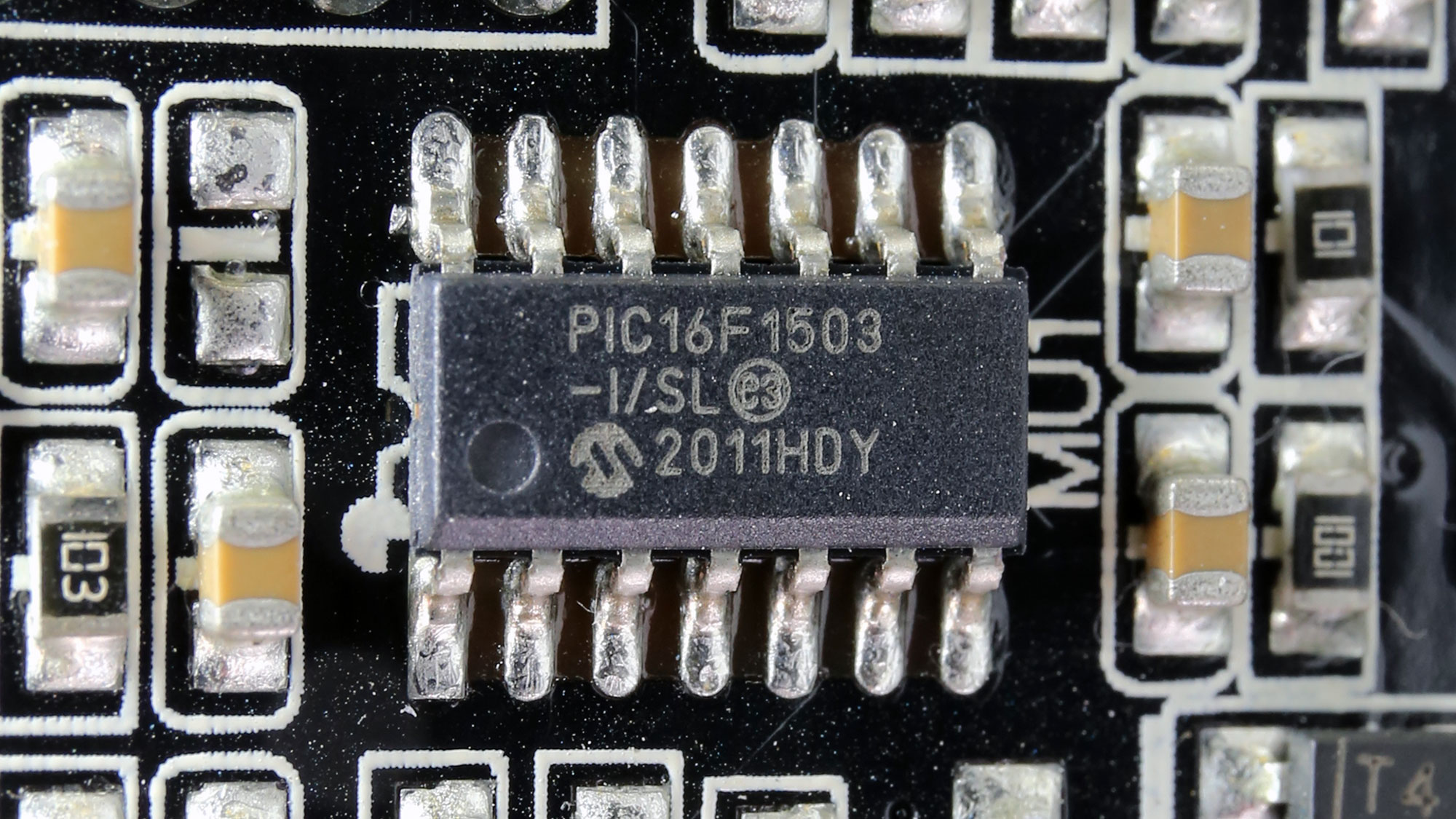
The major change between the previous and the new RMx generation is the Magnetic Bearing fan, able to withstand super-tough operating conditions without sweating.
MORE: Best Power Supplies
MORE: How We Test Power Supplies
MORE: All Power Supply Content
Current page: Specifications and Part Analysis
Next Page Load Regulation, Hold-Up Time, Inrush & Leakage Current, Efficiency and Noise
Aris Mpitziopoulos is a contributing editor at Tom's Hardware, covering PSUs.
-
RAZ0RLIGHT Is there any reason why the 2021 revisions fan curve is so much more aggressive?Reply
This would be the perfect Gold PSU if they would have implemented the same fan curve as the older 2018 revision. -
I Reply
Disagree. It's still very quiet and I'd rather a tiny noise increase to reduce temps, increase lifespan.RAZ0RLIGHT said:Is there any reason why the 2021 revisions fan curve is so much more aggressive?
This would be the perfect Gold PSU if they would have implemented the same fan curve as the older 2018 revision.
This is probably what Corsair determined as well through wear testing, decided that not only would that reduce their warranty fulfillment costs but also improve customer satisfaction by having a longer lasting product.
If you don't care about the warranty, crack it open, put a few tens of ohms 2W resistor in series on the fan power lead, or just swap in a lower RPM fan, or mod the fan control circuit, or wear earplugs, or put the system under your desk, or get a cat plus 100 mice let loose all at once and you'll never even notice the very slight fan noise.
Besides, it's all a bit silly. If your system is pulling that many amps it's going to need its own more audible fans running anyway. For good lifespan. An internal, reward-facing exhaust, oriented fan is the least audible way to pull or push air through a system. -
Russll HelloReply
A few days ago I bought a Corsair RM750x (2021). Now the power supply consumes little (20-30%) because it works without a video card (AMD 5700G only).
The Aida64 and OCCT show voltage on rail +12V - 11.884V, and on rail +3.3VCC - 3.248V, on rail +5V - 4.980V (computer idle, browser only).
In the game, the voltage rises and shows on rail + 12V - 11.980V (maximum), and on rail + 3.3VCC - 3.264V (maximum), on rail + 5V - 5.020V.
Is this normal at all.?
There is no full 12V on rail + 12V, and no full 3.3V on rail + 3.3V..
Maybe I should return the product to the store.?
-
drivinfast247 Reply
Perfectly normal operation.Russll said:Hello
A few days ago I bought a Corsair RM750x (2021). Now the power supply consumes little (20-30%) because it works without a video card (AMD 5700G only).
The Aida64 and OCCT show voltage on rail +12V - 11.884V, and on rail +3.3VCC - 3.248V, on rail +5V - 4.980V (computer idle, browser only).
In the game, the voltage rises and shows on rail + 12V - 11.980V (maximum), and on rail + 3.3VCC - 3.264V (maximum), on rail + 5V - 5.020V.
Is this normal at all.?
There is no full 12V on rail + 12V, and no full 3.3V on rail + 3.3V..
Maybe I should return the product to the store.?
-
stateofdade Just purchased one of these based on this review. Thanks for the information and the deep dive into this PSU.Reply -
NoxMorbis I can't believe they used in cable caps. Shoddy and ridiculous. I have the 2018 RMX and I HATE those inline crap caps. I also looked at the soldering and found flux still stuck to the joints. Shoddy soldering is apparent. Geeze, what a quality control step down. I just think in line caps are fudging, although In know most do it.Reply